

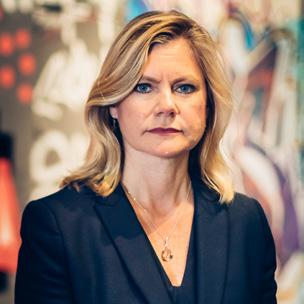



1 FIT FOR #05 RAISINGSTANDARDS CREATING OPPORTUNITIES TACKLING LONELINESS IN THE LGBTQ+ COMMUNITY TOGETHER TODAY THEPOWEROF EVENTSTO EMBED COMPANY PURPOSE RT HON ANNE MILTON THE NHS : A CELEBRATION AND AN OPPORTUNITY LORD WALNEY HOW DEFENCE COMPANIES CAN DELIVER SOCIAL VALUE ALONGSIDE SECURITY NICK FORBES CBE HOW LABOUR CAN TRANSLATE LOCAL SUCCESS INTO A NATIONAL VICTORY RT HON JUSTINE GREENING TUITION FEE RETHINK CAN DRIVE LEVELLING UP Driving access to opportunity with Sean Haley RRP £3.99 FFP-ISS05-2023 ACKNOWLEDGING UNIVERSITIES’ CONTRIBUTION TO SOCIAL MOBILITY CREATINGAMENOPAUSE FRIENDLYWORKPLACE

2 26 04 RAISING STANDARDS, CREATING OPPORTUNITIES with Justine Greening 06 THE POWER OF EVENTS with CA events 08 DEFENCE COMPANIES AND SOCIAL VALUE with Lord Walney 12 THE NHS - A CELEBRATION AND AN OPPORTUNITY with Rt Hon Anne Milton 16 THE CENTRE FOR INEQUALITY AND LEVELLING UP with Graeme Atherton 18 LEVEL UP THE LEVY with Justine Greening 20 OBESITY – MORE THAN JUST A HEALTH ISSUE with the Purpose Health and Social Care Coalition 22 KEIR STARMER’S FIVE MISSIONS with Lord Walney 24 CREATING OPPORTUNITIES FOR YOUNG PEOPLE with True Potential 26 TOGETHER TODAY with Justine Greening 28 WOMENS HEALTH IN THE WORKPLACE with Karen Quinn 30 TACKLING LONELINESS IN THE LGBTQ+ COMMUNITY with Together Today 31 THE RACE TO NET ZERO with the One Planet Pledge 32 DRIVING ACCESS TO OPPORTUNITY with Sean Haley from Sodexo 38 MONEY WITH MEANING with James Peirson from Virgin Money 44 THE COST OF LIVING TASKFORCE with Lord Walney 46 YOUNG PEOPLES VIEWS ON THE APPRENTICESHIP RATE with Co-op 48 THE DIFFERENCE COUNCILS CAN REALLY MAKE with Essex County Council 50 LEVELLING UP THROUGH COMMUNITY POWER with Warwickshire County Council 52 TACKLING CLIMATE CHANGE with Lord Walney 54 THE FALL IN LIFE EXPECTANCY with Rt Hon Anne Milton 56 LEVELLING UP HOSPITALITY with Travelodge
PLACE BASED SOLUTIONS WILL HELP END HOMELESSNESS with the Purpose Coalition CONTENTS Contents
58
60 THE HEWITT REVIEW with Rt Hon Anne Milton
62 THE LINK BETWEEN LOCAL HOUSING AND ECONOMIC STABILITY with Jack Savage
64 A RETHINK ON TUITION FEES with the Purpose Universities Coalition
66 MAY’S LOCAL ELECTIONS with Lord Walney
68 NHS: AT THE HEART OF IT with Wes Streeting MP
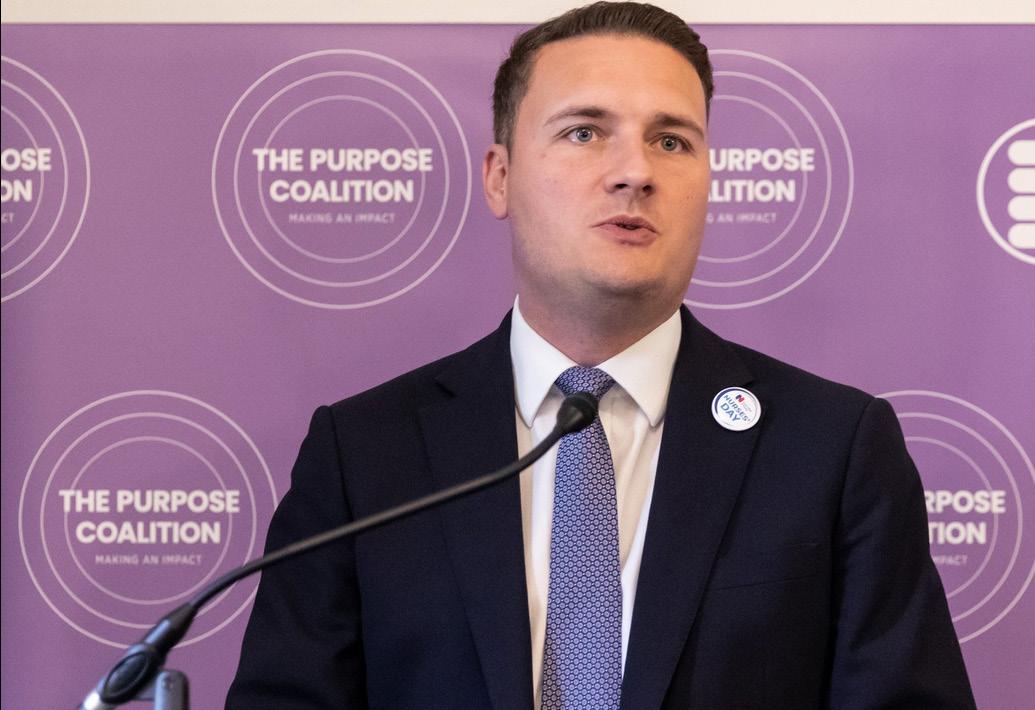
70 HOW LABOUR CAN TRANSLATE LOCAL SUCCESS INTO A NATIONAL VICTORY with Nick Forbes CBE
72 POLITICAL WINDS ARE CHANGING - HOW SHOULD PURPOSE LED BUSINESS RESPOND? with Matthew McPherson
74 LEVELLING UP CHESTER with University of Chester
76 BUILDING THE WORKFORCE THE NHS DESERVES with the Purpose Coalition
78 SETTING THE STANDARD ON SOCAL IMPACT with Ramsay Healthcare UK
80 APPLIED LEARNING ROUNDTABLE with Kevin Hollinrake MP
82 GROUNDBREAKING SOCIAL MOBILITY SURVEY LAUNCHED with University of West London
84 PEOPLE, PLANET, PLACES AND PARTNERS with Sodexo
86 FROM SOUTHAMPTON TO PARLIAMENT with University of Southampton
88 THE ROLE OF SME’S IN BOOSTING OPPORTUNITY with Bill Esterson MP
90 RAISING THE BAR ON COMMUNITY ENGAGMENT with Greene King
92 INTERNATIONAL WOMEN IN ENGERNEERING DAY with Southeastern Railway
94 ISSUES AROUND THE MENOPAUSE with Teleperformace
96 TARGETS HIT THE MARK FOR BOARDROOM REPRESENTATION with Pennon
98 BUILDING SOLUTIONS FOR SOCIAL CHANGE with Tarmac
101 DEEPDIVE INTO THE LABOUR MARKET with Lord Walney
102 DIVERSITY, CELEBRATIONS AND WELLBEING ACTIVITIES with Calderdale and Huddersfield NHS Foundation Trust
CONTENTS
68 Contents
Raising Standards, Creating Opportunitiesacknowledging universities’ contribution to social mobility
Universities play a crucial role in their local areas, outside their primary function of providing degree-level education for their students. The best, purpose-led universities also improve standards in schools and drive economic growth in their communities.
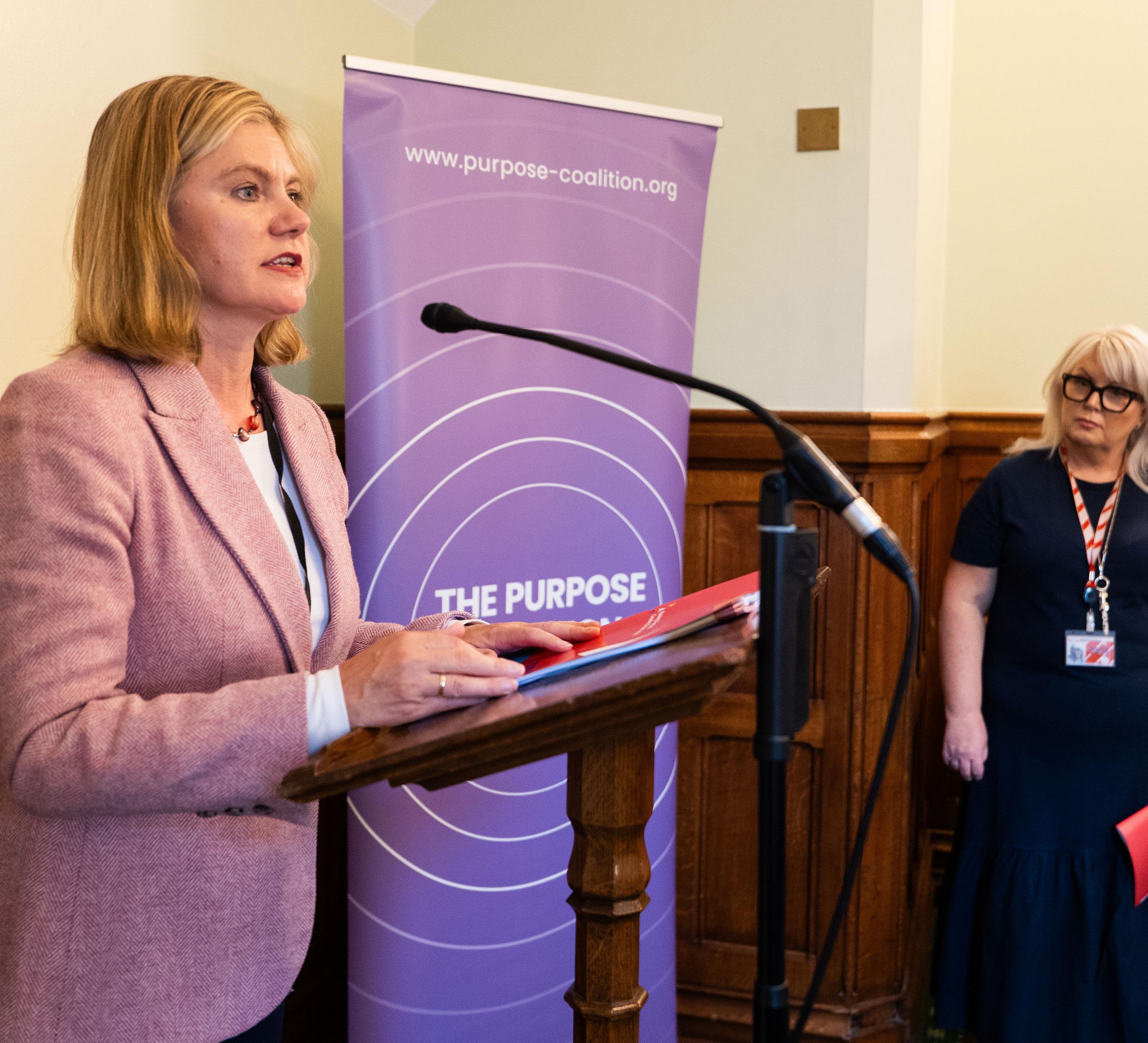
RT HON JUSTINE GREENING
4
The campaign I’ve recently launched with our Purpose Universities Coalition - Raising standards, creating opportunities – aims to highlight their work as anchor institutions, fulfilling those dual roles with their economic and social impact. Wherever you stand on the political spectrum, raising education standards and creating more opportunities are key priorities. It’s always been clear to me, especially during my time as Education Secretary, that higher education is integral to delivering these two key policy objectives. Members of the Coalition – universities such as Loughborough, Chester and Northampton – are already working hard to identify those furthest away from a level playing field and to ensure that they have access to the sort of opportunities that will make a difference to their lives.
The Government’s recent announcement that it will site 12 investment zones around university hubs is testament to the part they can play in the regeneration of some of our left behind communities and the strength of their partnerships with business and local government.
So the campaign will highlight the work that universities like York St John, Stirling and Cardiff Metropolitan are undertaking in schools, not just in the sixth form but in primary and pre-GCSE years, to reach out to young people who do not know anyone who has been to university and who have little idea of what life there is like. They can advise them on what they need to do to get there, what student life can offer them once they’re there and the range of opportunities that open up as a result of getting a degree. Crucially, many of their outreach teams are from similar backgrounds and will have been on the same journey. If young people can see and hear people like them, they are more likely to believe that it’s a journey they can also make.
The second focus of the campaign will be on the vital work that Purpose Coalition universities like Northumbria and Solent are doing to drive economic growth in their local areas. Having worked downstream to encourage young people to consider studying STEM subjects, they are able to connect local businesses up with graduates who have the skills that employers need for the new green and high tech jobs which will be essential for our labour market and which attract crucial investment into regions across the country. Their world-class research departments contribute to groundbreaking projects, especially in science and
technology, and are helping to find solutions to some of the world’s most fundamental problems. The universities themselves are huge local employers, recruiting staff at every level. They also offer a wealth of business opportunities for big and small companies in their supply chains.
As part of the campaign, we’ll also be working with our student ambassadors from across the Coalition, from universities including Bolton, Staffordshire and Southampton, to shape our new recruitment platform that puts purpose and social mobility at its heart. The platform we have created together, FindMyPurpose, will match students to organisations whose values align with theirs. By selecting the Purpose Goals that matter most to them – Goal 5 Open recruitment or Goal 8 Good health and wellbeing for example - they can quickly identify the employers whose priorities are the same.
In the months ahead, we’ll be producing a ‘Best in Class’ report which will highlight those Coalition universities that are going the extra mile in delivering opportunity to their communities and beyond. The campaign will also feature a series of events for current and future policymakers demonstrating how Purpose Universities Coalition members are raising standards and driving economic growth in the areas they serve, as well as highlighting specific key policy objectives.
Over the last few years, we have partnered with many universities to assess how effectively they are driving social mobility, and developed plans to help them go even further. I’ve seen first-hand the hugely positive impact that universities like Derby, Worcester, Newcastle and Greenwich have made in their local regions in terms of improving school standards and driving economic growth. They promote aspiration so that young people from every background can make positive, wellinformed choices that will help their life chances. The partnerships they have forged with local stakeholders and their understanding of the communities in which they operate means that they can successfully engage to extend opportunity where it is needed most. That approach is key to levelling up, particularly in our most disadvantaged areas, and they will play an integral part in boosting the country’s growth and productivity.
More information about the campaign can be found at raisingstandardscreatingopportunities.org
5
RT HON JUSTINE GREENING
More and more organisations are recognising the power of events. Is yours missing out?
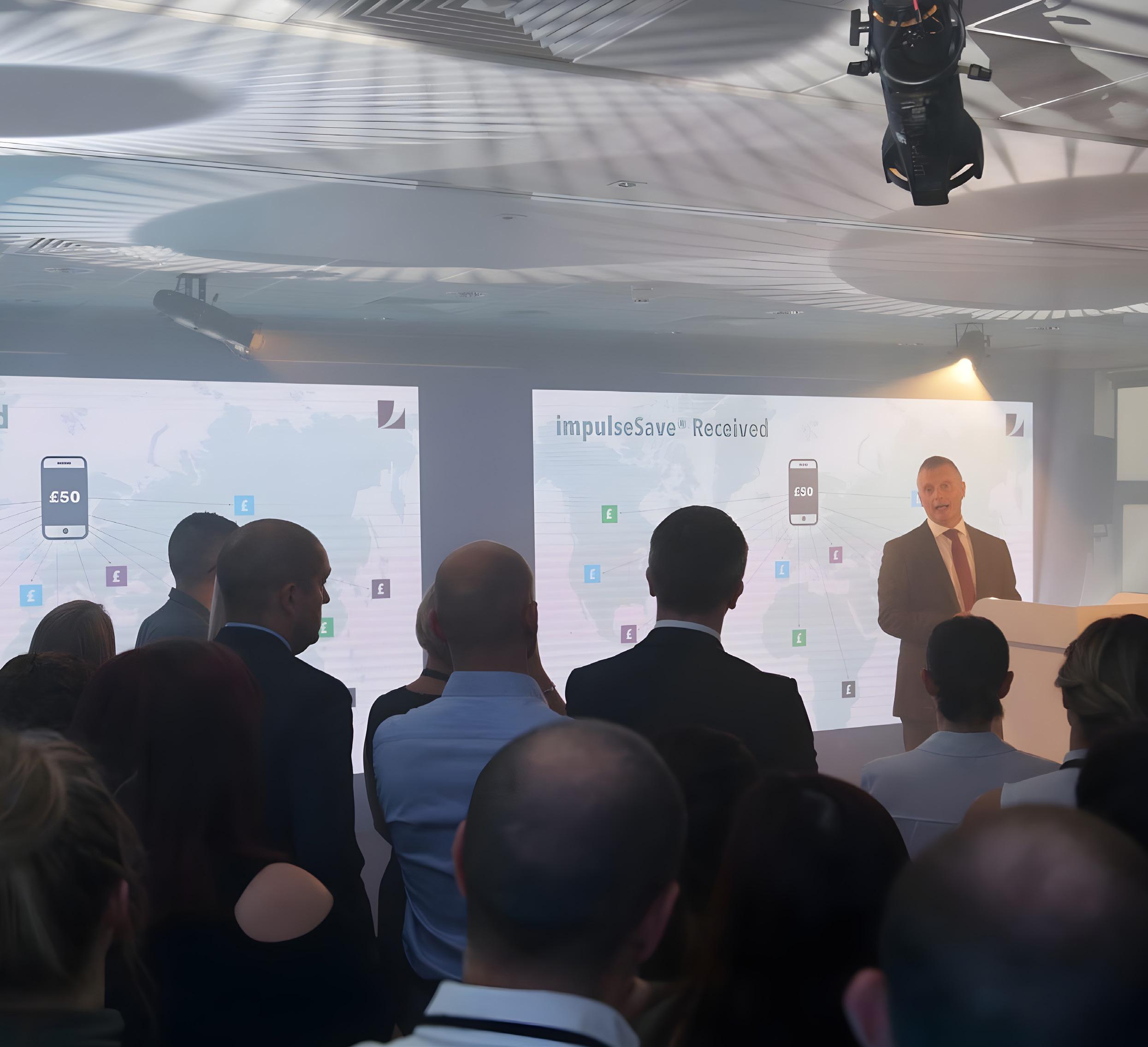
IN TODAY’S FAST-PACED BUSINESS LANDSCAPE, COMPANIES ARE CONSTANTLY SEEKING INNOVATIVE WAYS TO MAKE A SPLASH. IS IT ANY WONDER, THEREFORE, THAT ORGANISATIONS ARE INCREASINGLY TURNING TO HOSTING EVENTS? THIS HIGHLY EFFECTIVE AVENUE CAN HELP COMPANIES DEMONSTRATE MEANINGFUL IMPACT, ALIGN WITH THEIR PURPOSE, AND CONNECT WITH THEIR STAKEHOLDERS.
But why an event? The answer lies in the particular benefits they offer. First and foremost, events provide a unique platform for companies to communicate their values, mission, and vision to a broad audience. Whether it’s a gala dinner, an awards ceremony, or a conference, these events create a stage for organisations to showcase their commitment to making a positive difference. Whatever style of event you choose, the key messages will be firmly cemented in the mind of attendees. And by aligning your event with your company’s purpose, you can inspire your audience, motivate your teams, and enhance your reputation as a purpose-led organisation.
6
CA: EVENTS
SPONSORED
CONTENT
Purpose-driven events offer a valuable opportunity for networking and fostering meaningful connections. Bringing together industry leaders, decision-makers, and stakeholders in a focused setting creates an environment conducive to collaboration, knowledge exchange, and partnership-building. Whether it’s a roundtable discussion, a summit meeting, or a panel event, these gatherings provide a platform for thoughtprovoking discussions, idea sharing, and the formation of strategic alliances. By hosting such events, you position your company as a hub of expertise, thought leadership, and innovation, driving your industry forward.
Events are also an excellent way to celebrate achievements and milestones. Whether you’re launching a report, introducing a new product, or rewarding employees and celebrating your workforce, events provide a powerful means to generate excitement, engage your target audience, and create a lasting impression. By crafting a well-executed event experience that aligns with your purpose, you can generate industry-wide recognition, enhance your company’s standing, and reinforce your brand’s unique position in the market.
But organising a successful event is no easy feat. It requires meticulous planning, flawless execution, and a deep understanding of the event’s objectives. That’s where partnering with an experienced events management company like CA Events becomes invaluable. With our expertise and purpose-driven approach, we can transform your vision into a reality that exceeds expectations. Our team of professionals brings strategic thinking, attention to detail, and a passion for purpose to every event we manage.
When you choose CA Events as your partner, you gain access to our vast experience in organising high-profile events for discerning clients across various sectors. Having worked with C-suite executives for FTSE-100 companies, Secretaries of State, and university Vice-Chancellors, we understand the importance of aligning every aspect of the event with your purpose, ensuring that your message resonates with your target audience. From strategic planning to seamless execution, we take care of all the logistics, allowing you to focus on engaging with your guests and achieving your event’s goals.
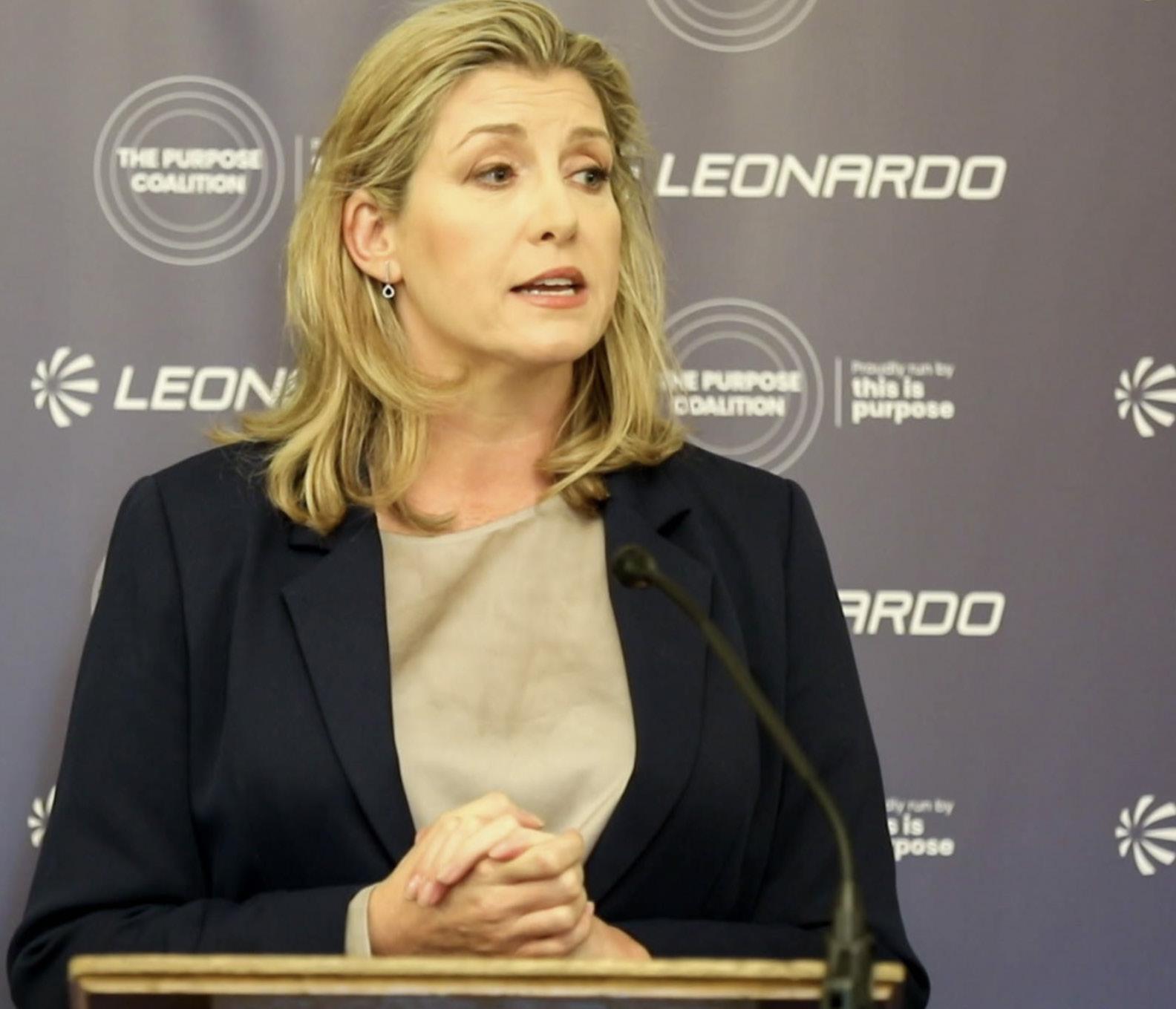
By entrusting your event to CA Events, you can enjoy peace of mind knowing that every detail is being taken care of. Our team’s commitment to excellence, meticulous attention to detail, and unwavering dedication to your success ensure that your event leaves a lasting impact on your attendees and stakeholders. We pride ourselves on our ability to create extraordinary event experiences that elevate your brand, inspire change, and deliver tangible results.
Hosting events - especially ones driven by your company purpose - offers you a powerful platform to communicate your purpose, inspire change, foster connections, and elevate your brand. By partnering with an experienced events management company like CA Events, you can ensure the success of your event and maximise its impact. Let us be your strategic partner in creating extraordinary event experiences that align with your purpose, engage your audience, and drive meaningful outcomes.
Unlock the power of purpose-driven events with CA Events and embark on a transformative journey that leaves a lasting impact on your organisation and stakeholders. Contact us today to start planning your next purpose-driven event.
7
Whether it’s a roundtable discussion, a summit meeting, or a panel event, these gatherings provide a platform for thoughtprovoking discussions, idea sharing, and the formation of strategic alliances
“
CA: EVENTS SPONSORED CONTENT

LORD WALNEY 8
Why defence companies can deliver social value alongside security
SINCE THE INVASION OF UKRAINE OVER A YEAR AGO, THERE HAS BEEN AN INCREASED FOCUS ON DEFENCE CAPABILITIES AND DEFENCE SPENDING. THAT CONFLICT, AND CONTINUING AGGRESSION AND DISPLAYS OF MILITARY MIGHT FROM RUSSIA AND CHINA, HAVE PROMPTED A RETHINK OF OUR DEFENCE SECTOR - HOW EFFECTIVE IS IT IN MAINTAINING OUR NATIONAL AND INTERNATIONAL SAFETY AND SECURITY AND WHAT PART CAN IT PLAY IN SHAPING A TECHNOLOGICALLY COMPETITIVE FUTURE?
Since the invasion of Ukraine over a year ago, there has been an increased focus on defence capabilities and defence spending. That conflict, and continuing aggression and displays of military might from Russia and China, have prompted a rethink of our defence sector - how effective is it in maintaining our national and international safety and security and what part can it play in shaping a technologically competitive future?
Despite the tight fiscal climate - and the economic challenges relating to any public spending decisions - a commitment in June 2022 by the then Prime Minister, Boris Johnson, to raise defence spending to 2.5 per cent of its GDP by the end of the decade stands out. In 2021, the UK spent 2.2 per cent of its GDP on defence. It’s decreased markedly since 1956 when it was just under 8 per cent, and even 1980 when it was 4.1 per cent. This month, the Prime Minister confirmed that the UK would increase defence spending by £5bn over the next two years and launched a review to ensure that the UK can respond to aggression effectively while also protecting our economy and competing at the cutting edge of technology. The ramping up of defence spending, alongside a bolder rhetoric on facing up to existing and would-be aggressors, highlights a step change in attitude.
Last year, I wrote about how the war in Ukraine would prompt a fundamental rethink on what it meant to be a responsible business. The conflict created a moral urgency to do the right thing
and many moved quickly to give up Russian partnerships and investments. Those who weren’t so quick risked the wrath of their customers and investors and, in the end, their reputations. The best CEOs also considered how they could be part of a broader moral order that would do business only with those who abided by the rule of law with a respect for international stability. The acceptance that the defence sector has a valuable role to play in social value has been reflected in the business world where previously many investors and financial institutions had shunned the defence sector to avoid controversy about involvement in the arms trade. That is changing as business leaders recognise that ESG and the social impact that their organisations deliver can also extend to defence companies and the security, technological advances and high skill jobs that they can bring. Leading Purpose Coalition member Leonardo is a striking example of this, as our analysis of the company’s impact shows.
9
LORD WALNEY
Business leaders recognise that ESG and the social impact that their organisations deliver can also extend to defence companies
“
In addition to the headline announcement that defence spending will rise as a proportion of GDP, the Prime Minister, alongside the leaders of the US and Australia, also announced that the first generation of AUKUS nuclear submarines will be built in the UK and Australia. Based on the UK’s world-leading design, they will be the largest, most advanced and most powerful attack submarines ever operated by the Royal Navy. The agreement cements a decades-long partnership in our nations that could be of similar significance to the 1958 nuclear cooperation treaty between the UK and USA. Construction will see huge investment in high tech jobs in every corner of the UK, beyond the already considerable investment in the Dreadnought and Astute submarine programmes.
As a former MP for Barrow, the site of the shipyard where submarine construction comes together in the UK, I know just how much of a difference that this can make to the communities there that have often felt left behind as traditional industries have closed.
This has major potential to tackle regional inequality and drive levelling up. The Purpose Business Coalition is proud to be working with Rolls-Royce Submarines who will be providing high level technology .and expertise for the AUKUS project, bringing thousands more well-paid jobs to Derby where the engineering firm is based.

Rolls-Royce, and engineering and IT consultancies like Alten, another Purpose Coalition member, will be focused on attracting and retaining talent from the communities they serve to fill the thousands of vacancies that this major expansion will demand. Providing the right training in skills that are transferable will support thousands of opportunities for people in their businesses and their supply chains, and bring a wider economic prosperity to the areas in which they are located. Stepping up will be a major industrial challenge, but it’s a great problem for UK Plc to have, and the pay-off will be people who are equipped with the right digital and green skills needed for a competitive, twentyfirst century workforce.
The uncertainty of current geopolitics means that we are living in a more dangerous world but the pandemic and cost of living crisis have both shown how the most purposeful and resourceful organisations can take the challenges they face and turn them into opportunities. I am looking forward to working with the defence companies in the Purpose Coalition at this crucial time to help shape the way they can make a positive impact on their colleagues, their customers and their communities while playing a vital role in keeping us safe.
10
“ LORD WALNEY

The best CEOs also considered how they could be part of a broader moral order LORD WALNEY 11
“
The NHS - a celebration and an opportunity

THE NHS TURNED 75 YEARS OLD THIS SUMMER AND WE SHOULD TAKE A MOMENT TO THINK OF ALL THOSE WHO HAVE WORKED IN IT IN THE PAST, AND THOSE THAT STILL WORK THERE TODAY. IN 1948 WHEN IT WAS FOUNDED, IT WAS THE FIRST UNIVERSAL HEALTH SYSTEM TO BE AVAILABLE TO EVERYONE, FREE AT THE POINT OF DELIVERY – A REMARKABLE ACHIEVEMENT. IT TREATS OVER A MILLION PEOPLE A DAY IN ENGLAND AND TOUCHES ALL OUR LIVES. IT IS WHAT MANY PEOPLE SAY MAKES THEM MOST PROUD TO BE BRITISH.
On a personal level, I spent 25 years working in the NHS, training at Barts Hospital and then working as a hospital and community nurse, working in respiratory research, working with a palliative care team and latterly with social housing providers. It was a real honour to be part of this fantastic organisation, alongside brilliant medical and nonmedical healthcare staff. I learned a lot about the impact that high quality healthcare can have, not only on individuals but on families and their wider communities.
Fast forward to 2023 and there’s no doubt that the NHS is under enormous pressure - a combination of rising demand; an ageing population with more people living with more long-term health conditions; constrained capacity as a result of staffing shortages; and ever increasing public expectations of what healthcare can do. With the arrival of Covid in early 2020, what were once seen as winter pressures turned into all-year-round pressures for community services and hospitals across the country. This was felt especially in areas where increasing health inequalities place additional burdens on provision.
The impact is being felt not just in those services which have intermittently struggled to meet demand in the past but now in every area of the NHS. This is alongside a challenged social care system and a cost-of-living crisis which has affected both staff and patients. Many people are finding it difficult to see a GP, get the care in the community that they need, get an ambulance to go to A&E or to start treatment. This often results in slower access to diagnostic help and people get sicker in the meantime. The growing suffering from often unseen poor mental health is also taking its toll on people’s lives and work.
12 RT HON ANNE MILTON
With the NHS one of the Prime Minister’s five key priorities, the Government has responded with its long-awaited NHS Long-term Workforce Plan, a 15-year plan with three key principles - train, retain and reform. It promises to double the number of medical training places by 2031, train over 24,000 more nurses and midwives a year and increase the number of GP training places by 50%. The Plan aims to keep up to 130,000 more staff over the next 15 years by modernising the pension scheme so staff can partially retire or return to work more easily but also by improving culture, leadership and wellbeing, giving staff more flexibility and investing in their professional development. Finally, the aim is to reform the NHS by taking advantage of the opportunities that new technologies like AI can offer, using technology so patients can recover at home. Additionally, expanding new roles offering a chance to progress, introducing more degree apprenticeships and recruiting staff from a far wider background aims to solve some of the workforce shortages.
These ambitions are welcome - and reassuringly practical - but it will be some time ahead when we can judge any outcomes. In the meantime, in our own work at the Purpose Health and Social Care Coalition, many of our NHS Hospital Trusts and social care partners are already exploring ways of tackling the recruitment crisis by attracting and retaining staff from their own communities, and by tailoring the service they provide to their particular communities. We have seen some fantastic leadership with teams committed to finding solutions to the challenges they’re facing. We have launched an advocacy campaign that aims to highlight that work, with a series of case studies that feature great examples of individual staff journeys within those organisations, including from Barts NHS Foundation Trust where I started my own NHS journey.
Our Health and Social Care partners also know that there is another crucial element to addressing the problems the NHS is currently facing, and one that looms large for health and social care organisations – the need to prevent illness rather just treat it. We need to encourage people to be more proactive about their health and wellbeing. There needs to be more education on the health issues that can impact their lives - and increase pressure on our health services – whether that is eating well, exercising more or not smoking. Organisations in the sector can make relatively low-level interventions that can make a difference, introducing monitoring and diagnostic services into town centres, for example, where they are more easily accessible and in areas where they are most needed.
Ninety per cent of the public still want an NHS that is free and available to everyone but, according to the King’s Fund, just 29% said they were satisfied with it in 2022. So the message is clear – they believe in the service and its values but it needs to be improved so that it is fit for purpose. As we celebrate three quarters of a century of the NHS, there will be much discussion about how best to do that. It’s vital that we keep having those conversations – cross-party, with businesses and with third sector organisations. We need to listen to those who administer it, those who work in it and those who use it to deliver well-resourced, innovative strategies that keep pace with the changing health and wellbeing needs of the country.
13
RT HON ANNE MILTON
In the meantime, in our own work at the Purpose Health and Social Care Coalition, many of our NHS Hospital Trusts and social care partners are already exploring ways of tackling the recruitment crisis.
“
RESEARCH TODAY, MAKE A DIFFERENCE TOMORROW
At the University of Stirling, our researchers are making a difference. Our research aims to address some of society’s biggest challenges.

We’re working to improve the lives of people with dementia, feeding communities through sustainable aquaculture research, and finding creative ways to inspire better health and wellbeing. Growing populations and climate change, place demands on natural resources and ecosystems. We develop inclusive practices for environment protection, conservation, economic growth and social wellbeing.
Find out more about our research stir.ac.uk/research

THE FUTURE IS YOU



APPLY NOW START SEPTEMBER



TOP 20








in the UK for overall student satisfaction
(Complete University Guide 2024)














derby.ac.uk
At Derby our research interests include crime psychology and justice, long-Covid, creative industries, biomedical and exercise science, zero carbon, nature connectedness, climate change and aquatics.



















15
Graeme Atherton
BY PLACING LEVELLING UP AT THE HEART OF ITS DOMESTIC POLICY AGENDA IN 2019, THE GOVERNMENT GALVANISED THE DEBATE AROUND INEQUALITY AND WHAT IT MEANS IN THE UK. IT LED TO NEW RESEARCH INTO HOW INEQUALITY MANIFESTS ITSELF AND A FOCUS ON HOW TO COMBAT IT NOT SEEN SINCE THE 1990S. IT ALSO LED TO THE FORMATION OF THE CENTRE FOR INEQUALITY AND LEVELLING UP AT THE UNIVERSITY OF WEST LONDON (UWL) IN JULY 2021.
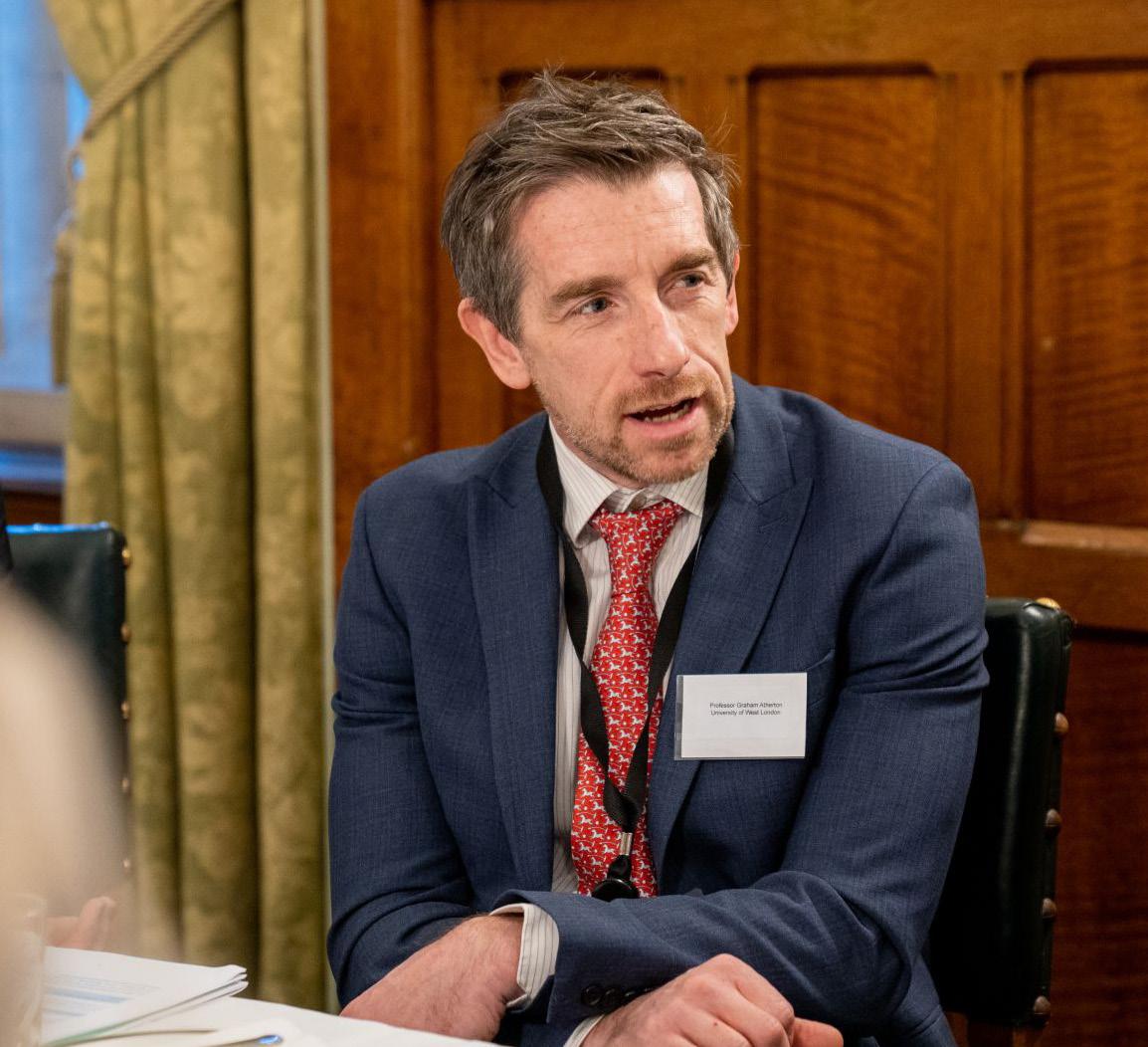
16 GRAEME ATHERTON
While levelling up initiated much new research and practice there was no dedicated research centre which could concentrate specifically on levelling up. The scale and importance of the challenge the government was seeking to address meant such a centre was required to asses the progress it was making. It would also be given credibility by being based on a university where levelling up and social mobility was part of what it does as much as what it talks about. As one of the leading universities in the country where socio economic and ethnic diversity is concerned UWL was ideally placed to lead the national levelling up research agenda.
Over the last two years the Centre has produced 8 reports ranging from work looking at the social mobility challenge in red wall areas; analysis of the government’s levelling up funding and who does and does not benefit to pamphlets bringing together leading voices from policy, business, the public sector and academia to offer alternative perspectives on how levelling up can succeed. We have also worked closely with policymakers from across the political spectrum contributing to government enquiries and convening discussions across Westminster working closely with the Purpose Coalition.
It is a critical time for levelling up. As we begin the long run into the next election how, and indeed if, the commitment to addressing regional inequality will go forward will be of intense scrutiny. Our work over the last two years has highlighted three different areas crucial to the future of levelling up.
Firstly, how the funds associated with levelling up are allocated and who is benefiting is vital to the legitimacy of the agenda. We have examined in detail now not just the £4.1 billion Levelling Up fund but the £13 billion from 12 differing funding steams linked to levelling up has been allocated. While most of the country have benefited there are many areas, including some of the poorest who have yet to do so.
Over the next year we may see some of the early results of this funding as local infrastructure projects built via the fund start to take shape. Whether people can see some real outcomes from levelling up will go a long way to giving some much needed credibility to it. There is also another round of the Levelling Up Fund to be allocated before the next election. Nearly a quarter of the 100 most deprived areas have received no money in round 1 and 2 and we will be watching closely to see whether they will benefit in the final funding round.
The second vital area is the relationship between the key marginal constituencies next year and levelling up. Our latest analysis to be published later in the year looks at the ‘levelling up profile’ of the 120 seats which will decide the next election. They are the ones that Labour need to win if they are to form a government in 2024. The analysis suggests that they are in need of levelling up and below the national average in a number of key indicators. A compelling vision for levelling up, and the policies to back it up, will be essential to win these seats.
The final element that will decide the future of levelling up is the extent to which it gets buy in from local authorities, businesses, universities and others. Levelling up cannot be achieved by government alone and one of the challenges so far has been getting real support for the work from wider stakeholders. Business in particular has a huge role to play and many are actively working to address inequalities within and outside their organisation. We are working with the Co-Operative movement, another Purpose Coalition member, on a new project exploring what businesses across the country and from different sectors want from the next government to enable them to contribute more to levelling up.
On most measures inequality is set to rise over the forthcoming years unless we ramp up efforts to stop this happening and given the state of the public purse, do this smartly. Levelling up has never been more important and producing the research that can lead to effective policy never more necessary.
Professor
Graeme Atherton is the Head of the Centre for
Inequality
and Levelling Up, Director of the National Education Opportunities Network and a Parliamentary Research Fellow at the House of Commons Library.
17 GRAEME ATHERTON
It is a critical time for levelling up. As we begin the long run into the next election how, and indeed if, the commitment to addressing regional inequality will go forward will be of intense scrutiny.
“
Level Up The Levy
FORMER EDUCATION AND SKILLS MINISTERS CALL ON CHANCELLOR FOR AN ‘APPRENTICESHIP LEVY 2.0’ TO LEVEL UP BRITAIN.
Former Education Secretary Justine Greening and former Skills Minister Anne Milton are calling on the Chancellor, Jeremy Hunt, to review and update the Apprenticeship Levy as part of the Government’s national mission to level up Britain.
In a letter co-signed by employers and key stakeholders from across the UK, the former ministers, who oversaw introduction of the Apprenticeship Levy in 2017, call on the Chancellor to commission a formal review into the operation of the levy.
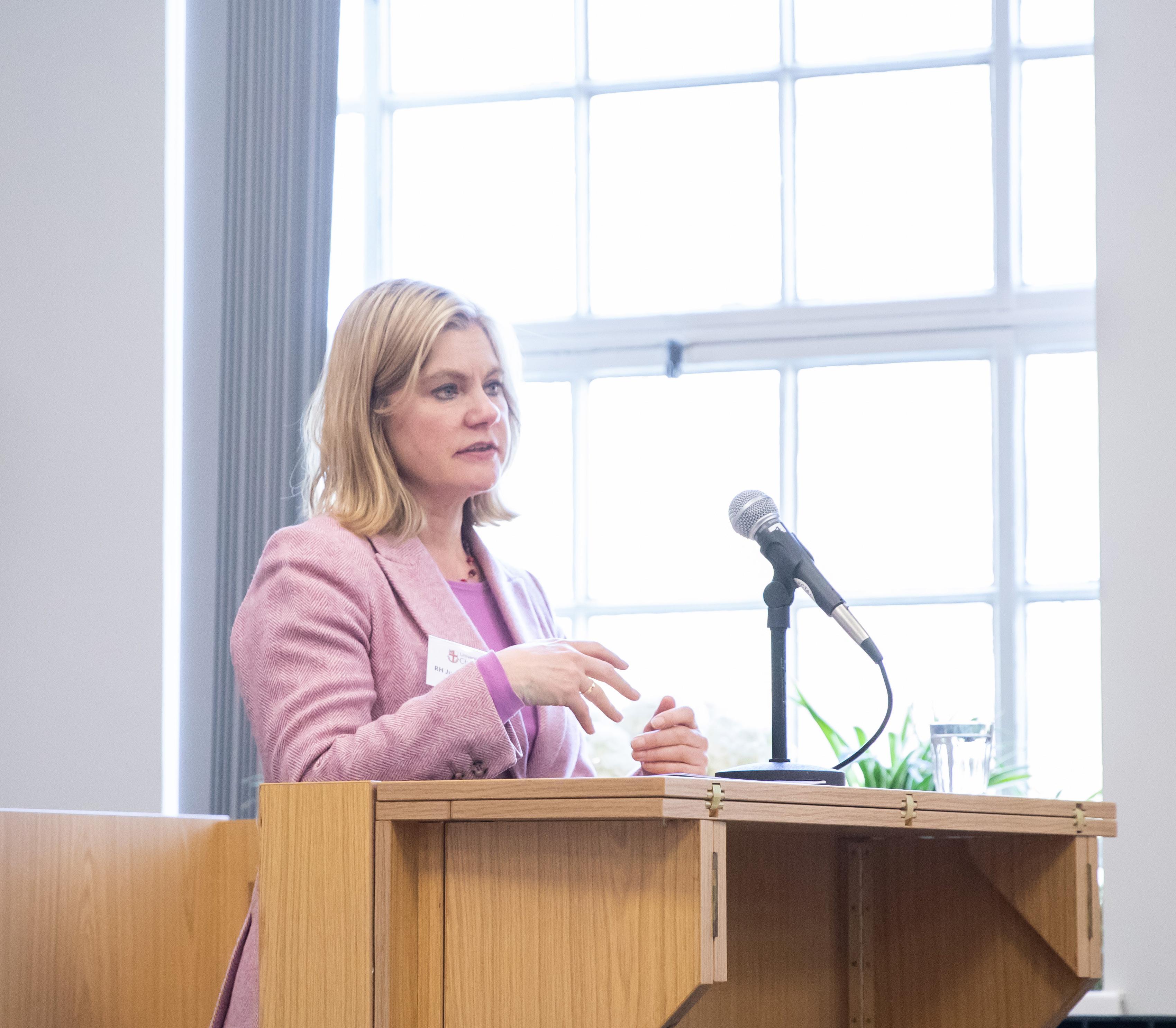
18 RT HON JUSTINE GREENING
Speaking about the need for reform, former Education Secretary Justine Greening said: “When I introduced the Apprenticeship Levy in 2017 its overriding objectives were driving improved social mobility through better quality skills education and tackling Britain’s skills shortages, which were acute even then. The introduction of the Apprenticeship Levy in 2017 was a hugely positive step which has enabled many apprenticeship opportunities nationwide but five years on and with billions of levy going unspent by employers, there’s a risk that without serious reform the levy doesn’t level up Britain in the way we intended. We know there are solutions that could make a dramatic difference to apprenticeships and skills opportunities for people around the country. That is why we are calling on the Chancellor to commission a review and reform the Apprenticeship Levy so that it is as effective as possible in supporting levelling up.”
Former Skills Minister Anne Milton said: “Five years on from the introduction of the Apprenticeship Levy, now is the right time to review how it is structured and make sure the operation of the levy is properly aligned with the drive to level up our country. We need, in effect, an Apprenticeship 2.0, and I hope the Chancellor will take the opportunity to fire the starting gun on this process.”
Shirine Khoury-Haq, Chief Executive Officer at the Co-Operative Group, said: “Apprenticeships are one of the best tools we have to promote social mobility, but the levy as currently designed holds us back. A structured review by Government could empower more employers to offer apprenticeships to those who would most benefit. At the Co-op we’re already working to create apprenticeship opportunities for disadvantaged individuals and communities – we do this by working with other employers to pool and redistribute unspent levy funds. If the cap on redistribution of unspent levy funds were to be increased from 25% to 40% with increased flexibility on how the levy can be used, we could deliver even more of these opportunities.”
Steven Cooper, CEO of Aldermore Bank, said: “Apprenticeships play a crucial role in helping to improve social mobility across the country, but they also present companies with a great opportunity to tap into a pool of talented people that they may otherwise have missed out on. Our business has benefited enormously from the fresh perspectives
and new ideas that our apprentices have brought, but it’s clear that many companies are not taking advantage of apprenticeship schemes in their own organisation. Now is the time to look at this area again with a fresh pair of eyes and figure out how we can make apprenticeship schemes work better for apprentices and companies.”
Clive Higgins, Chair and CEO ad interim of Leonardo UK, said: “The premise of the levy is the right one but it is time to consider how it can be used to address the issues facing employers and the workforce today. By rethinking how the levy is deployed, we have the opportunity to see the levy benefit education, the up-skilling of our employees, and companies within our supply chain, particularly SMEs. I believe with a little more flexibility on how the money from the levy is spent, that there is a real opportunity to bring dividends for the future.”
In the letter the former ministers and cosignatories propose that a review of the Apprenticeship Levy could look at ‘pro-levelling up steps and removing some of the barriers, for example on prior educational attainment, particularly with regard to maths. It could consider how employers can work together to pool funds on collective skills challenges that are also a chance to extend opportunities to underserved people and communities. A modular approach alongside the ability to invest in wider employability skills alongside apprenticeship training would represent a welcome change.’
For the Government, a review could also provide a chance to align with its Lifelong Learning Entitlement policy as it further develops, ‘whilst also enabling a holistic approach to looking at different requests for more flexibility on what can constitute levy spend.’
Co-signatories to the letter to the Chancellor include Aldermore Group, Leonardo UK Ltd, Pertemps Network Group, Sodexo, Tarmac, The Adecco Group, The Co-operative Group, Travelodge and Virgin Money.
19 RT HON JUSTINE GREENING
Obesity – more than just a health issue
LIKE MOST OTHER HEALTH INDICATORS, THE ISSUE OF OBESITY IMPACTS DISADVANTAGED COMMUNITIES THE MOST. POOR LIFE EXPECTANCY, A HIGHER INCIDENCE OF SERIOUS DISEASES, POOR NEONATAL HEALTH AND MATERNAL OUTCOMES ARE JUST SOME OF THE OTHER WAYS IN WHICH HEALTH INEQUALITY IMPEDES ACCESS TO OPPORTUNITY FOR THOSE WHO LIVE THERE. THAT AFFECTS THEIR ECONOMIC PROSPECTS AND LIFE CHANCES. NEW RESEARCH SHOWS THE EXTENT OF THE LINK BETWEEN DEPRIVATION AND OBESITY, AS WELL AS THE WIDER ECONOMIC IMPACT THAT RESULTS FROM A LOSS OF PRODUCTIVITY, WORK ABSENCE AND PREMATURE MORTALITY.

20
PURPOSE HEALTH AND SOCIAL CARE COALITION
The rates of people who are obese or overweight in England have tripled since 1975 and today almost two-thirds of the population live with being overweight or obese. It’s one of the top five causes of premature death in England alongside smoking, poor diet, high blood pressure and alcohol and drug use. New analysis from the Future Health Research Centre, led by a former government special adviser on health, Richard Sloggett, shows the rising impact of a crisis in which the most deprived parts of England have obesity rates one and a half times higher than the least deprived areas.
It also demonstrates a much clearer link between obesity and productivity, highlighting that local authorities with the highest rates of obesity also have the lowest rates of GDP per head at £24,214. Conversely, those with the lowest rates of obesity outside London have the highest rates of GDP at £33,979. That’s a difference of £9,765 a head. None of the 24 local authorities where obesity rates were highest had a GDP above the national average. The average rate of overweight and obesity in the ten places with the lowest GDP is 69.4% - eight in the north of England, one in the West Midlands and just one – Torbay in Devon – in the south. In the ten areas where personal productivity is highest, there is a much lower percentage of 62.6% overweight people. Five are in Berkshire, two in the Midlands, one in Buckinghamshire, one in Gloucestershire and just one in the north in Manchester.
That negative impact also affects employment with places like Hartlepool, Blackpool, Wirral and Kingston upon Hull all in the top 20 local authorities for both obesity rates and workless households.
As with other inequality indicators, there can be significant variation within areas. Thurrock in Essex has the highest recorded local authority rate of people having overweight or obesity at 76%. Seventeen local authorities (all in London) have overweight or obesity rates of below 55%. Islington has the lowest at 44%, nearly a quarter below the rate in Thurrock, despite the two places being just 25 miles apart.
The research also demonstrates the impact of obesity on health outcomes and health inequalities which will inevitably demand increasing amounts of spending on direct and indirect healthcare. At a local level, higher levels of deprivation map onto higher obesity rates, higher numbers of hospital admissions and higher numbers of patients undergoing surgery. Hospital admissions related to obesity, for example, are three times higher in the most deprived areas than the least deprived. There has been an accelerated increase in the number of admissions with a primary and secondary diagnosis of obesity, with a seven-fold increase in the ten years from 2009/10 to 2019/20. All four Integrated Care Systems (ICSs) with the highest rates of obesity are in the Midlands, whereas all five with the lowest rates are in London. There is also an inevitable rise in demand for GP appointments in the worst affected areas.
Purpose Health Coalition members are meeting the problem head on, tailoring action to where they consider it will be most effective and working in partnership with other local organisations who are familiar with their communities. In Warwickshire, for example, where there is evidence that obesity is greater in the more deprived areas of the county, two different trusts are both targeting children. Obese children are likely to become obese adults so the South Warwickshire NHS Foundation Trust is running a health education and nutrition programme for young children as a more general focus on health rather than illness and on helping people to help themselves. George Eliot Hospital NHS Trust is part of a local partnership, North Warwickshire Place, which is running a programme aimed at Year 6 pupils but which also engages with their parents and carers to increase its take up.
The problem of obesity is complex and there’s no doubt that it will require societal change to make a difference. Meanwhile, the OECD estimates that by 2050 overweight and obesity issues will reduce GDP by 3.3% in the UK. It’s clear that addressing the issue effectively is not just a health imperative but an economic one.
21
Purpose Health Coalition members are meeting the problem head on, tailoring action to where they consider it will be most effective PURPOSE HEALTH AND SOCIAL CARE COALITION
“
Sir Keir’s five missions embrace the approach of the best purpose-led businesses
THEMES, SLOGANS AND PLEDGES CAN COME AND GO FOR ANY POLITICAL OPPOSITION, BUT WHAT SIR KEIR STARMER DID IN SETTING OUT HIS FIVE MISSIONS FOR BRITAIN WAS DIFFERENT.
Since the Conservative Party’s extraordinary collapse in the polls last year, Labour has shown a determination to become a credible party of government. But a major question has lingered in the minds of many voters apparently turning away from the Tories: we may be ready for a change, but why vote Labour? What does the party stand for?
Labour’s Five Missions, ‘a long term plan to unlock Britain’s pride and purpose’, are Sir Keir’s answer to that. The level of ambition in the pledges is clear –Britain achieving the highest growth rate in the G7 is certainly a stretch target, as is the mission for the country to become a ‘clean energy superpower’.
But most important is what the Labour leader is saying about resetting the focus and culture of the organisation he leads to deliver that change. As prime minister, he says, his ‘personal mission would be to make mission-driven government a reality’. And in preparation for that, he announced he has instructed his shadow teams to engage in coming months with groups across society to define how those core missions can be delivered. In short, Labour under Keir will be a purpose-led opposition seeking a mandate for a purpose-led government. The party signalled its intent to adopt wholesale the approach that has been transformational for many leading organisations.
This is encouraging indeed for us here in the Purpose Coalition, made up of businesses, universities, health trusts and local authorities who define their purpose then use that mission to shape their activities from top to bottom.
Sir Keir’s missions show he is not simply thinking about how to evoke the idea of change during an election campaign. He is also serious about understanding – and being held to account for - what is needed to drive genuine sustained improvement in Whitehall and on the ground in communities.
Purpose-led organisations will relish the opportunity to engage with that. Since becoming chair of the business group within the Purpose Coalition, I have been struck by how significantly the purpose agenda has changed the world of business. Where once companies would typically have treated assessment of their social and environmental impact as a bolton to be handled by public relations departments, so many CEOs and chairs now realise that their organisation’s wider positive purpose is an integral part of sustainable success.
They are proactive in the communities in which they are embedded and constantly look to build partnerships with organisations from all sectors, including government, to achieve shared aims.
Achieving the highest sustained growth rate in the G7 is close to the ultimate shared aim. For some time, Sir Keir Starmer’s Labour party has been signalling that it wants strong partnerships with business, and companies have been responding with positive interest but curiosity on the vision. The missions Labour have set out, and Sir Keir’s promise to shape his party’s activity around them, can give direction and focus to that vital shared task of planning meaningful change.
22
LORD WALNEY

23 LORD WALNEY
Creating opportunities for young people, the Harrison Centre way
INSPIRATION AND ASPIRATION – THE TWO KEY INGREDIENTS FOR CREATING OPPORTUNITIES FOR CHILDREN AND PATHWAYS INTO WORK FOR YOUNG PEOPLE. BUT THOSE ELEMENTS NEED TO BE BACKED UP BY SOUND ADVICE AND GUIDANCE IF THEY ARE TO HAVE THE BEST CHANCE OF FULFILLING THEIR POTENTIAL.
The Harrison Centres for Social Mobility are key drivers of opportunity in the North East. The first Centre was opened in Sunderland in 2018 by founder Sir David Harrison and is based at the Beacon of Light at Sunderland Football Club. Since then five more Centres have been established in Newcastle, Darlington and Blyth, and also online with the Open University and overseas in Antigua and Barbuda. Each Centre targets specific local educational and employability needs so that young people receive tailored support to get the right skills and the right job. Over £6m has been invested in education and training since 2017 and each year 2,000 young people have benefited from using the Centres.
The Harrison Centre in Sunderland works with Sunderland FC’s charity, the Foundation of Light, to offer young people a range of education, training and skills programmes that are specifically focused on employability. They build a pathway to employment, instilling independence and confidence that will ready them for the workplace and make a tangible difference to their futures. They provide information to help them learn more about the type of job they might enjoy doing and offer practice in interview techniques. Critically, the Centre also collaborates with local partners to provide direct employment opportunities across a number of industry sectors, including work experience and short-term bespoke programmes linked to a specific employer when they are nearly ready to enter the labour market. The Centre’s focus is on the sectors that need skilled workers and will have a high return on jobs. The Engineering Zone offers

24
TRUE POTENTIAL
young people the chance of work experience opportunities and has a special partnership with Vantec, part of Nissan’s supply chain, which runs a four-week training programme and has so far welcomed three Harrison Centre cohorts. Its Health and Social Care Academy is exploring how it can replicate the Vantec model to provide a direct route to recruitment into various NHS disciplines. Its Digital Hub uses digital education for young people seeking careers in esports and other digital industries and the Centre is currently in discussion with a number of local partners to create bespoke programmes in Business Administration and Customer Service.
At the Centre, the Harrison Prize is central to the learning experience. The 2023 prize - the Centre’s fifth – gave learners the opportunity to demonstrate their entrepreneurial skills and creativity in a presentation about a piece of technology they enjoy using, using teamwork to identify ways it could be made even better. This year they were asked to step out of their world and into the world of work to present their ideas – which ranged from robots to gaming platforms and apps - at Newcastle financial technology business, True Potential, where they also had the chance to tour the company’s state-of-the art HQ, meet some of the 500 employees and hear about some of the job opportunities there.
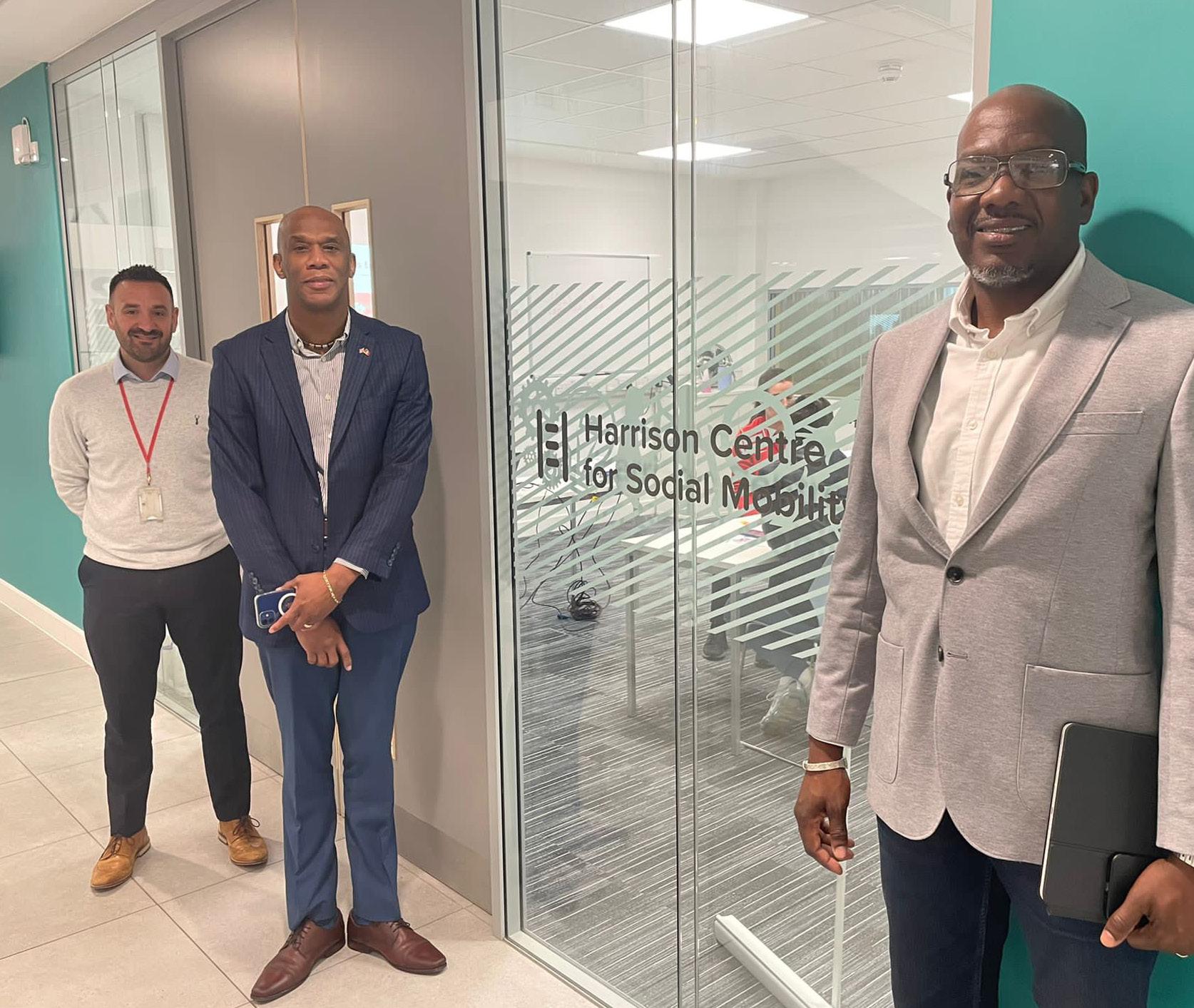
The sixth Harrison Centre opened in March this year in Blyth at the Dales School which works with children with special educational needs and disabilities. Uniquely located in a train in the playground, the Harrison Foundation has funded a carriage’s transformation into a new science and technology lab for STEM for pupils that will also serve the wider community. It’s clearly a different environment to the other Centres but the school and community recognise that its mission is the same - a place where children will be eager to learn and accumulate skills which will equip them for their educational journey and the world of work as well as acting as a focal point for the community.
Harrison Foundation trustee and True Potential Chief Executive, Daniel Harrison, said: “The unconventionality of our latest Centre in Blyth is typical of the Harrison Centres’ approach to tackling poor social mobility – outside the box, but effective. We look closely at the challenges facing young people in their communities so that we can develop innovative and meaningful solutions that will make a difference. The crucial goal is to give people the skills and confidence they need to progress through education, get jobs and live happy and rewarding lives.”
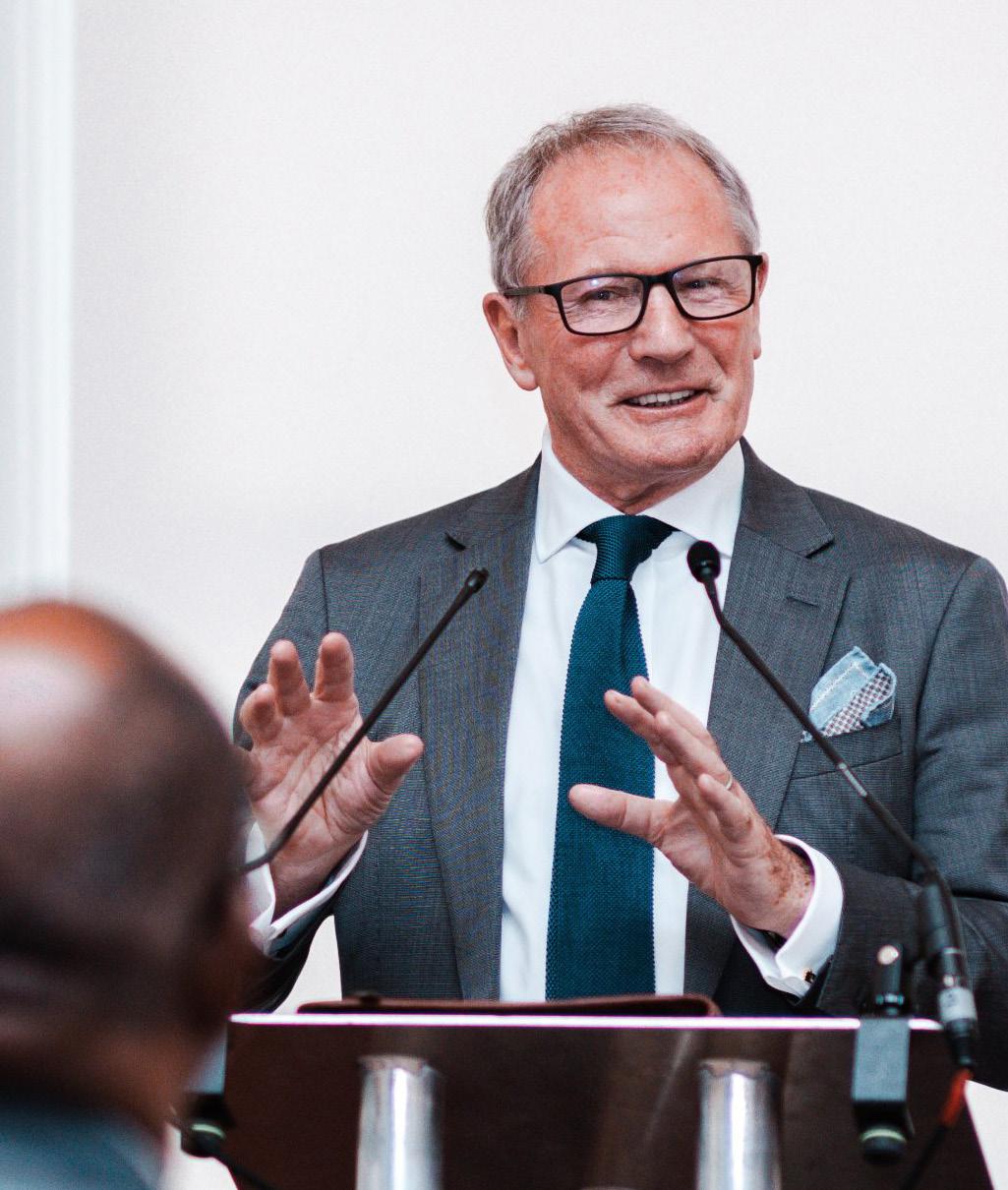
25 TRUE POTENTIAL
Together Today, a campaign for every day of the year
Much has changed for me since that day at London Pride seven years ago when I came out as gay - the first ever openly gay female Cabinet Minister. It wasn’t an easy thing to do at the time, but it was the right thing to do, and I’ve never regretted it. I hoped that I could make a difference by being truly myself so that other LGBT+ people could see someone like them at the highest levels of government.
For others, the situation has, at best, remained the same and for some things have got much worse. Extremism inside and outside the political mainstream, both here and abroad, is a stark reminder that the LGBT+ community is not as warmly embraced as it is on the streets of London in June.

It’s fantastic that Pride Weekend is now Pride Month, giving us the chance to celebrate all that has been achieved over four glorious weeks, and London Pride in particular will always have a special place in my heart. But it’s important to recognise that LGBT+ people and their needs, concerns and aspirations don’t just disappear at the end of June. We need to be a voice for them for the rest of the year too, to reassure them that everyone has their back so that they can feel confident in themselves and have access to the same opportunities as everyone else.
Three years ago, at the height of the pandemic, I launched my Together Tomorrow campaign to save LGBT+ venues. Many of these spaces - sometimes the only places where we could feel part of a community – had closed during lockdown and were on the decline. That impact was felt particularly keenly in rural areas where they were often the only place that you could meet people like yourself. Following that initial campaign, the Government announced a change to planning rules to protect theatres, concert halls and live music venues from demolition or change of use by developers, preventing those that were vacant during lockdown from disappearing altogether and giving a boost to LGBT+ performance spaces.
26 RT HON JUSTINE GREENING
I want to build on that legacy of tackling exclusion by relaunching that campaign as Together Today, with an aim of keeping LGBT+ issues in the spotlight, not just for Pride Month but for all 365 days a year. It will focus on showcasing what businesses are doing yearround to support the LGBT+ community. In our work with leading businesses in the Purpose Coalition, we have seen some great examples of work to improve diversity and inclusion, with initiatives that include network groups, mentoring or recruitment schemes that reach out to underrepresented groups. Sharing that best practice will help other organisations to steer their own paths to a more inclusive workforce where everyone feels valued and able to progress.
Through more effective communication, many of those businesses have found that loneliness is a particular issue of concern for the LGBT+ community, reportedly three times higher than for the general population. Sexual and gender minorities are more

likely to be single, childless, living alone, in less frequent contact with their families and generally at greater risk of social isolation. Those problems were exacerbated by repeated national lockdowns and they were less resilient as a result. That legacy is still with us but now impacted by cost-of-living pressures which are forcing many to make difficult decisions at the expense of their leisure activities and social lives. That affects their health, with research showing that it can be associated with higher rates of mortality, poor physical health, depression and cognitive decline.
Our campaign will work towards a UK-wide strategy to tackle loneliness in the LGBT+ community in the UK, with the development of innovative solutions including a recognised measure of loneliness. Many businesses set up schemes to help their employees feel more connected and less isolated during the pandemic and I hope that this campaign can benefit from their experiences.
At London Pride, I relished the spirit of community and connectedness that it brought. I joined others to recognise the personal sacrifices of those who have gone before us and the progress we have made so far. But there is still much to do so I am also looking forward to working collaboratively with partners in the Purpose Coalition and others to make the UK a country where you can be at your best because you are yourself, 365 days a year.
27 RT HON JUSTINE GREENING
It’s important to recognise that LGBT+ people and their needs, concerns and aspirations don’t just disappear at the end of June
“
Women’s health in the workplace
THE MENOPAUSE AFFECTS 3.5 MILLION WOMEN IN THE UK WORKFORCE. AND BECAUSE 1 IN 4 OF THEM CONSIDER LEAVING THEIR JOBS BECAUSE OF IT, ITS NOT JUST A PERSONAL ISSUE: ITS A BUSINESS ISSUE, WRITES KAREN QUINN, MANAGING DIRECTOR OF CA EMPLOYEE ENGAGMENT.
Channel 4’s Chief Executive Alex Mahon made clear her frustration at male attendees’ reluctance to engage with a ‘Women’s Health’ training session during London Tech Week.
It may be uncomfortable listening for some, but it’s high time that menopause – and women’s health more widely, including menstruation, fertility problems, pregnancy, miscarriage and more –move up the workplace agenda. The time for squeamishness is long gone.
For me, menopause coincided with a long wished for return to work in a job that I loved after a lengthy career break looking after my children. Maybe it was the new challenge, the new friends, the new experiences – and the relief after decades to be rid of the debilitating cramps, vomiting and diarrhoea that are the uncomfortable consequences of many women’s reproductive years – that meant that menopause passed me by almost unnoticed.
Not for me the night sweats, sleepless nights, HRT, brain fog and the multitude of other symptoms that I saw friends working through. What a lucky woman I was, I thought. Ask my long-suffering then boss his opinion, faced with a weeping woman at the drop of a hat on a weekly (at least) basis, and I’m sure he would tell another story. The truth is that I was naïve and it’s only with hindsight that I have really recognised what was happening to me and how it affected me, my colleagues and my work.
In truth I was ignorant about the menopause, and singularly unprepared for it. Friends have suffered lasting and irrevocable damage to their careers and family lives from misunderstanding and mistreatment of symptoms.
Looking back from a safe, post-menopausal distance, I can see now the numerous ways that those years affected me. My confidence and self worth took a knock, my sense of purpose, the disgust I felt with myself at the way that I couldn’t lose weight like I used to, or run like I used to, and how I covered up that shame with jokes about my love of bacon sandwiches, and the emotional outbursts for no apparent reason that were a regular feature for a few years, but have now happily passed.
But I got off lightly. I’ve heard numerous stories, and know of friends, who self-medicate with alcohol, drugs, food and damaging behaviours in an attempt to hide their struggle and ease the bridge from their reproductive years to middle age and beyond.
28
CA EMPLOYEE ENGAGEMENT
SPONSORED CONTENT
It’s tragic, because with understanding, medical help and counselling if needed, and the support of employers and colleagues, women can go on to contribute in a multitude of ways to the success of their organisations and their wider communities for many years post menopause. We are survivors, we are resilient, and there is a lot of wisdom and experience that we can share with colleagues of all ages because of the process we’ve lived through. I’m certainly not the same woman that I was fifteen years ago, but in many ways I’m a better one.
Some of the most forward thinking organisations across the UK are now realising the importance of supporting colleagues through the physical and mental health impacts of womens’ health issues, including our own Purpose Coalition members,
Teleperformance, Adecco Group, Pennon Group, Greene King, Travelodge, Virgin Money, Centrica, Channel 4, the Co-operative Group, Sodexo and others. They are ahead of the game, and are reaping the many advantages of a supported and fulfilled workforce as a result. Others need to catch up and learn from their best practice.
Periods, hormones, PMT, pregnancy loss, fertility issues – traditionally rarely spoken about beyond immediate family, often borne by women alone and in many cases swept under the carpet and left there. No more. With businesses across the UK scrabbling for staff, and with the wisdom and talent that is present in women of all ages, it’s time to take a deep breath, open closed minds, and start the conversation.

29
CA EMPLOYEE ENGAGEMENT SPONSORED CONTENT
Join the campaign putting an end to loneliness in the LGBTQ+ community
TOGETHER TODAY IS THE RT HON JUSTINE GREENING’S CAMPAIGN THAT PROMOTES AND ENCOURAGES YEAR-ROUND SUPPORT FOR LGBT+ EMPLOYEES BY COMPANIES AND ORGANISATIONS, MOVING BEYOND THE FOCUS SOLELY ON PRIDE MONTH. ONGOING SUPPORT IS CRUCIAL FOR CREATING INCLUSIVE WORK ENVIRONMENTS AND COMBATING LONELINESS WITHIN THE LGBT+ COMMUNITY.
Inspired by Justine’s successful previous campaign, Together Tomorrow, Together Today emphasises the importance of addressing the challenges faced by LGBT+ individuals, particularly regarding feelings of isolation.


While progress has been made in terms of visibility and acceptance, there is still work to be done in ensuring consistent support throughout the year. Together Today seeks to engage companies and organisations in actively supporting their LGBT+ employees, fostering an inclusive workplace culture, and providing resources to combat loneliness and promote well-being on an ongoing basis.
Find out more at together-today.co.uk
WHY LONELINESS AND ISOLATION?
Together Tomorrow’s specific campaigning angle is dedicated to addressing the profound and long-lasting impact of loneliness and isolation within the LGBT+ community, which is reported to be three times higher than the general population. With research suggesting that loneliness and isolation have a more detrimental effect on heart health than having a poor diet and not exercising, the impact on the LGBT+ community is severe.
Together Today is dedicated to raising awareness, and fostering innovative solutions to tackle this pressing issue. By recognising loneliness as a critical concern and prioritising the well-being of the LGBT+ community, we can work towards creating a society where where people can be at their best because they can be themselves.
30 TOGETHER TODAY
Now is the time.
AS WE LEAD UP TO COP 28 IN THE UNITED ARAB EMIRATES THE ONE PLANET PLEDGE IS REDOUBLING OUR EFFORTS TO HELP COMPANIES NAVIGATE A PATH TO NET ZERO.
There can be absolutely no doubt that climate change is one of the most urgent and pressing challenges that we face. As UN Secretary-General António Guterres has said, “the climate emergency is a race we are losing, but it is a race we can win”.
Unarguably economic growth has been responsible for lifting unprecedented numbers out of poverty in the last twenty years.
But unless we take action, climate change will have a devastating impact that pushes those gains back and risks devastating consequences.
Our People and our Planet are two sides of the same coin. Through our sister campaign the Social Mobility Pledge, 500 organisations, covering 7 million people, have committed to tackling the opportunity gap for those people with the least privilege.
WHAT IS NET ZERO?
‘Net zero’ refers to achieving an overall balance between emissions produced and emissions taken out of the atmosphere. Like a bath with the taps on, an approach to achieving this balance can either be to turn down the taps (the emissions) or to drain an equal amount down the plug (removals of emissions from the atmosphere such as carbon sinks or carbon capture and storage).
It’s time for change when it comes to our planet too. Business as usual is not good enough. That’s why we must reach Net Zero as soon as possible.

It’s going to require changing the way we work now, and tomorrow. It won’t be easy. But it’s the right thing to do.
Society’s expectations of business are changing rapidly. People see through Corporate Reputation Advertising. They know it is money spent that’s really about protecting the company’s image; not about protecting our communities future - our people and our planet.

Now, more than ever, businesses have a responsibility to lead; it means genuine purpose-led advocacy, on how business can take a wider world’s priorities and make them its own.
That’s why the One Planet Pledge asks organisations to publicly, clearly and transparently make their pledge on when they will reach Net Zero.
One Goal For One Planet. Net Zero.
Find out more at oneplanetpledge.org
31 ONE PLANET PLEDGE
Driving access to opportunity:
CHAIR OF THE PURPOSE COALITION, RT HON JUSTINE GREENING, TALKS TO SEAN HALEY, CEO OF SODEXO UK & IRELAND
Justine Greening: From my perspective, one of the most important things is how involved Sodexo has been on social impact and being part of the Purpose Coalition. It’s something that really runs through the whole company, perhaps as much as any other company I’ve come across. We worked with Sodexo on a Levelling Up Impact Report which we launched last year, setting out its whole footprint and where it goes next, with a big focus on jobs, skills and recruitment. But there’s so much more that this company does, up and down the country in communities, and it’s going to be fantastic to hear a little bit more about that as we chat.
Sean, thanks for speaking with me and perhaps you can tell me about your role and the journey to where you’ve ended up now.
Sean Haley: I joined Sodexo ten years ago. I actually sold a business to them back in 2011, selling from within one big corporate into Sodexo. I had no intention of moving with the business but through managing that process I got to know much more about its ethics, values and purpose and its potential for making a difference and, after 22 years with my previous employer, I decided to come and join Sodexo and I’m now the CEO.


It’s a business that has 35,000 colleagues up and down the country, delivering a range of food and services across both the public and private sectors. Everything from looking after oil rigs in the North Sea right through to big events like Royal Ascot, and everything in between, including prisons, schools, universities and hospitals, so a very interesting business. But all those markets have one common feature - we service, and we connect with the customer so we really have an opportunity to make a difference and have an impact on individuals who are just going about their daily lives. Our strategy in the UK is very clear. We want to grow, but we want to grow with purpose. We want to be very selective and only grow where we think we can really make a difference.
I guess my perfect day is when I’m out in the business. Last week I took the whole leadership team down to Portsmouth where we support the navy and look after the base there, and we spent the day with our teams. And that’s when we really recognize and understand the value that we’re creating and adding and the difference we’re making on the front line.
32 SODEXO
JG: Going back a bit further, were you always interested in business?
SH: I was always interested in business leadership, but very much in the traditional sense that we’re all ambitious, we all want to develop, we all want to stretch ourselves and grow. The difference with working with Sodexo was the opportunity to make a difference. It had a purpose like no other business I’d ever come across, and I think that was a big tipping point for me. I think up to the time of joining Sodexo it was all very much business focused, you wanted to progress and develop. But in Sodexo you wanted to do all that by making a difference as well, and I think that’s been my learning over the last 10 years. I think that’s been the journey that a lot of organizations have been on. We’ve all talked about being purpose-led for many years. I think that bit has now concluded, and there’s no choice. Big business and small business have to be purpose-led and have to make a difference.
JG: I think it’s interesting because, from what I can see, this sense of purpose has always been part of Sodexo but now you’re seeing a wider group of employers catching up. Tell us about how Sodexo sees social value? We’ve worked with you and that culminated in the impact report last year so I’ve personally seen the work that it does. Give people a sense of how you approach the work, and some of the programmes that are in place.
SH: I think we’re in a very fortunate position because I’m a believer that you can’t just switch social value on. It takes many, many years to develop a culture and embed it within your business, and we were very lucky within Sodexo. Again it’s one of the things that attracted me to it. Our founder, Pierre Bellon, established this way of doing business back in 1966 when he established Sodexo and nobody was talking about that. He was talking then about his business needing to serve his people, his communities and have a positive impact on the environment. We’ve had many decades of being able to develop our culture and our way of working to allow us to make a difference and have maximum impact. You can’t just decide to do it tomorrow, you have to build it over many years.
JG: How do you bring it alive for people? As you say it’s one thing saying it, another doing it so how do you actually make it real?
SH: Businesses work best when they have real clarity and direction, and you can simplify what you want to achieve to allow all stakeholders, all colleagues to engage with it, and that’s exactly what we do. So back in 2014 the then CEO, Debbie White, decided
that she was going to develop a public services pledge and share it with the market. That pledge would be very clear on the targets that we were looking to achieve and the impact we were looking to push forward. That allowed our stakeholders to understand what we were committing to but it also allowed our colleagues to understand very simply what it meant to allow us to make a difference. And within that pledge, you would recognize the targets and the objectives we set ourselves. How many apprentices would we have within the organization to drive social mobility? How much volunteering would we do? How many ex-offenders would we employ? How many ex-military personnel would we employ? How many small medium enterprises would we have within our supply chain? Making those targets very clear but simplifying them so that people can actually understand what they need to do to drive an outcome that makes a difference and ask people to engage with it. And once you do that, you soon get some momentum and make progress.
JG: Last month we were both at a fundraiser dinner in Leeds which showed just how good the network you’ve built is. There were lots of really different people in a room together, fundraising. It was fantastic to see people have that clarity. It didn’t feel at all forced because it’s part of what the company’s footprint looks like. It was utterly authentic from my perspective. Is that a big part of what your employees love about being at Sodexo - a sense of having this broader mission?
SH: It wasn’t just Sodexo and our colleagues that were in the room raising funds for our Foundation, it was our broader network stakeholders in the ecosystem that we work within. In that room we had our supply partners, our charity partners, our clients. We’ve always been very clear - there’s no way that we can make progress alone. If we haven’t got alignment with our suppliers, our clients, our charity partners and indeed the government then we won’t make real change, we won’t drive the impact that we all demand. It’s so important that you get that whole ecosystem aligned. And we’ve got a big role to play because I think we can play an integrator role, connecting all those different stakeholders to allow us to collectively have maximum impact, to make the biggest difference. But you do need everybody aligned - and it’s a great observation you make – that it does feel quite natural within our organization. That’s probably to do with the fact that we’ve been this agenda, and owning this agenda for many, many years.
JG: Let’s dig into that social impact pledge because I know you’ve structured that in terms of People, Planet, Places and Partners.
33 SODEXO
SH: We first launched our pledge in 2014 and we report on it every year, but we also want to refresh it to make sure it’s relevant and still current to the challenges that society faces. So in 2021 we restructured it and provided a framework around the four Ps. We were very focused on what we were going to do to support people, our own people and those living in the communities we serve. What are we going to do around the planet to ensure that we really have got the right actions in place to contribute to decarbonization? What are we going to do about the places where we operate to make them better, because the vast majority of my colleagues are working client-side and in communities. No one is really sitting in the head office, they’re all out there in hospitals, schools, universities, military defence sites etc. And then the last piece - partners. They’re so important to us because we need our partners, our suppliers, to have the same commitment and the same convictions that we have if we’re really going to make a difference. Before the dinner we attended together a couple of weeks ago, we’d spent the whole day with our partners working on our collective purpose - what we’re going to do together. We need them to be employing apprentices, we need them to be reducing carbon, we need them to be employing ex-offenders, as well as us. That’s when you bring the whole ecosystem together to ensure that you can generate maximum impact.
Within that framework and pledge you see the things that you would expect to see. Our commitment around apprentices - we now have over 1000 apprentices throughout the business. We also gift our apprenticeship levy because we can’t spend it all and we’ve now gifted two million pounds to other organizations to help them with their apprenticeship programmes. Over 4500 volunteering hours last year. We give all our colleagues three days a year to volunteer, and, as you heard at the dinner, we encourage it to be skills-based volunteering where we take our skills into other organizations to help them develop. Forty per cent of our supply chain is SMEs – that’s another target. That wasn’t the case when we first started, we’ve had to progress towards that. Being a food business, we have a big target around food waste reduction so 230 tons of food waste has been reduced in the last year. As you would expect there’s a solid target around carbon reduction generally which food waste contributes to. There’s targets around employing ex-offenders and ex-military personnel. Then making sure that our foundation, Stop Hunger, is well-funded to allow it to support our charity partners because they’ve never needed support more than they do at the moment.
We’re big partners with Fareshare and The Trussell Trust which are providing the food banks up and down the country. So a neat framework there, going back to the point on clarity and direction, but also very clear objectives around the things that we and our colleagues can do to make a difference.
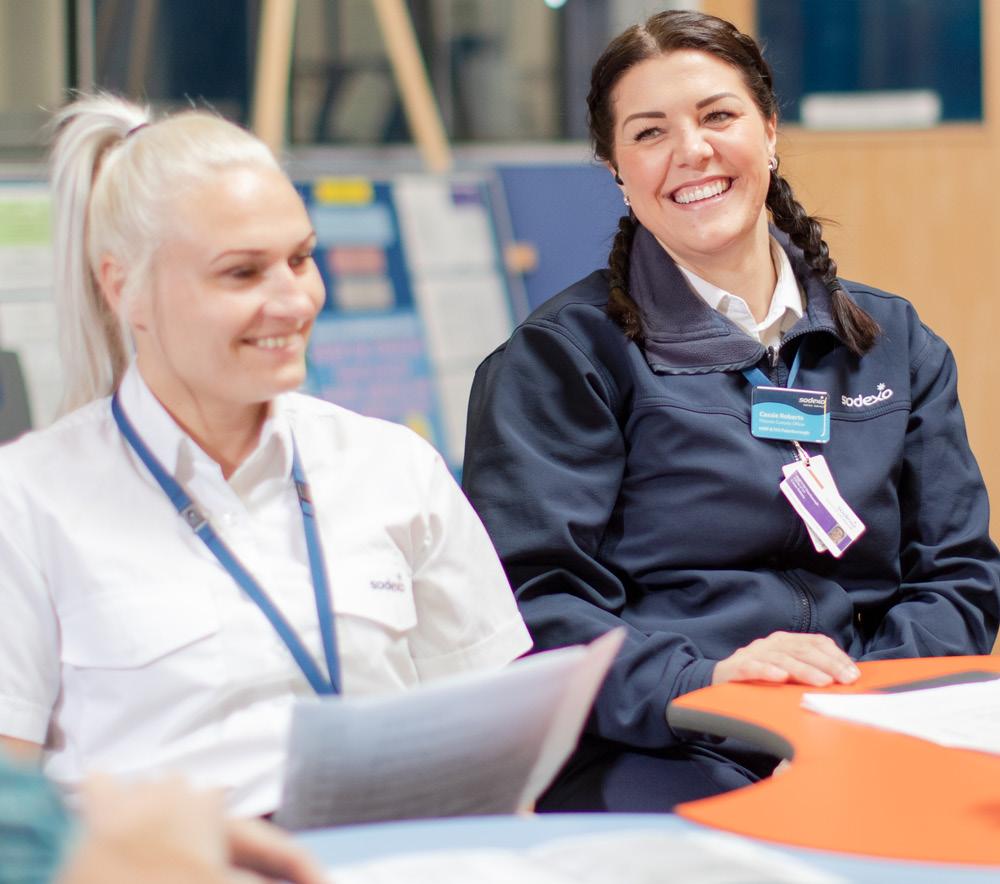
JG: It’s really powerful stuff and it’s part of the ethos behind the Purpose Coalition which is why we’re so proud to have you as part of it. It’s about bringing really different people together and, from your perspective, being able to take that whole Sodexo ethos and broaden your network even more. What we can do is help a whole range of different organizations start to get a sense of Sodexo’s ambition which is really exciting to see happening in practice. Tell us about one area which I think is fascinating – that’s the work you’re doing with ex-offenders and your campaign, Starting Fresh. It really helps provide a genuine talent pipeline to help people coming out of prison to stay out of prison and get their lives on track.
SH: We’ve been operating in prisons in the UK for over 30 years. Our absolute focus is around reducing reoffending, as you would expect. We’re a Ban the Box employer so for many years we’ve not asked those that are looking to join Sodexo to declare any past convictions, unless it was absolutely necessary for the job that they were going to undertake. Some jobs require that, but where they don’t we don’t ask them. We wanted to use our experience over many years of operating prisons but also being an employer of ex-offenders to understand how we could better connect this community - which is developing while serving its sentencewith the market and industry. One of the biggest challenges that industry has at the moment is a
34 SODEXO
skills shortage, we just can’t get enough resources. And this community serving their sentences is being educated. They’re getting NVQs and GCSEs, they’re learning trades - building trades, hospitality trades - and of course these are the skills that are needed in industry more than ever now to fill the gaps. We wanted to connect the two so we’ve invested in a campaign to be able to do exactly that - connect the market with the communities that are within our current prisons. That allows organizations to go into prisons to run career days and meet with offenders who are ready to be released and hopefully get them into good, well-paid employment, because we know what that does for communities and for society generally. 127 prisoners leave prison every day and only 17% of those go into paid work. We know the impact that will have on society and communities, and we now know the demand is there. Industry needs these skills so our job is to provide the bridge between the two to allow them to connect. The response in the first two to three weeks has been very positive. The general public may think that this just naturally happens, it doesn’t. As I say, only 17% of those released go into paid work so it doesn’t just naturally happen. Being an operator of soon-to-be seven prisons up and down the UK, we have a big responsibility to make that happen.
JG: I think it’s genuinely important to start providing some better opportunities so that people can get lives on track once they’re able. They serve their sentence, and it’s about how they then rebuild after that. I think it’s one example of what Sodexo is doing but you’re not just focused on people and communities, you’ve also done some brilliant stuff in relation to planet. You’ve got this journey to
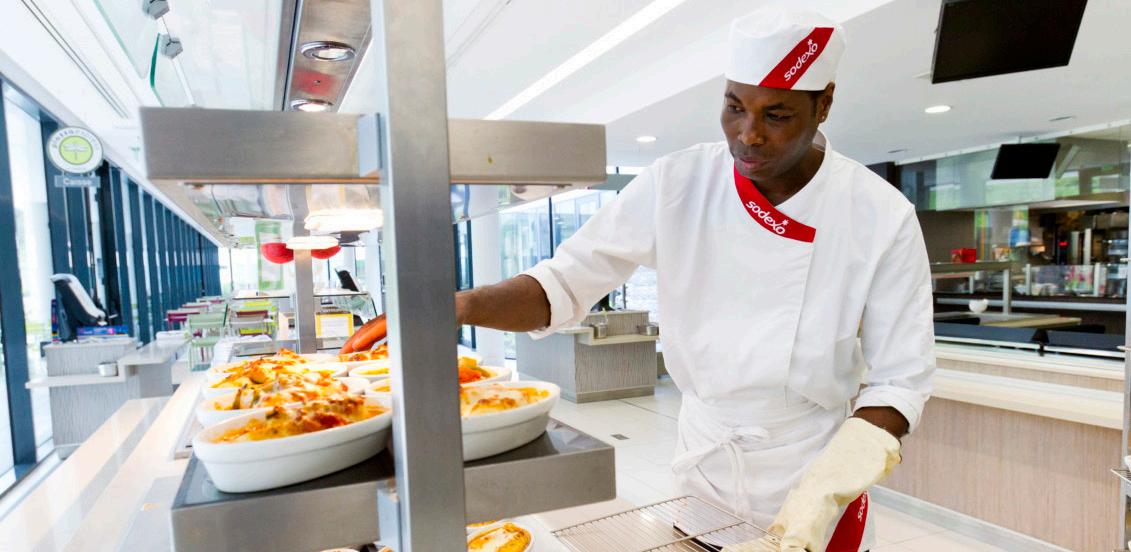
reach net zero by 2040 and a target to be carbon neutral by 2025. Tell us about that pathway to net zero. How hard has that been in practice for the business?
SH: I think it’s very hard for us all. If it was an easy thing to do, we’d have done it by now. Again it goes back to the ecosystem - we all need to collaborate to be able to solve this problem, and it is a complex issue. Sodexo as a group has had a very clear strategy for some time, aligned to the Paris agreement. We in the UK and Ireland wanted to make our strategy through to net zero much more concrete so in 2021 we announced our roadmap. We’d worked with the World Wildlife Fund and SBTi, the science-based target initiative, to ensure that we got some real objective external input but also validation for our strategy because not all strategies are created equal. We wanted ours to be very concrete and very clear. Going back to the point I made earlier, I think if we can give the business real clarity about what we need to do to achieve net zero then we have a much better chance of achieving it. The plan is really clear. We will achieve 90% decarbonization across all three Scopes - Scope 1, 2, and 3 - by 2040, and that’s ahead of the 2045 commitment we made originally. That’s because again we’re continuing to evolve and learn. We’ve just undertaken a review against our baseline of 2017 and we’ve reduced carbon by 33%. Progress has been quicker than we thought, and that’s allowed us to be much more ambitious about our ultimate target so we’ve moved that from 2045 to 2040. Our next big target is 2025 when we’ve committed to reduce food waste by 50%.
35 SODEXO
JG: Is this part of the Appetite for Action campaign?
SH: Absolutely right. Appetite for Action is all about reducing food waste because food is such a big part of our business and food waste is such a big contributor to our commitments around carbon.
JG: Tell us how that campaign works. You obviously have to work through your supply chain as there’s no other way of doing it.
SH: That’s why we spent so much time with our suppliers and partners two weeks ago because we need to collaborate to make this work - we can’t do it alone. When you talk about food waste, I always just keep three or four facts in my mind. A third of all food waste globally is wasted. A billion go hungry every day. If food waste was a country, it would be the third largest emitter in the world behind the US and China. In the UK, 35% of our greenhouse emissions come from the food and drink industry. When you are a food business, the responsibility and the contribution to reducing waste to ensure that we solve some of those issues is significant, and we take that responsibility very, very seriously. That’s why we’ve agreed to reduce food waste by 50% by 2025, five years ahead of the UN’s target of 2030. We did the research around food waste to allow us to launch the Appetite for Action campaign merely because, even given those facts I just shared, food waste was not on the agenda for Cop 26.
JG: There are a lot of other areas which are - travel or energy but not food waste, interestingly.
SH: It’s such a big contributor. We wanted to try to get it on the agenda because nobody seems to be talking about it. Unfortunately, it wasn’t discussed at Cop 26 and it wasn’t discussed at Cop 27. And that’s why we launched that campaign. Through it and through research and engagement with stakeholders, it came out with some very clear recommendations for organizations and for government. I think it has
managed to drive the discussion and move it up the agenda.
JG: With a lot of the work that we’re both involved in on purpose, there are lots of learnings for policymakers to see what’s being done on the ground and how that can be lifted. Tell us a little bit about how you see that interplay work and how policy is developed through collaboration.
SH: I think the backdrop to this is that we all know we collectively have a responsibility to fix, develop, and improve our society. We cannot just rely on Government to do that, so that’s why the interplay you reference is so critical between government and policymakers, industry and the third sector. We need to understand how we can all learn from each other and develop policy that’s really going to drive the right outcomes. I think that’s improved massively over recent years - through our industry bodies, in our case the CBI or UK Hospitality or the Business Service Association. They are great enablers and connectors between industry and government. Government does listen. Policymakers and ministers will have good engagement with this roundtable, they will ask us to comment on policies when they’re in draft so I think that engagement has progressed. I see good progress around engagement on waste, modern slavery, apprenticeships and social value generally. Social value is now a mandated part of any evaluation criteria when the government is procuring services. A minimum of 10% has got to be evaluated on social value, and I’ve seen that reach 30% or 40% in some tenders. It’s critical it happens, and we need to make sure it continues.
JG: I think we’re into a hugely important journey where government really starts to work out what’s going on on the ground with a lot of great companies like Sodexo but also then how can it be part of the enabling environment? How can it design policy that means a Sodexo can do
36 SODEXO
most of what it wants to, without there being impediments? Based on my own experience in government, I think there’s a lot that a government as an employer can learn from what companies like Sodexo are doing. There are some brilliant crossovers on every level between private and public sector.
It’s been brilliant talking to you and going back to your journey. Tell us the best piece of advice you ever received that you thought was really spot on.
SH: You get so much advice throughout your career, I’m sure I’ve forgotten a lot of it! I’m not sure there’s a big piece of advice that’s really influenced my career. It was more about beliefs. I go back to the reference I made to Pierre Bellon, a man we unfortunately lost just over a year ago. He deeply believed that to do business in a good way was the only way to do business - to have a positive impact on your people, communities and the environment. And I think that’s the thing that’s really stuck with me and evolved my career at Sodexo, and I’ve kept it very close and very dear to me. When we’re trying to build a business we must be building it in a way that allows us to have that impact. It’s maybe not advice, it’s more sharing his beliefs and taking those forward.
JG: What advice would you give to people other than having that sense of purpose?
SH: It’s interesting. I remember being told that it’s not what you say about yourself, it’s what others say about you. I think that applies to individuals but it also applies to businesses. That’s the advice I would give, and always remember that.
JG: What’s your proudest career moment to date?
SH: That’s a very difficult one. I’m in a very privileged position in my role because I have proud moments every week, every day, working in a business like this. But I will give you a recent one from only three weeks ago. I was at an event and a shadow Minister realized I was from Sodexo and told me that she’d met a colleague of mine that day in Parliament at an event to celebrate national Apprenticeship Week. By complete coincidence this young man came from her constituency in London, which is a very difficult, challenging one. He was talking about the choices he had to go in one direction or another. He’d chosen to get an apprenticeship in hospitality, and he was talking about what that had given him and how it had given him a purpose in life, training him and educating him to give him what he needed to move in the right direction. And he concluded that story by thanking Sodexo for giving him that opportunity. I can talk all day long about what we’re trying to achieve. I can do podcasts, I can do press releases, I can speak at conferences but you can’t beat that story because that’s what we try to do every day. That is social mobility in action.
JG: And it underlines the point that it is a big issue but it literally happens one life at a time. For companies that have those brilliant opportunities, it’s a chance to change one life at a time which is why it’s so fantastic having Sodexo do the work that it does. Thank you so much for talking to me today. It’s been absolutely brilliant. I would encourage anyone who is interested in social mobility to go and have a look at what Sodexo is doing. It’s on their website and it’s really clear because it’s such a crucial part of the company. It’s a great example of what we want to see many more companies doing. It’s been a pleasure to talk with you and I hope that this is taken on board by many, many people. As I said before, we’re really proud to have you part of the Purpose Coalition so thank you.
37 SODEXO
Money with Meaning:
IN CONVERSATION WITH VIRGIN MONEY’S CHIEF PURPOSE OFFICER
Justine Greening I’m delighted to be joined by James Peirson who has the amazing job title of General Counsel and Chief Purpose Officer at Virgin Money. A lot of people listening will probably know about Virgin Money. It’s a brand we’re familiar with in many respects, a full digital service bank with six and a half million customers across the UK - and I don’t mind saying I’m one of them! Underpinning that has been a really interesting approach it has taken on purpose. Its purpose is making you happier about money. Now some people might think that’s mission impossible but I think it’s a brilliant purpose. Tell me first of all about this really interesting role you have, and then we’ll get into the Virgin Money story.
James Peirson I’m delighted to join you to talk about a subject super close to my heart and super close to my job title as well! I have quite an unusual role in that I spend some of my time looking after all things legal and act as the Chief Legal Officer at the bank but I also spend a lot of it working on the embedding of our purpose - making you happier about moneyacross our business.
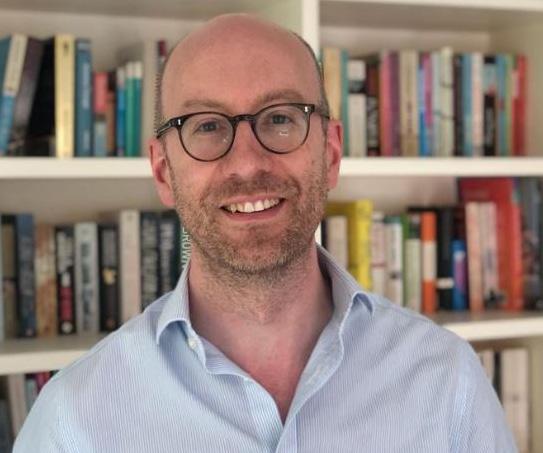
We started that work in 2016 so we’ve been going at it for quite a long time. The transaction with Virgin Money in 2018 provided an amazing opportunity. Purpose has been something close to the Virgin
family heart in all their businesses and provided a great opportunity for us to think about what our purpose should be, and how we could use it to bring those businesses together. One of the things I was particularly focused on and particularly ambitious about was how we went about not just coming up with a purpose statement, or writing it into annual reports, or putting it on the wall, but really thinking about how we aligned everything behind it and how we drove an impact, how we really embedded it. That’s where my role comes in. I don’t lead our customer or colleague strategy but I’m the person who can be a bit of a challenge to those teams. I try to make sure that I’m looking across the whole organisation, to think about the leadership aspects of purpose and make sure we’re using it in the right way to make the best decisions in every part of the bank, and then talk about what we’re trying to do beyond the four walls of Virgin Money. It’s a hugely fascinating role from my point of view and one I’ve been doing for a few years now.
JG Explain a little bit about the corporate transaction and how it became this moment when you could really think about how you were going to be as Virgin Money going forward.
JP The Virgin Money business had components of Northern Rock and other financial services businesses on one side and Clydesdale Bank and Yorkshire Bank on the other. They came together in a transaction in 2018. My own background was on the Clydesdale and Yorkshire Bank side of things. We were a subsidiary of an Australian bank for many years and in 2016 we separated and became independent IPOs. We had the keys to the car if you like - the opportunity to think about what kind of business we wanted to be, what sort of impact we wanted to have, what kind of culture we wanted. At that stage not many people in the business in the UK had engaged with the concept of purpose. In the aftermath of the merger we spent some time looking at other businesses who were viewed as class leaders from a culture and innovation point of view, not just in the FS space but more generally, and not just in the UK but internationally. Purpose kept coming up in those conversations. It
38 VIRGIN MONEY
was very visceral to see how people were using it to guide better decision-making. Whatever part of the business people were working in, you could see the common north star in terms of how they talked about it. It was obvious very quickly that we were missing this in our business. These conversations were emerging around the time we did the Virgin Money transaction. Virgin had been at this for a lot longer and were one of the pioneers when it comes to impact and purpose and being clear on why your business existed, what society would be missing if you weren’t there, how you served customers, how it can be a brilliant place to work from a colleague’s point of view, having an impact in the communities in which you operated. We needed to bring a number of businesses together. By sitting down and defining what our new reason for being was - our new purpose - and getting on with the harder task of embedding it across those businesses, everything fell into place.
JG It was interesting being at what you called your purpose-fest which brings lots of really different Virgin Money employees together to be part of that discussion. Seven years on, how embedded has that purpose become? Do you feel people at Virgin Money really do live and breathe it?
JP I think we’ve made a lot of progress. I don’t think you ever get to the point where it’s embedded in every place, in every person. It’s a constant journey to keep iterating it but I think we’ve made a huge amount of progress. It’s hard to measure purpose but I think it comes back to the early days when the conversations were all about the concept of purpose and why it was important. I can get my head around making you happier about money but you want me to go further and do more with it? You want me to use it to make better decisions? It was hard to find those moments in our business where we could come up with examples of how it had a positive impact. If we’d not thought about it through the lens of purpose, we might not have got to the same place.
That was probably the first couple of years of work on it but that’s not where we are now. The purpose
fest event that you joined us was a great example. None of the conversations were about why purpose, what’s the potential of purpose, how could it have an impact. It was all about the impact we’re having, here are some great tangible examples of the things we’re doing across our business where colleagues across the board can link it to making you happier about money. It was also about understanding how we’ve been bolder and more thoughtful about who we impact. We’ve tried to move beyond just procedural answers to something that has much more emotional connection and I think they’re coming through thick and fast. We’ve always thought it provides us with a competitive advantage. If we can do this brilliantly we’ll have really engaged colleagues who are super positive about coming to work, keen to work together to make things happen for our customers and our customers will then feel that. The more customers we have, the more successful our business can be and the more we can do to give back to our communities and our colleagues. I think we’re in a good place but as I always say when talking about it internally, there’s always more to do.
JG We worked with your team on an Impact Report which we published last year and which was very well received. If you look at the different Purpose Goals that Virgin Money picked, the one around access to savings and credit wasn’t a surprise. But one of the others you highlighted was health and wellbeing. With your purpose it’s literally making people happier about money, getting them to a stage where they’re not stressed but feel positive about it. Interestingly, through the work we are doing with universities, we’ve started to really engage with students to ask which are their top Purpose Goals, which ones matter to them. One that came out in the top four was health and wellbeing. What’s fascinating is none of them would have ever thought that if that’s what they care about, a financial services company would highlight that same sense of purpose. You’re on the same page and I think it’s been fascinating to see some of them rethinking what a company like Virgin Money stands for because of what you’re doing with purpose.
39 VIRGIN MONEY
It’s worth digging into some of the areas we highlighted in that Impact Report because you really have thought about some of the products and customers. Tell us about the product development and your work on the poverty premium.
JP One of the things we discussed a lot with you and the team, and is referred to in the Impact Report, was our M account. From a regulatory perspective it’s a basic bank account which all banks are required to provide in the UK. They tend to be low featurebasic by name, basic by nature, with very few of the features that some of our other accounts have from a digital, insights or tools point of view. From our perspective, given the demographic of the people who usually want one of these basic accounts, our initial reaction on developing a new version was to ask why we should be restricting any of these tools or features. If anything, people who are struggling more, or have less experience of dealing with banking or financial services or credit, are probably most in need of some of the tools and expertise that we can provide through these accounts. So that was a good example - saying we’re going to give all of those tools through our basic bank account to people in a way that we felt was quite different from the rest of the market.
That sits alongside the poverty premium which we’ve been working on for a while. By way of background, this is the extra cost for people in households who are on the lowest incomes and who are paying more for some essential goods and services because they’re on lower incomes. We think it’s about 14 million households and the average annual cost ends up being about £470 a year. It cuts across different areas - energy, insurance, credit and lots of things that fall outside the financial services scope of what Virgin Money can deliver on. But it’s this idea of why we should be letting that situation stand and thinking about what more we can do. We’re keen to make sure that we make all the right changes and provide all the right products, services and tools for our customers from a financial services point of view. We also think there’s more we can do more broadly in partnership with others by linking some of their tools into our offering. We’ve got partnerships relating to energy, with a recent example in utilities where we’ve got the opportunity for people to switch to better deals online.
JG You’re making it a lot easier for people to access.
JP Correct. It’s not something we’ve developed but we’ve made sure it’s plugged into our platform and ecosystem. In a similar way, we’ve worked with the charity called Turn to Us who have a fantastic welfare benefits and calculator tool which, again, we’ve linked into our ecosystem to make sure that our customers are able to link into it and run their own situation through that calculator to make sure they’re claiming the full amount of benefit they’re eligible for. Looking at some of the stats, we can see that a lot of people have done that - over 28,000. About £1.7 million of funds have been identified by people that they were not getting but were entitled to. It comes back to this idea of making you happier about money. Whether it’s with customers, in the communities where we operate, in our colleagues’ work or just society as a whole, we think there’s a role that we can play from a pure money point of view. There’s also a broader role because money is the interface to so many other things. We’ve got a very bold ambition around the poverty premium and want to eradicate it for our customer base by 2030.
We can’t do that on our own and that’s what’s brilliant about the work we’ve been doing with you and the team at the Purpose Coalition. We’re going to need to partner up with other businesses to think about how we can deliver all the components of that, linking in with government and regulators. The list goes on in terms of the broader product offering but going back to how embedded I feel purpose is, with each new proposition it really feels to me like making you happier about money is coming through louder and clearer in each of those than ever before. We’ve been looking at the buy now, pay later market with some of the ills and irresponsibility there over the years to see how we can deliver something that is much more credit-building, friendly and focused on the right target market with all the right education around it. There are lots of things in recent history and that are in development at the moment that have making you happier about money at the heart of them.
JG Having been a Treasury Minister and in Cabinet, I think there’s a real insight on how people interact with all those poverty premium steps and the learning that you get about how people use them. I feel the danger in government is that whenever you see a problem you start thinking we need to get this fixed, but sometimes the best people to fix it are the ones already out there in the ecosystem who already have those links. That’s the fastest way you can get support to people. So I think what will come out of this work is a really helpful understanding of how, in practice,
40
VIRGIN MONEY
people weave in all that action on the poverty premium with the use of an account at a bank like Virgin Money.
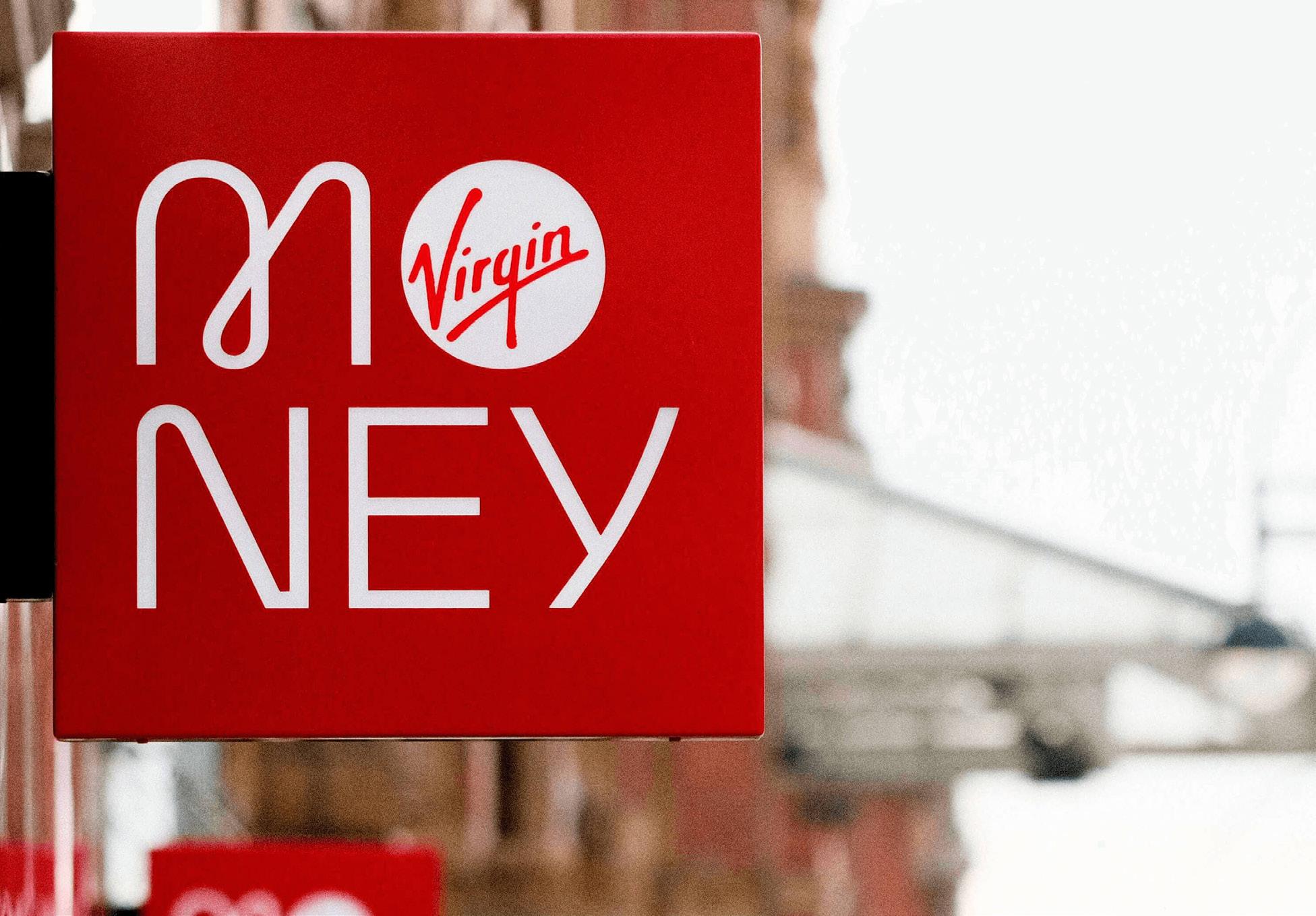
JP We certainly can’t do all of this on our own but equally we’ve got a responsibility to do the stuff that’s within our control. It’s more and more critical that we’re talking to a broader range of policy makers, government, regulators and other industries to share what we’ve learned about how people are engaging with these sorts of things.
JG It’s exactly what we’re trying to do through the Purpose Coalition - to bring together really different employers and businesses, and the education system, in connections that never would have happened otherwise but show you’re actually on the same page in terms of what you’re trying to do. There’s also been a significant piece of work about what this purpose means internally. Tell us about a Life More Virgin and how it’s played out for people on the ground across the business.
JP This is one of the biggest examples of how we use making you happier about money from the get go. We were in the thick of bringing together a number of businesses into the new Virgin Money fold as part of the transaction in 2018 when the pandemic struck. That obviously required, as it did for everybody, a very significant shift in terms of working practices, the use of technology and the way we all work together. It resulted in a bit of a pause in some of the broader things we wanted to do to bring
together our colleague populations and look at best practice from a people policy point of view. As we were coming out of lockdown and returning to face-to-face discussions and back into buildings and offices again, we felt it was a great moment for us to think about how we pulled all this together. We knew we needed to do our part in bringing together all our colleagues on one platform and one shared experience but we also needed to think about flexibility, about wellbeing and all the things we learned through the pandemic about caring responsibilities and those people policies we needed to update and evolve from a diversity, equity and inclusion perspective. And that’s a Life More Virgin.
We spent a long time looking at different ways of trying to deliver this and launched a programme which picks up on all those things - really grounded in making people happier about money, about what colleagues wanted but also making sure we were going to be able to deliver for customers. People had great opportunities to engage in their local communities as well so that’s grounded in flexibility. We were able to give everybody much more than they previously had so that they could choose when and where and how they work. We were able to move to a much more locationless model from a recruitment point of view which has been fantastic from a diversity perspective. With hindsight, we were unnecessarily restricted to our local geographies around the areas where our head offices were but now we’re able to take a much more UK-wide approach to hiring. We’ve been able to introduce some really class-leading people policies, for
41
VIRGIN MONEY
example equalizing parental leave, both for parents and those looking to adopt. Some of those changes have been very significant. I’ve seen them play out and they can be quite confronting on some levels. They draw out why we needed to change some of those policies and move away from some of the biases, conscious or otherwise, of times gone by. We also introduced things around wellbeing. We equalized everyone’s annual leave to the highest amount across the group to make sure everyone was in the same place. We also introduced five paid wellbeing days for people to take in a different way from annual leave so they could link it to a caring responsibility they had, or if things got too much or if they just wanted to do something focused on themselves. That’s been hugely impactful just in terms of the reaction it’s had because it’s not the sort of thing that businesses tend to do too often.
JG How have they reacted?
JP It’s a topic of almost continuous conversation across our business. This is necessarily anecdotal but it’s clear how well people are feeling as a result of being able to take these days off. We encourage colleagues to talk on social media, share stories with their teams to make sure they are role modelling it, particularly leaders. We talk about it in a lot of town halls and other bank-wide events. The stats speak for themselves, particularly around that combination of flexibility, the wellbeing focus and people policies. We’ve had an enormous increase in applications for new roles within the bank since we launched A Life More Virgin. Our employee attrition has pretty much halved and we’ve had a very significant increase in the number of applicants declaring more protected characteristics and who are from a more diverse background through our recruitment work. It’s been a hugely positive change on so many different levels. We’re continuing to look at it, it’s not the sort of thing we’re standing still on. Flexibility can be quite a difficult issue. It’s very straightforward in some teams when people work from anywhere but it’s much harder if you’re supporting customers in a store or working at one of our operational centres. That’s where the need to be bold and to challenge ourselves is. Store managers have been able to think very creatively about how to add more flexibility in the sort of work people are doing and in the kind of hours they’re able to do - the opportunities to deliver on external caring responsibilities and things like that. So even in those areas where there’s a physical location we’ve been trying to push the boundaries and getting good feedback, with the highest employee engagement score ever in our last pulse check earlier in the year.
JG I think it shows that clear sense of purpose and then acting on it both externally but internally does make a difference.
I wanted to ask you about your own journey. Did you necessarily expect to be in this absolutely fantastic role that’s clearly really had an impact across Virgin Money? Tell us a little bit about that journey - did you always want to be a lawyer?
JP I did, although I sometimes wonder whether I’m sort of slowly falling out of it on my career journey! At school I was always quite keen. I liked the combination of argument focus, rules-based academics. Having said that, it’s very real. The work you do matters to people and you can have an impact whether you’re a banking lawyer or a criminal lawyer, applying a lot of theory to real life. I did law at university which was a bit less applicable to real life and more academic. I enjoyed it but the academic side of the legal world was slightly less appealing and I think that’s what drove me towards working in a commercial law firm which I did after university for training and then spent a few years in London, moving further away from the pure academic side of law and more into how it’s applied to real life. I decided I would much rather go and see some of this stuff being applied in a real business and moved into an in-house role and I’ve been doing that ever since, moving around and doing different types of roles.
For the last eight years, I’ve been doing this amazing job as General Counsel of a bank going through huge amounts of change, from being a subsidiary of a much larger overseas business to IPO’ing and becoming independent with a new management team and all the things that come with that, through to acquisition and integration combination with Virgin Money. The team that’s been around through all this is the other bit of the role I really enjoythinking about how you drive that team forward, making sure you’ve got the right people in the right place, engaged and having fun, getting to do interesting work on the journey and then it all gelling and people working well together. That’s the legal role and I really enjoy it but that part of the role is very different from the purpose side of it.
JG Clearly you’re purpose-driven, that’s in a sense why you enjoyed law. So do you see them as fitting together or do you find you have to juggle them a bit?
JP I do think they fit together. Having some meaning to what we’re trying to achieve and being bold and trying to move things forward has always been important from my point of view in terms of what I wanted to do so I think that’s where the
42
VIRGIN MONEY
significant overlap exists. Managing a small team of lawyers working on corporate transactions in litigation for example is very different from thinking how to organise, communicate and influence a much broader cultural transformation of a business of 7000 people. It’s outside the comfort zone challenge of the purpose work but it’s some of the most rewarding when you begin to see the fruits of the work the team puts in, or the evolution of a structured approach to an embedding journey which can feel distant from real life. You see the pieces fit together. It clicks in people’s minds and they begin to get it and use it more, creating that virtuous circle has been really interesting.
My own involvement stemmed from that deep personal interest and that observation in the early work on the missing piece of the jigsaw and why we exist - the potential for that and how if we align everything behind that we will be more successful and have a bigger impact. I got more involved in it notwithstanding it had absolutely nothing to do with my day job at the time as General Counsel. Over the last few years I’ve taken on more and more of a role of driving accountability for it although everyone across the whole bank and certainly all leaders across our business also have to take it forward. I’m not sure there are many other General Purpose Officers out there!
JG I’ve not come across any but it shows how being prepared to play that wider role creates opportunities as well and has ended up allowing you to focus on something that you feel really passionate about.
I’ve got three final quick fire questions to wrap up, so the first one is what’s the best piece of advice you’ve ever been given?
JP The lawyer in me wants to give you four or five different answers but I think it’s keep agitating to make things better, don’t settle. That works on a number of different levels for me. Somebody said that to me early on - if it’s your own career, don’t just settle, keep pushing. Equally on a day to day basis, it’s about not resting on our laurels, not accepting the status quo but constantly looking for better ways of doing things.
JG That sounds like the advice that you’d also give to other people around getting on?
JP It’s often given by me to people in my team, or to junior people coming up through the team, because that’s the approach I’ve taken. It means I’ve got to do a lot of interesting things along the way. Talking to junior lawyers or to people more broadly in financial services in banking, there are so many different
pathways that you can take. There are so many amazing roles in an organization like Virgin Money that people can do - from working on data, artificial intelligence, customer relationship type roles or marketing. It’s not just about being a banker. Again it’s the mantra of keep trying to make things better and move things on. Don’t settle for what you’ve got.
JG And your proudest career moment to date?
JP Hand on heart, it always comes back to the team. The team I lead is an aggregation of lots of different teams from a number of different businesses. That’s not always easy for people to join and they’ve been used to doing things in a certain way. Having a cohesive team that’s firing on all cylinders is so key to delivering what we need to do as a business. I remember there was an event a few years ago where I remember looking at a team of super happy, super engaged people - people working together and getting through any issues that have gone on in the past. That’s my proudest moment - the team we’ve built.
JG The work that Virgin Money has done on purpose is not only insightful for the business itself, there’s just so much more other people can learn from it. I’d really encourage people to go to the Virgin Money website and have a look at some of the issues we’ve been talking about and the steps the business is taking. You can also find the Impact Report on the Purpose Coalition website which is a brilliant rundown of how a company really innovatively and differently about the right purpose for it, bringing that to life and making sure it has real impact.
It’s been an absolute pleasure having you on and thank you very much for being on the podcast.

43
VIRGIN MONEY
Report calls for government-backed Rainy-Day Savings Scheme to protect from cost-of-living shocks
EMPLOYERS SHOULD AUTOMATICALLY ENROL WORKERS INTO A GOVERNMENT-BACKED ‘RAINY-DAY’ SAVINGS SCHEME TO PROTECT AGAINST FUTURE COST-OF-LIVING SHOCKS, A REPORT FROM A LEADING GROUP OF PROGRESSIVE BUSINESSES HAS RECOMMENDED.

44
LORD WALNEY
The Purpose Coalition’s Cost-of-Living Taskforce calls for the government to adapt the recently introduced workplace pensions scheme - which sees joint contributions from employer, employee and government - so workers can access cash at crisis points during their working lives, rather than their savings being locked up until they retire.
The Cost-of-Living Action Plan’s author, former Labour MP and government adviser Lord Walney, said the recommendation to change the rules of automatic enrolment pensions scheme could significantly boost people’s resilience to a future cost-of-living squeeze by allowing workers, businesses, and government to contribute jointly to the crisis fund.
The Rainy-Day Savings Scheme is one of five ideas to tackle the cost of living crisis that focus on moving from immediate crisis support to building up longerterm resilience. The plan from the group, founded by former Conservative cabinet minister Rt Hon Justine Greening and made up of leading purposeled businesses, universities, local authorities and health trusts, also recommends transforming access to cost-of-living support by overhauling the government’s inadequate information systems, tackling the mental health pressures that higher cost-of-living has inflicted on students, and more financial support for childcare.
The Action Plan also calls for a Royal Commission on Personal Energy Security which would be tasked with examining the consequences of giving households the right to an unbroken supply of gas and electricity, making it illegal to cut off someone’s supply.
Crossbench peer Lord Walney, chair of the Purpose Coalition’s Cost-of-Living Taskforce, said: “Politicians have understandably been focused on how to give people immediate help in this cost-of-living crisis but we must also consider what businesses, government and individuals can do to build up resilience against future economic shocks.
“Building on the workplace pension scheme autoenrolment mechanism so people can build up an additional savings pot alongside their pension to help at times of financial crisis could create a powerful tool to ease future crises, without households falling into hardship and the state taking on unsustainable debt. “We are grateful for the support of all the members of
the Purpose Coalition who have contributed to the ideas set out in our Cost-of-Living Action Plan.”
The former Labour MP and Downing Street adviser added: “The socially responsible businesses who make up the Purpose Coalition are working hard to improve conditions for their colleagues, customers and the communities they serve. We are proud to set out in our report examples of how they are making a difference and ideas for new partnerships that can harness the power of public and private sector innovation to protect people.”
Other recommendations propose that the Government create a centralised platform on the Government’s ‘Help for Households’ website to give users access to unique information on the cost-ofliving support available to them; the exploration of ways to share learning and resources on mental health support for students, with businesses and other private sector organisations being encouraged to financially support university hardship funds for students; a reform of childcare with the Government making childcare costs tax deductible for children over 3 months old, alongside an increase in the ceiling for eligibility from £100K to £150K; and a large scale review into the personal energy resilience of households to consider long-term solutions to the deficiencies in the current prepayment meter installation system and the problem of voluntary disconnections.
The report is being launched in Glasgow at the Wise Group, the UK’s leading relational mentoring social enterprise. The Wise Group Fuel Poverty Report 2023: Lifting People out of Fuel Poverty In the United Kingdom uncovered disturbing facts about the impact of fuel poverty, especially on vulnerable people, and it has contributed to the research in the Cost-of-Living Action Plan. Half of those eligible for fuel vouchers are visiting foodbanks, four in five single parents said their mental health had been impacted, double that of couples with children, over two thirds of people on prepayment meters said their physical health had been impacted and over 80% of disabled people said their physical health has deteriorated as a result of rising bills.
45
LORD WALNEY
We must also consider what businesses, government and individuals can do to build up resilience against future economic shocks.
“
Young people call for abolition of the apprenticeship rate
HEADLINE STATS
• Research from Co-op in partnership with VotesforSchools reveals over half (59%) of young people aged 7-16 years old believe apprentices should be paid the national living wage as cost of living drives interest in apprenticeships
• Co-op calls on other businesses to pay apprentices the national living wage to help expand the uptake of apprenticeships and the positives they can offer
New research from the Co-op and presented at a roundtable organised by The Purpose Coalition has revealed over half (59%) of young people believe all apprentices should be paid the national living wage.
In a drive to understand whether the payment of the apprenticeship rate could be discouraging young people from taking up this type of training, Co-op partnered with VotesforSchools, where 24,000 young people aged 7-16 years took part in the survey. Overwhelmingly over half of those surveyed (59%) said they felt it wasn’t fair that apprentices are paid a lower wage.
Currently, the Apprenticeship Rate of the National Living Wage for 2023 has been set at a level below the National Living Wage (£5.28 v £10.42). Potentially putting young people off from pursuing an apprenticeship.
It seems apprenticeships are more important now than ever. As additional research shows 1 in 3 (35%) of young people aged 12-18 are more likely to choose an apprenticeship for their career path, compared to three years ago – and for nearly twothirds (64%) of these young people, the increase in the cost of living is something that makes them more likely to make this choice.
Over a quarter (27%) of the young people surveyed believe apprenticeships are more important now than before the cost-of-living crisis. Over half (51%) of young people said having opportunities to develop skills was an important consideration when thinking about their future career path, while two-fifths (43%) said being able to get paid while also training was an important consideration.
The research was presented at a roundtable organised by the Co-op and the Purpose Coalition in Parliament by four students from Kettering Buccleuch Academy, hosted by Robbie Moore MP, PPS at the Department for Education. Students also highlighted the role schools have to place
46 CO-OP
Over a quarter of the young people surveyed believe apprenticeships are more important now than before the cost-of-living crisis.
“
in making students aware of apprenticeships as an alternative to university and the impact transport costs can have on the affordability of apprenticeships.
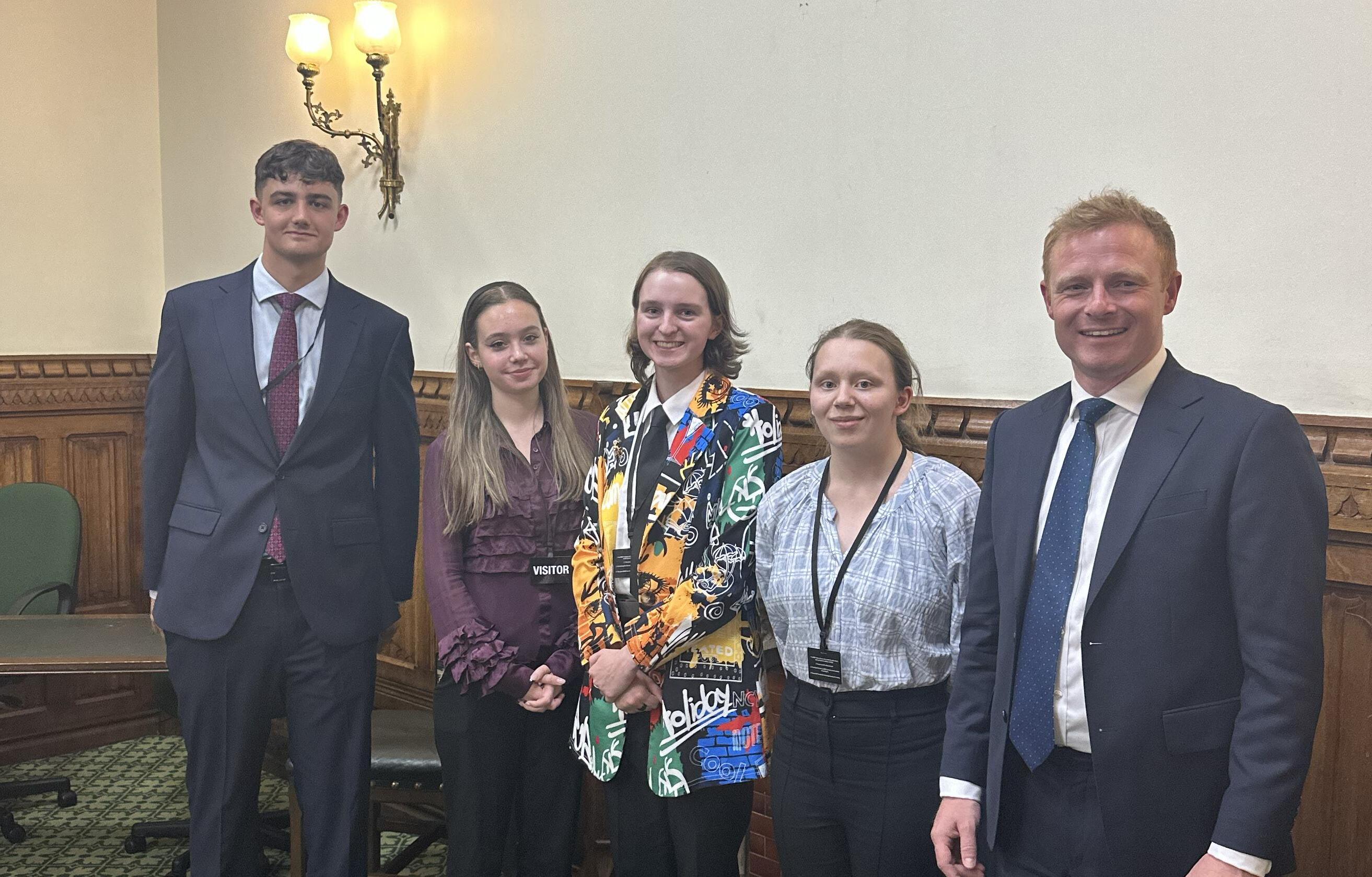
Caitlin Tweed, a Co-op Legal Services Apprentice said: “Working at Co-op has changed my life. I have always dreamed of becoming a solicitor, however my options of achieving my dream, without getting into debt were very slim. With the cost of living being so high and the apprenticeship rate being minimal, I was so worried about how I was going to sustain a basic standard of living.
“The role has enabled me to have that happy work life balance that everyone wishes for. My knowledge is growing everyday whilst earning a fair wage. I’m excited to see what the future brings working at Coop legal services.”
Claire Costello, Chief of People and Inclusion Officer said: “Apprenticeships are a key means to create the opportunities that young people say they want and to promote social mobility. They also ensure everyone has an equal chance to fulfil their potential, no matter who they are or where they are from.”
Robbie Moore MP, Member of Parliament for Keighley and Ilkley said “It was great to join the Co-op, business leaders, policy experts and young people from across the country to discuss the opportunities that apprenticeships provide, and how we can make them better for both apprentices and employersthat is vital to levelling up”
Chair of the Purpose Coalition and former Education Secretary, Rt Hon Justine Greening, said: “There’s clear cross-party consensus that more people should be encouraged to do apprenticeships. They are a fantastic way to earn while you learn, especially for young people who are concerned about the financial implications of going to university or who prefer a more technical education route. But it’s also increasingly clear that the funding system – specifically the Apprenticeship Levy - is calling out for reform. It needs to be fit for purpose for employers who require much greater flexibility if they are to ensure that apprenticeships remain as accessible as possible to everyone. It also needs to work for individuals of all ages if they want to upskill or reskill but who depend on a degree of financial security, especially in the face of current cost-ofliving challenges.
“The Purpose Coalition has been working with the Co-op and other organisations to ensure that opportunity is spread as widely as possible across the country by developing solutions that will make a difference. The recent roundtable is a great example of how bringing together policymakers and businesses can drive progress on the issues that are important and the research presented by young people allowed their voices to be heard. Every political party should lean in to this to ensure that their manifesto commitments on apprenticeships reflect the needs of all parties involved.”
47 CO-OP
The difference we can really make
THE MAN I’M TALKING TO IS AN 82-YEAR-OLD, ITALIAN IMMIGRANT CALLED LEO WHO HAS LIVED IN TENDRING SINCE HE WAS 15 YEARS OLD. THIS SLIGHT FIGURE, WEARING AN OVERSIZED JACKET, WITH SLICKED BACK GREYING HAIR AND BRIGHT BLUE EYES LIVES NOW IN BROOKLANDS, JAYWICK AND WHEN HE SMILES YOU CAN SEE HE WOULD HAVE CUT A DASHING FIGURE IN HIS YOUTH.
Leo is talking to me about his career as a cameraman in films and all I want to do is find out who he captured on celluloid, which stars he’s met from the golden age of cinema, but he is preoccupied by the opportunities on offer to him within the Brooklands Community Shop where we are standing and talking.
The Shop is a not-for-profit community asset, run by Shelly Tidman on behalf of the Jaywick Community Resource Centre and was set up with funding from Essex County Council as part of an ambitious Levelling Up programme to create equity of opportunity across the County, and to address place-based inequality through community, economic growth and skills.
Leo has his shopping basket over his arm and is working his way round the shop which is being delivered from an old commercial unit on, what was a small parade of shops, up until the early noughties.
Fresh fruit and vegetables, frozen meats, frozen veg, milk, cheese and yoghurts, line the left-hand side of the shop in racks, display freezers and chiller cabinets. The rest of the shop is ambient food, bread, pasta, rice, tins, sauces, and packets that can be used to turn the fresh and frozen items into meals for people like Leo, or anybody with a local postcode who wants to become a member.
The experience is one of a convenience store, and when Leo takes his basket to the till, he can pay cash or card. The difference is his basket of groceries are almost 40% cheaper than the same basket would be even in an affordable supermarket.
Project Manager, Shelly Tidman tells me ‘The shop offers a space between those in need of crisis support from food banks and the affordable supermarkets like Aldi and Lidl’.
She goes on to say, ‘It helps people who are regaining control of their money, but it’s dignified, not charity, and people have choice over what they buy.’
Essex County Council is working with Feeding Britain, as part of a County Programme to set up a Community Supermarket in every District. More now than ever this sense of the community helping itself feels so necessary, and once the summer is over the pressure will be back on everybody’s finances.
Unlike a foodbank, which may play a role in dealing with emergency situations, the Community Supermarket model provides an alternative and sustainable place to shop, reducing dependency and increasing autonomy. They can choose the produce they want at prices that are fair.
48 ESSEX COUNTY COUNCIL
I have worked in Jaywick for over 25 years in different roles, and this is the most rewarding thing I have achieved to date. I have had so much support from our Deputy Leader, Cllr Louise McKinlay, who has made it happen and enabled the local delivery teams to set these shops up. Political drive and buy in are so important. At Essex County Council, our politicians have a clear vision and strategy for Levelling Up the region, which unlocks our ability to form effective new partnerships that help improve the lives of residents.
What Leo tells me next breaks my heart and is the very reason for why sustainable access to affordable food needs to be front and centre all policy and decision making, nationally and locally.
When I ask Leo what this means to him, he says ‘honestly it’s a life saver, what I save on my bus fare into Clacton and my shopping here means I can put my heating back on’.
A stark reality but Leo isn’t in a unique position. A lady in her mid-fifties overhears us talking and chips in with her own thoughts.
She is unable to work due to a chronic health condition and finds it physically impossible to get to the nearest town to spend what little money she has. Until now she has been a classic victim of ‘Food Poverty’ only being able to access food from convenience stores where the prices are inflated because of a captive audience.
Mary tells us ‘The food is better here. I can get fresh stuff, combine it with pasta or rice and a sauce, or even make Shepherds Pie that will last me two or three days. I come here every week’.
The Brooklands Community Shop was opened in Phase one of the Essex County Council programme alongside a second, highly successful programme in Laindon, Basildon. Both shops have membership of around 200 members which in turn enables over 800 adults and 550 children collectively to benefit from affordable food.
Phase 2 of the programme has just seen contracts awarded to delivery partners in Castle Point and Colchester which will enable them to be up and running by September. The models of delivery on Canvey Island (Castle Point) and in Greenstead (Colchester) will be different to Jaywick and Laindon, but guided by the local community, each model will be the right one.

49 ESSEX COUNTY COUNCIL
“
At Essex County Council, our politicians have a clear vision and strategy for Levelling Up the region, which unlocks our ability to form effective new partnerships that help improve the lives of residents.
Levelling Up Through Community Power
COMMUNITIES ARE AT THE HEART OF EVERYTHING WE DO IN WARWICKSHIRE. WE WANT COMMUNITIES ACROSS THE COUNTY TO BENEFIT FROM A THRIVING ECONOMY AND EVERYONE TO BE SUPPORTED TO HAVE SAFE, HAPPY AND HEALTHY LIVES.
But to achieve our vision, we need to reduce inequalities and improve social mobility. Opportunities need to depend much less on where you are born or who your parents are. We recognise that to do this for Warwickshire we need to think outside the box, innovate and experiment, and find new ways of working.
We understand the value that lies in working in partnership. Connecting with New Local to develop our Community Powered Warwickshire concept demonstrated our commitment to tackle the longstanding challenges we face by helping residents and communities deliver on their priorities. In 2021 we launched our £1M Social Impact Fund which supported 21 community projects addressing social inequalities post—Covid based on community powered principles and held our first Warwickshire-wide and cross-sector “Big Conversation” about how to develop and embed community power across the County. Our six ‘Groundbreakers’ focus on increasing community power and developing our organisational capability to deliver in a community powered way. And we are currently preparing plans for a Social Fabric Fund to invest in communities in the most deprived places in the county.
Fast forward a year and we have re-committed ourselves to going further for our communities; we’ve refreshed our Council Plan, embedding community power across all services and, in the summer, we hosted our second “Big Conversation”.
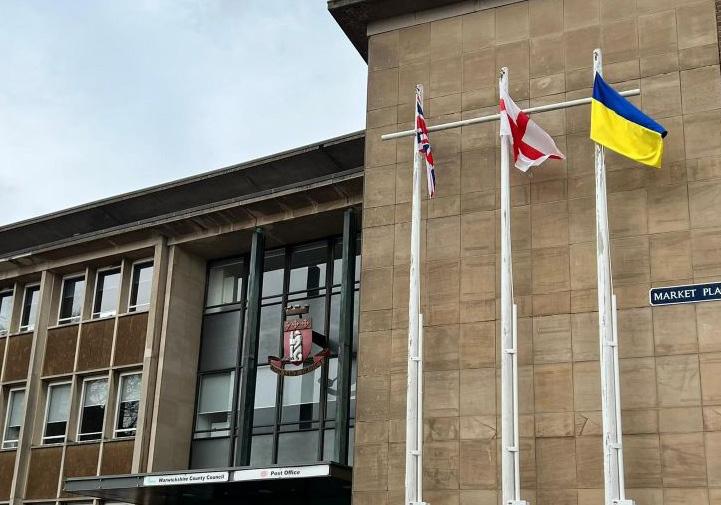
Levelling Up is a long-term mission, and we find ourselves near the beginning. Our four-part Levelling Up definition includes increasing social mobility, reducing disparities, creating sustainable futures, and building community power. Galvanising our communities is extremely important, but we cannot expect our communities to have the capability to solve every problem they face. Tackling historic inequalities and increasing social mobility requires more - more from ourselves and more from our partners.
We knew from the start we wanted to be bold and targeted with our county-wide approach to Levelling Up. Being evidence-led is paramount and has enabled us to prioritise and target resources and communities. We decided to convene our county-wide public sector partners through our “Team Warwickshire” approach. Our districts and boroughs, police, health, and business partners have come together for multiple workshops, looking at the data to understand what our communities need and how we can work together to achieve mutual long-term goals. This has fed into our county-wide priorities and the identification of our priority places and communities.
50 WARWICKSHIRE COUNTY COUNCIL
The current phase of Levelling Up in Warwickshire is developing district and borough Levelling Up Plans. These will tailor Levelling Up to local circumstances and priorities. Action focused, these plans will concentrate on the connections between our countywide delivery against the 12 national Levelling Up missions and specific place priorities, linked to the work of local ICS Place Boards. Alongside this, we are beginning pilots in some of our 22 most deprived Lower Super Output Areas, which will be co-produced with the community to enhance pride in place.
We will increase pride in place and community engagement through arts and culture. Recently, Warwickshire Library Service has been successful in its bid to receive prestigious National Portfolio status from the Arts Council, focused in the north of the county where we see the greatest inequalities. We recognise that communities need more than just physical assets and infrastructure to thrive. National Portfolio status provides us with a powerful opportunity to use arts and cultural events to raise literacy rates, aspiration and educational attainment and will target delivery where there are gaps in attainment.
Our goal with Levelling Up is to build resilience, capacity and skills within communities to mitigate future challenges such as the rising cost-of-living, but we still have much to do.
In the meantime, we understand how our most vulnerable communities are struggling and that we need to go further and faster in delivering support with them.
This demands a new way of doing things. Building on the lessons learnt through Covid, Warwickshire County Council is playing a convening role on the cost-of-living, and in November brought together county-wide partners in a countywide summit on the cost-of-living. We believe in the strength of our communities, partners, and staff to help residents endure this immediate challenge while we pursue the fundamental long-term changes required to level up in Warwickshire.
Guest article by Rob Powell, Strategic Director of Resources at Warwickshire County Council

WARWICKSHIRE COUNTY COUNCIL 51
Working together with a common purpose will help tackle climate change
AS SCIENTISTS ISSUE A FINAL WARNING ON THE CLIMATE CRISIS, EVERY COUNTRY AND EVERY SECTOR HAS BEEN URGED TO FAST-TRACK EFFORTS TO TACKLE IT BEFORE IT IS TOO LATE.
The Intergovernmental Panel on Climate Change (IPCC), a group of the world’s leading climate scientists, has delivered the final part of its huge report. It is seen as the most up-to-date assessment of the impact of the climate crisis - how well the world is managing to mitigate disasters and adapt to those that are now unavoidable. There’s no new science in it but it pulls together key messages from its preceding work that form an essential guide for governments. It’s likely to be the last report from the IPCC this decade and certainly the last assessment of its kind while the world still has a chance of limiting global temperatures rises to 1.5C above pre-industrial levels. Beyond that, damage to the climate will quickly become irreversible. Each incremental amount of warming that can be avoided is crucial, especially for the most vulnerable – those least responsible for global warming but who will feel its impact the most.
The report makes clear that avoiding worsening outcomes will mean making rapid cuts in fossil fuels, with no new infrastructure for oil, coal or gas. In some sectors like agriculture, aviation, shipping and industrial processes, this will be difficult and
net zero will only be achieved by the deployment of carbon removal from the atmosphere. It calls on governments to increase their public funding for climate funding and give clear signals to investors, with central banks and financial regulators also playing a part. It argues that changes driven by consumers - for example diet, food waste and switching to low carbon transport - can help to cut emissions in many sectors. It also recommends that technology, knowledge and policy measures should be shared to help communities avoid being locked into carbon-intensive futures.
The latest report has been called a summary for policymakers. National governments have accepted its findings and agreed to incorporate them into their response to the climate crisis. The British government responded with a call for countries to work together with far more ambitious climate commitments ahead of COP 28, the international climate summit set to be held in the UAE in November. It will be the first opportunity for each country to give an update on its progress in cutting down emissions.
With COP 28 taking place in Dubai - fast becoming a business and financial services hub - the UAE has set out to show that it is taking its role very seriously. It is seeking an international profile as the Gulf’s most proactive nation on climate action and understands the need to diversify its economy away from oil.It was the first in the region to set 2050 as its net zero goal and at COP 27 was the first to announce absolute emission cuts. This next
52 LORD WALNEY
summit has the potential to be the biggest yet and it is a huge opportunity for the UAE to drive forward the world agenda.
As part of that, it has also launched a global initiative to ensure that young people’s voices are heard, and that they are at the heart of policymaking on climate change. The International Youth Climate Delegate Programme will focus on including their perspectives, building their skills, capacity and knowledge to engage in climate processes, especially in the most impacted countries and provide a model for youth inclusion for the COP process.
The UK Government has pinned its level of aspiration to the mast but every organisation, business, community and individual will have to give serious thought to their own ambitions and review how they can go further, faster. The Purpose Goals provide a framework to encourage a common approach and greater impact on equality of opportunity, based around key life stages and the barriers that prevent people from getting on. Goal 13 is focused on harnessing the energy transition and net zero, ensuring that it’s fair and creates opportunity across the country, with investment in the green economy which results in new careers. It’s an integral part of the conversation about levelling up.
Purpose-led organisations which are intent on making a positive social impact, particularly for the most disadvantaged, can play a leading role in shaping a response. Purpose Coalition members like Centrica, bp, UK Power Networks and SMS, with energy as their core business, are investing heavily to achieve net zero as organisations but also to help others achieve it through their work with colleagues, customers and communities. That extends to the work they are doing on education and early careers, to inform and encourage young people into STEM careers so that the country has the right skills to take forward the innovation that will be required to meet the challenges on climate change. SMS aims to deliver the future of smart energy by investing in and optimising the energy infrastructure that drives carbon reduction.

Other partners in the Purpose Coalition, across sectors, have also put a fair energy transition at the centre of their social impact ambitions, from defence company Leonardo which has integrated environmental issues into its business strategy with a sustainability plan that covers research, technology and innovation to food services company Sodexo which has a huge focus on food waste to Solent University which is now fully divested from fossil fuels and whose purchase of electricity is all from renewable sources.
The message is that the world has the toolkitthe knowledge and technology - that will help to achieve genuine change but is not using them enough. The way in which organisations tackle climate change should be the same as the way in which they manage their social impact, though sharing best practice, creating effective partnerships, driving innovation and measuring their progress is the same way that they can contribute to tackling climate change.
As the COP Presidency has acknowledged, it’s also vital that young people are included in the debate on their future. The Purpose Coalition’s work has shown that they are clear that they want prospective employers to align with them on environmental matters and employers will need to be able to demonstrate a commitment to going further faster if they are to attract the best talent. The stakes are incredibly high but the opportunity is there to build a fairer society in the process, one that will work for everyone.
53 LORD WALNEY
Fall in UK life expectancy rates highlights impact of inequality
IN A YEAR OF SOBERING ECONOMIC NEWS A NEW STUDY REVEALED THAT LIFE EXPECTANCY RATES IN THE UNITED KINGDOM OVER THE LAST SEVEN DECADES ARE WORSE THAN ANY OTHER COUNTRY IN THE G7, APART FROM THOSE IN THE UNITED STATES. FRANCE, JAPAN, GERMANY AND ITALY ALL NOW HAVE BETTER LIFE EXPECTANCY RATES.
Academics from the University of Oxford and the London School of Hygiene and Tropical Medicine examined global life expectancy ratings between 1952 and 2021. When the late Queen came to the throne 70 years ago in 1952, the UK had one of the longest life expectancies in the world, ranked seventh globally behind countries such as Norway, Sweden and Denmark. By 2021 it had fallen to 36th place out of 200.
The average life expectancy in the UK has risen since the start of the study - from 68.6 years in 1950 to 80.4 in 2020, compared to 68.0 and 77.4 respectively in the US. But these improvements have failed to keep pace with other countries such as Norway where people can now expect to live until 83.2, or Sweden where it is 82.4. The report highlights that income inequalities rose significantly in the UK during and after the 1980s and that was accompanied by an increase in the variation in life expectancy between different social groups, falling particularly for poorer groups. The OECD has reported that the UK is now the second most economically unequal country in Europe after Bulgaria.
Meanwhile, recent analysis by the campaign group Health Equals has highlighted the widening gap in life expectancy between people born in wealthy and disadvantaged areas of the country, with a child born in Hampstead in north London
expected to live to 88 while one born in Glasgow can expect to live to 76. The research used ONS figures to determine the life expectancy for babies born this year in every parliamentary constituency. It showed huge regional disparities, with 15 of the 20 constituencies with the highest life expectancies in London and the southeast while 17 of the 20 with the lowest are in Scotland. The gap between richest and poorest areas has widened by more than two years over the past 20 years.
The authors of the research believe that where babies are born and grow up is an even greater factor in their future health than individual behaviours and genetics. Certainly it has become much clearer that the determinants of people’s health can be found in the quality of their homes, in the green spaces and clean air around them, in access to education, the availability of good jobs, the physical activities they have access to and the social connections they can forge. It’s also become clearer that there is a widening gap between those who can access these things easily, and those who can’t. That leads to health inequality with poorer health during people’s lives and a reduction in life expectancy.
Beyond the headline global and national statistics there is a very real lived experience of inequality leading to missed opportunity. This can no longer be seen in isolation as a health issue and as a country we will need to address it holistically if we
54
RT HON ANNE
MILTON
are to reverse the decline. As anchor institutions in the areas they serve, purpose-led NHS Trusts and other health organisations can play a crucial role in tackling health inequality, with an understanding of the particular challenges that their communities are facing. Their involvement in a range of place-based partnerships that offer expertise and support can make a real difference. More people in work, higher productivity, less time spent in poor health and better mental health – all wins for the individualand the places in which they live which will reap the rewards of social and economic development.

55
As anchor institutions in the areas they serve, purpose-led NHS Trusts and other health organisations can play a crucial role in tackling health inequality. RT HON ANNE
“
MILTON
Travelodge launches the first Levelling Up Impact report within the UK hospitality sector
Guy Opperman MP, Member of Parliament for Hexham officially launched the first Levelling Up Impact Report for the UK hospitality sector. Produced by Travelodge, one of the UK’s largest hotel chains and the Purpose Coalition, the report highlights a number of key strengths which see Travelodge leading the way on the levelling up agenda nationally and regionally and it also outlines the group’s social mobility approach for the future.
To support the launch of its Levelling Up Impact report, Travelodge also announces its pledge to support its colleagues to ‘Learn More, Earn More & Belong in a new programme which includes the following new initiatives:
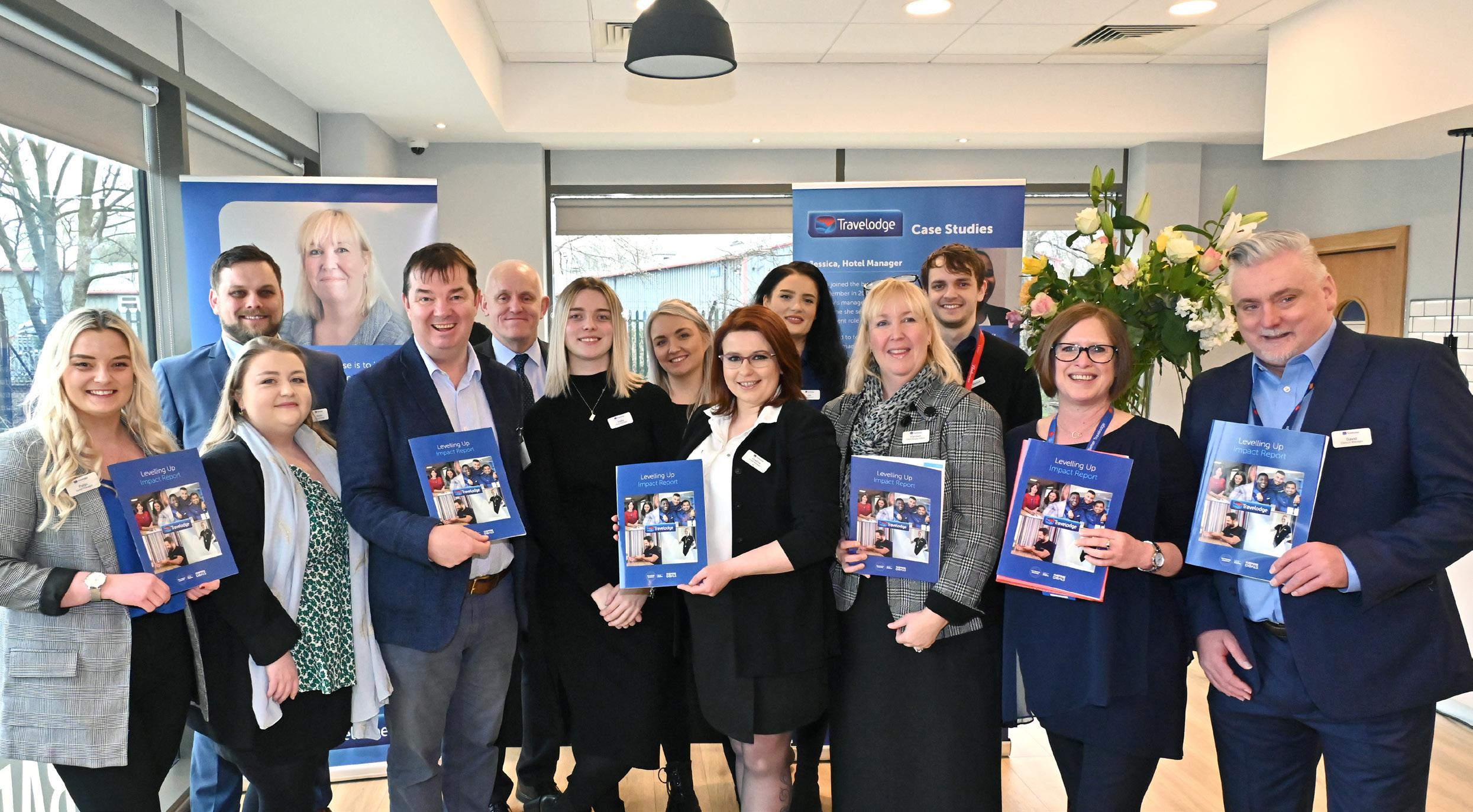
A new improved apprenticeship programme called Aspire. This four-level comprehensive programme provides a clear pathway of development and career mapping for hotel and maintenance colleagues to progress from entry level roles through to a District Manager level.
For head office colleagues, Travelodge has introduced a new development programme called Limitless aimed at middle managers with a strong focus on good health and wellbeing being fundamental to drive team performance. An investment of £6 million and a commitment to place 6,000 colleagues on the Travelodge Aspire programme over the next ten years. Travelodge has identified that it can expand its UK hotel network with a further 300 target locations for new hotels across the UK and has written to 220 Local Authorities proposing a joint development partnership - that can act as a catalyst to stimulate regeneration, facilitate growth and support the Government’s Levelling Up programme. For over 120 towns, it could be an opportunity to have its first branded hotel. This expansion programme could represent an investment of £3 billion for third party investors and create around 9,000 new jobs across the UK.
Travelodge is a leading player within the UK hospitality sector and has a mission to make travel affordable for everyone. Travelodge opened the country’s first branded budget hotel in 1985 and today the group
56
TRAVELODGE
operates nearly 600 hotels across the UK, Ireland and Spain. It employs over 12,000 colleagues (73% are female) in full and part time roles. Travelodge is also a gateway employer helping people from all walks of life to start or restart their career. It is also dedicated in supporting parents to return to work by offering flexible working hours around the school run - so that Britain’s mums and dads can progress their career whilst raising their family.
The Travelodge Levelling Up Impact report identifies the group’s social impact against an innovative framework of 14 Purpose Goals created by The Purpose Coalition and supports the group’s sustainability plan called ‘Better Future’ which focuses on three key pillars: Inclusive, Caring & Conscious.
Goal 5: Open recruitment - Travelodge ensures that employment opportunities are open to the widest range of people, working with partners in areas of high unemployment. It has an ambition to achieve a 50/50 gender split at a senior level and 10 per cent ethnic minority representation by the end of 2025 and offers flexible working hours around colleagues’ lives.
Goal 6: Fair career progression – Travelodge ensures that colleagues have the opportunity to grow their careers in a supported environment with continuous training and is able to fill around 80% of its management roles internally. It has improved its apprenticeship programme called Aspire which has already helped nearly 1500 colleagues progress their careers at Travelodge and aims to help a further 6,000 colleagues over the next ten years.
Goal 8: Good health and wellbeing – Travelodge’s successful internal wellbeing programme recognises that true wellbeing is dependent on a number of elements and, through listening to its colleagues’ concerns, has responded with a wide range of successful initiatives to support financial, emotional, physical and work health.
The report also makes a series of recommendations about potential future action that will ensure Travelodge continues to have a significant social impact, including a focus on social mobility cold spots to maximise that impact, measuring and tracking the socio-economic make-up of its workforce
Guy Opperman MP said: “I am delighted that the Travelodge have launched their levelling up report here in Hexham.
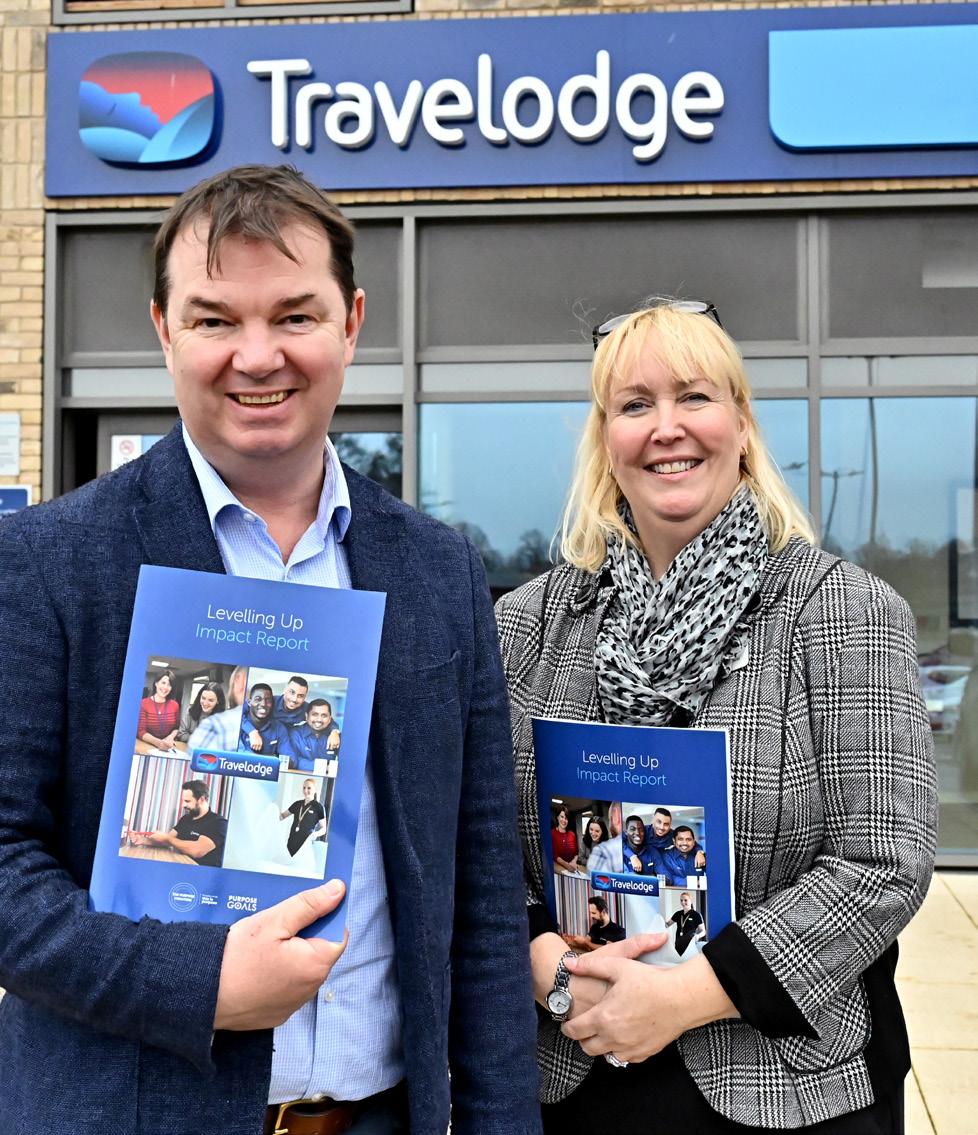
The redevelopment of the old bunker site is an example of levelling up in action. The investment into the site has created over 60 permanent jobs and a £2.16 million visitor spending boost.
It was also brilliant meeting with Holly and the local Hexham Travelodge team.”
Hannah Thomson, Travelodge, Chief People Officer said: “We are very excited to be the first company within the UK hospitality sector to be leading the way on the levelling up agenda. With nearly 600 hotels across the UK, Spain and Ireland, Travelodge is well placed to support the levelling up agenda across all regions of the UK. Our colleagues sit at the heart of our business and we are committed to providing an inclusive workplace where everyone can Learn More, Earn More & Belong. Working with The Purpose Coalition has helped us to understand and celebrate all the great things we are currently doing, but more importantly, to start understanding where we can do more to support the country’s levelling up agenda and improve our social impact across all the communities that we operate within.”
“We hope our Levelling Up Impact report will inspire other hospitality companies to support the UK Levelling Up agenda, so together we can make a real difference to the people that make UK Hospitality a world class industry.”
Rt Hon Justine Greening, Chair of the Purpose Coalition, said: “This report contains some great examples of how a company can tailor opportunities so that people from all walks of life, and with different backgrounds, can have access to rewarding careers. Travelodge understands that there is a particular need for the hospitality sector to attract and retain talent and it has been very successful in doing that, alongside successfully growing its core business.
57 TRAVELODGE
Place-based solutions will help end homelessness
There are many complex reasons for people becoming homeless. A lack of affordable housing, poverty, unemployment or a life event such as divorce or mental health issues can all result in someone losing their home. Those leaving prison, care or the armed forces and women escaping an abusive relationship are also often forced into homelessness.

A decent home is a fundamental human right. People who have access to affordable, good quality homes build safe and sustainable communities. So the rising tide of homelessness is a cause for concern, not just for the individual but also for the country’s wider economic and social prosperity. In the UK 300,000 people experience homelessness
every night, half of whom are children. Its impact extends much further - to their health and wellbeing, education and employment prospects. The costof-living crisis has undoubtedly made the situation worse and the mortgage rate timebomb is expected to lead to even more people losing their homes.
Prince William has made his commitment to the issue clear. He is the patron of homelessness charity, The Passage, which he first visited with his mother, Diana, when he was just eleven. He is a regular visitor, learning first-hand about the range of problems that homeless people face and how the organisation supports people, from prevention to community integration schemes and into accommodation.
58 ENDING HOMELESSNESS
As the first major initiative since he became the Prince of Wales, he has formalised that commitment with the launch of Homewards, a UK-wide project which aims to end homelessness. The five-year programme will work in six towns and cities, bringing together organisations and individuals to find local solutions to homelessness. It is hoped that its findings can be used to create a framework for other areas in the UK. While acknowledging that finding solutions can be as complex as the causes of homelessness, the Prince sees collaboration at a local level as intrinsic to addressing the problem, citing Finland as proof that this works.
This place-based approach is one that the Purpose Coalition promotes in its work with leading organisations to widen access to opportunity across the country. Communities that are safe, with a good quality of life and homes that people can afford, are communities that are sustainable in the long run. Without that security, there is a risk that their talent will move elsewhere and deter the very business investment that could transform them.
The Purpose Goals were created by the Purpose Coalition to provide a framework for organisations to help identify gaps in access to opportunity and address the common socio-economic barriers that prevent people from achieving their potential. In addition to Goals that address issues such as fair recruitment, good health and wellbeing and digital connectivity, Goal 12 focuses on building homes and sustainable communities.
This drive for social mobility is one that Prince William has positively supported. In March 2020 he joined Purpose Coalition Chair, Rt Hon Justine Greening, at an event held by Coalition partner, Tarmac, the leading sustainable building materials
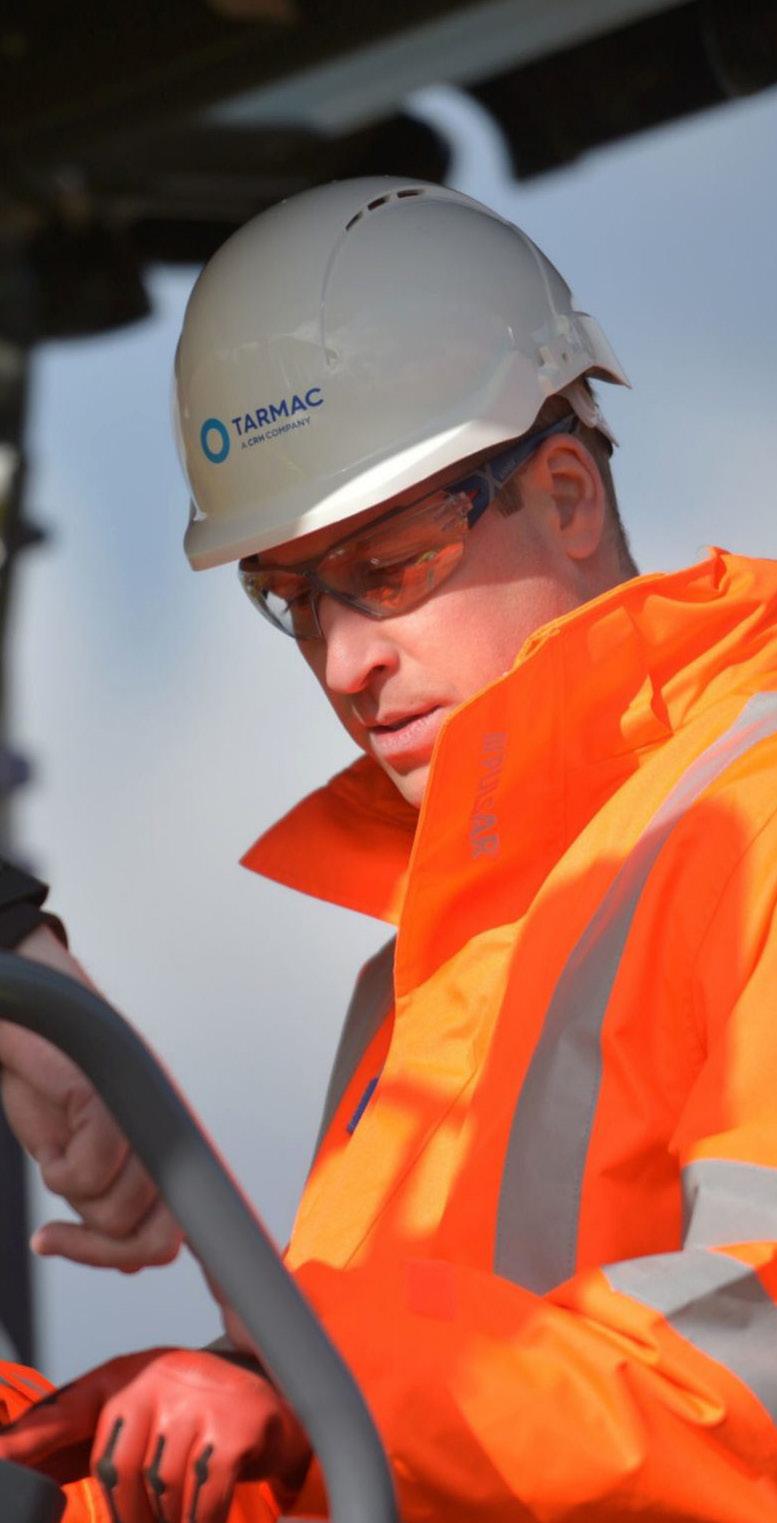
and construction solutions business. At its National Skills and Safety Park in Nottinghamshire he discussed social mobility with business leaders and spoke about opportunity and training for young people, meeting with workers and apprentices to hear about their experiences.
The housing issue is set to be a key focus of the political agenda over the coming months. The Purpose Coalition will continue to work cross-party with its partners to advocate solutions that are based on local experience and expertise to ensure the personal and public stability that comes with having a home.
59 ENDING HOMELESSNESS
“
People who have access to affordable, good quality homes build safe and sustainable communities.
Changing the model to change outcomes – the Hewitt review
PATRICIA HEWITT’S RECENT GOVERNMENT-COMMISSIONED REVIEW OF INTEGRATED CARE SYSTEMS (ICSS)
IS A RESPONSE TO THE UNPRECEDENTED CHALLENGES FACING OUR HEALTH AND SOCIAL CARE SYSTEM. THERE ARE CLEAR REASONS WHY NOW IS THE RIGHT TIME FOR A NEW APPROACH - AND IT’S ALSO CLEAR THAT PURPOSE-LED NHS TRUSTS AND HEALTH ORGANISATIONS - ESPECIALLY THOSE ALREADY LEADING THE WAY AS MEMBERS OF THE PURPOSE HEALTH COALITION - WILL HAVE A KEY ROLE TO PLAY.
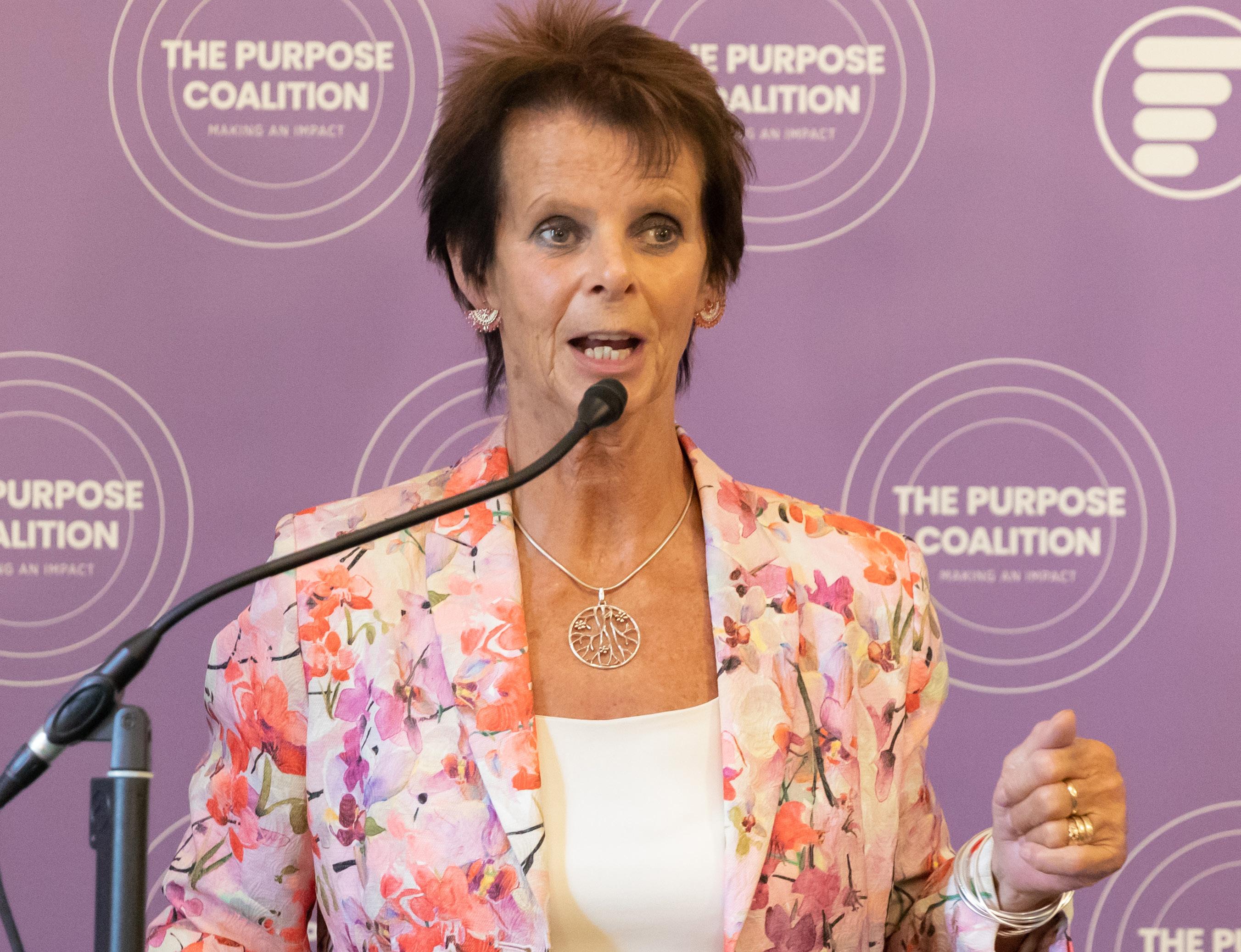
The most obvious challenges are the pressures that the entire system is currently experiencing – many evident even before the pandemic but undoubtedly exacerbated by it. Lengthy waiting lists, missed targets on A & E waits, ambulance response times and cancer treatment and industrial action all command the headlines but they are compounded by heightened public expectation as a result of advances in digital and data technology. There are also a growing number of people living with complex, long-term physical
and mental health conditions, often associated with serious disabilities or ageing. Finally, the nation as a whole is becoming less healthy, both physically and mentally. More people spend longer in ill-health and die younger than they should, with the least economically advantaged and those affected by racism, discrimination and prejudice affected the worst. Health inequality is a growing problem and contributes significantly to the demands on health services in a cycle of disadvantage.
60
RT HON ANNE MILTON
The Hewitt review has taken an independent look at the role that ICSs play, with the view that they provide the best opportunity for transforming our healthcare system, now and in the longer term. They are guided by four key aims – to improve outcomes in population health and healthcare; to tackle inequalities in outcomes, experience and access; to enhance productivity and value for money; and to help the NHS support broader social and economic development. They work through integrated care boards (ICBs), responsible for planning and funding most NHS services in the area, and integrated care partnerships (ICPs), which bring together a broad set of partners including local government, the voluntary, community and social enterprise sector, NHS organisations and others to develop health and care strategies for their areas.
The review has identified six key principles that are necessary for them to thrive and deliver their core responsibilities - collaboration within and between systems and national bodies; a limited number of shared priorities; allowing local leaders the space and time to lead; the right support, balancing freedom with accountability and enabling access to timely, transparent and high-quality data.
It has recommended that there should be a change of focus away from illness and towards promoting health, with a shift in investment in preventative services that will enable people to live independently for as long as possible, build more resilient communities and reduce health inequalities. That will help tackle the fundamental causes of the current burden on the NHS and address the constant cycle of ‘winter crisis’ management.
The review also suggests a rebalancing of the health system - one of the most centralised in the world – by bringing people together in different ways to
allow more local accountability and priority setting within the whole ICS. Government and NHS England should reduce the number of national targets and work through empowered place partnerships and neighbourhood teams. Each ICS should be able to set a number of locally-developed priorities or targets, as well as deciding the metrics for measuring them.
With recruitment and staff shortages crucial issues for the health service, the Hewitt report highlights the importance of building a sustainable, skilled workforce that will help unlock the potential of primary and social care and deliver the much-needed focus on prevention and early intervention. That means removing some of the barriers that currently exist, including the way in which the workforce is trained. ICBs will now have the opportunity to work with all elements of primary care to achieve the accessible and integrated services – including, for the first time, the commissioning of community pharmacy, optometry and dentistry - that residents and local communities need.
The review also concludes that current investment in the NHS is not creating the best health value. It suggests a reset, with an alignment of all national and local partners around health value, so that health and care is not seen solely as a cost but as adding a wider value to our society and the economy.

The Purpose Health Coalition supports purpose-led NHS Trusts and believes that they can play a major role in delivering many of these changes which will alter the way our health and care system operates. Adept at fostering constructive local partnerships as anchor institutions in their communities, and based on their local knowledge, our Coalition partners are already contributing to a more effective system. For example, amongst a wide range of work across the country, they are responding to the needs of very different coastal towns in Suffolk and Essex, tackling children’s dental needs in Stoke and supporting local people into lower-banded jobs in London. As part of the Coalition, they are already sharing best practice to demonstrate what is possible to other organisations and using evaluation and measurement as key tools in their efforts to track their progression in creating opportunity for the communities they serve.
With a new system model and an emphasis on prevention, ICSs can be the key to delivering sustainable, tailored solutions and to driving improved outcomes that will help to achieve improved health and wellbeing across the country and level up leftbehind areas.
61 RT HON ANNE MILTON
Unlocking OpportunityThe Critical Link Between Local Housing and Economic Stability
When we think of the picturesque landscapes and coastlines that make up much of the country’s desirable holiday destinations, places like Devon and Cornwall come to mind. These places attract tourists from around the world, providing a significant boost to local economies and creating job opportunities.
However, amidst the beauty lies a pressing issue that affects the people who form the backbone of these local economies.
The lack of affordable housing across the UK, but particularly in tourist hotspots, can leave local people and those doing essential jobs - such as care workers, nurses and local service workers - locked out of the housing market. This not only hampers their own opportunities but also hinders social mobility within these communities and dampens local economic growth. During the pandemic, it was reported that 98 per cent of the people absolutely essential to the running of the country, and to the lives of the vulnerable, could not afford to buy the average priced home in Britain. Now with the subsequent cost-of-living crisis coupled with soaring interest rates and rental prices - 4.7 per cent increase in average rent prices between February 2022 and February 2023 alone - the problem is worsening. Recognising the gravity of this issue, the Purpose Coalition has embarked on its Rural Opportunities work, aligning closely with Purpose Goals 11Infrastructure for Opportunity - and 12 - Building Sustainable Communities.
Several organisations are taking proactive steps to address these challenges. South Hams District Council’s new leader, Cllr. Julian Brazil, has rightly prioritised local housing as a key concern, highlighting its far-reaching impact on businesses, schools, and hospitals due to the unaffordability
of decent housing for key workers particularly in South Devon but also across the UK. Cllr Brazil recently said “In many rural communities, house prices are changing the nature of villages, with young people and many key workers moving elsewhere.”
Cllr Brazil is right, if we are to unlock opportunity then the supply of local affordable housing must be tackled first and Cllr. Julian Brazil’s new leadership at South Hams District Council is shining a light on the local housing crisis. By prioritising local housing initiatives, South Hams District Council has the opportunity over the coming years to provide key workers with accessible and affordable housing optionsensuring that the local economy remains vibrant and robust. This approach has the potential to be an example for other councils and organisations across the country, demonstrating the importance of affordable housing in sustaining economic stability.
The scarcity of affordable housing for key workers jeopardises the stability of local economies. Without suitable housing options, organisations struggle to recruit and retain essential staff, putting public services and businesses at risk.
This issue is particularly grave in the healthcare sector, where the NHS is grappling with acute staff shortages. The Purpose Health Coalition recognises the severity of the situation and has launched the ‘NHS: be at the heart of it’ campaign. This initiative aims to encourage more people to join their local NHS and commit to serving their communities. By addressing record high waiting lists and promoting better health outcomes, the campaign seeks to alleviate the strain caused, inpart, by a lack of housing for NHS workers.
62
JACK SAVAGE
Affordable housing for key workers is a critical component of maintaining thriving local economies. When nurses, teachers, and other essential workers struggle to find suitable accommodation, the consequences ripple through the community. Businesses, schools, and hospitals suffer as key workers are forced to commute long distances or simply choose to work elsewhere. The Purpose Coalition and its member’s acknowledge the urgency of this issue and are committed to developing innovative solutions to address it, especially in rural communities.
The Purpose Coalition is committed to addressing the housing crisis through our Rural Opportunities work. By strategically pooling resources and expertise, the coalition aims to create sustainable solutions that empower local communities and enhance economic stability. Through collaboration with local authorities, businesses, and community organisations, the Purpose Coalition seeks to take action and forge a path towards organic and affordable housing opportunities for the workers that are absolutely critical to local economies and the running of the country.
Scarcity of affordable housing for key workers jeopardises the stability of local economies
From South Hams District Council’s proactive approach, to the Purpose Coalition’s commitment to driving change, it is evident that stakeholders are waking up to the urgent need for affordable housing solutions.

By recognising the far-reaching impact of housing unaffordability on essential workers and their communities, we can begin to dismantle the barriers that hinder social mobility and economic stability. Together, through collective action and collaboration, we can unlock opportunity and create a future where everyone has a place to call home.
Jack Savage, Coalition Manager and Researcher
63
“
JACK SAVAGE
Tuition fee rethink can drive levelling up
THERE HAS BEEN MUCH COMMENTARY, AND SOME WRINGING OF HANDS, ON SIR KEIR STARMER’S ANNOUNCEMENT THAT THE LABOUR PARTY WOULD BE DROPPING ITS PLANS TO SCRAP TUITION FEES IN THE LIGHT OF THE COUNTRY’S CHANGED ECONOMIC CIRCUMSTANCES.
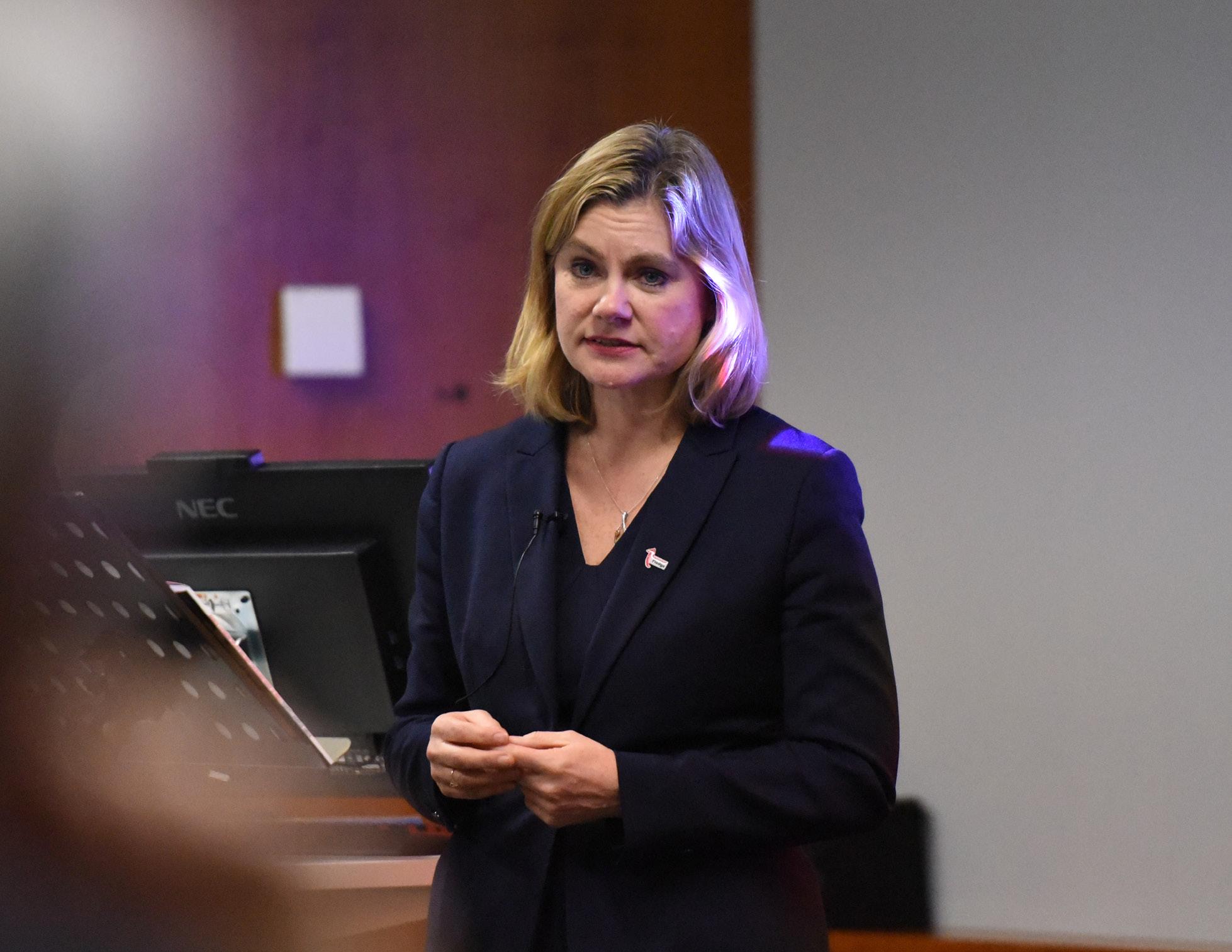
64
PURPOSE UNIVERSITIES COALITION
The Labour leader has cited changes in the country’s financial situation as the reason but has confirmed that his party would begin consulting on the issue and looking at alternative ideas. Some of those suggested by policy experts include reducing the cap on student numbers, increasing the financial support available to low-income students, higher fees for some high-cost subjects, a levy on employers and increasing the number of higher-paying foreign students. Former cabinet minister, David Blunkett, suggested last year that any policy change on tuition fees should support and incentivise flexible, part-time study.
Meanwhile, with a general election next year, there is only a vacuum where there should be wellconsidered strategies from both the Labour and Conservative parties. That is difficult news for the thousands of pupils sitting GCSEs and A Levels who will find it difficult to make decisions about whether higher education is for them and, if it is, how much it is actually going to cost them. That uncertainty seems unfair for a generation who have already had their education badly disrupted by the pandemic. It’s also hard for universities who need a policy framework that can deliver a stable and transparent system to fund higher education.
In its current form, that system is unsustainable and unfair. Tuition fees are a crucial part of maintaining investment in higher education but, as they have been frozen since 2017, high inflation now means there have been real term cuts. For students, annual fees of £9,250 for a full-time undergraduate course mean they incur significant debt, middle earner graduates will face marginal tax rates above those of the rich, while universities remain underfunded. Some students, of course, are able to sidestep the issue as their parents pay their tuition fees upfront, removing them from the repayment system completely.
In the meantime, it is the least advantaged students who are paying the highest price. Maintenance loans to help them with living costs have not kept pace with inflation so they are having to take on more paid work with, inevitably, less time to study. The additional pressures they are facing with the cost-of-living means that more of them will feel forced to drop out. Even if they graduate, the current system sees those students with the least family financial support leaving university with the highest debts for which they will face more interest charges and take longer to pay off. The situation is likely to deter some candidates from applying to university at all.
Many, including students themselves, believe that it is only fair that they pay for their own degrees. A recent YouGov poll showed that 50% supported paying fees, with only 30% suggesting that the public should fund them through general taxation. There needs to be an urgent discussion about how best to do this. Chair of the Purpose Coalition, Rt Hon Justine Greening, has suggested that those graduates who do best out of university financially should contribute the most back. A graduate contribution could see all graduates pay their earnings-based graduate contribution but for the same set time period, rather than being based on how much debt is accrued, as it is now. That means that those graduates who go on to successful careers in finance or law for example would pay back more overall than their graduate colleagues who became teachers or nurses, whatever their respective backgrounds.
Creative and ambitious solutions are required, with collaboration from all stakeholders, if we are to have a viable higher education system again. But it must be one that ensures opportunity for everyone, if it is to drive personal and national achievement and to demonstrate a genuine commitment to levelling up.
Find out more at purposeuniversitiescoalition.org

65
PURPOSE UNIVERSITIES COALITION
Local Elections: former Labour MP and political strategist Lord Walney gives his take
ON THE FACE OF IT, MAY’S LOCAL ELECTION RESULTS ARE A RESOUNDING SUCCESS FOR LABOUR AND DREADFUL FOR THE TORIES.
Labour is not only making progress in areas where the party was already represented in strength, but making gains in parts of the country which are especially important.
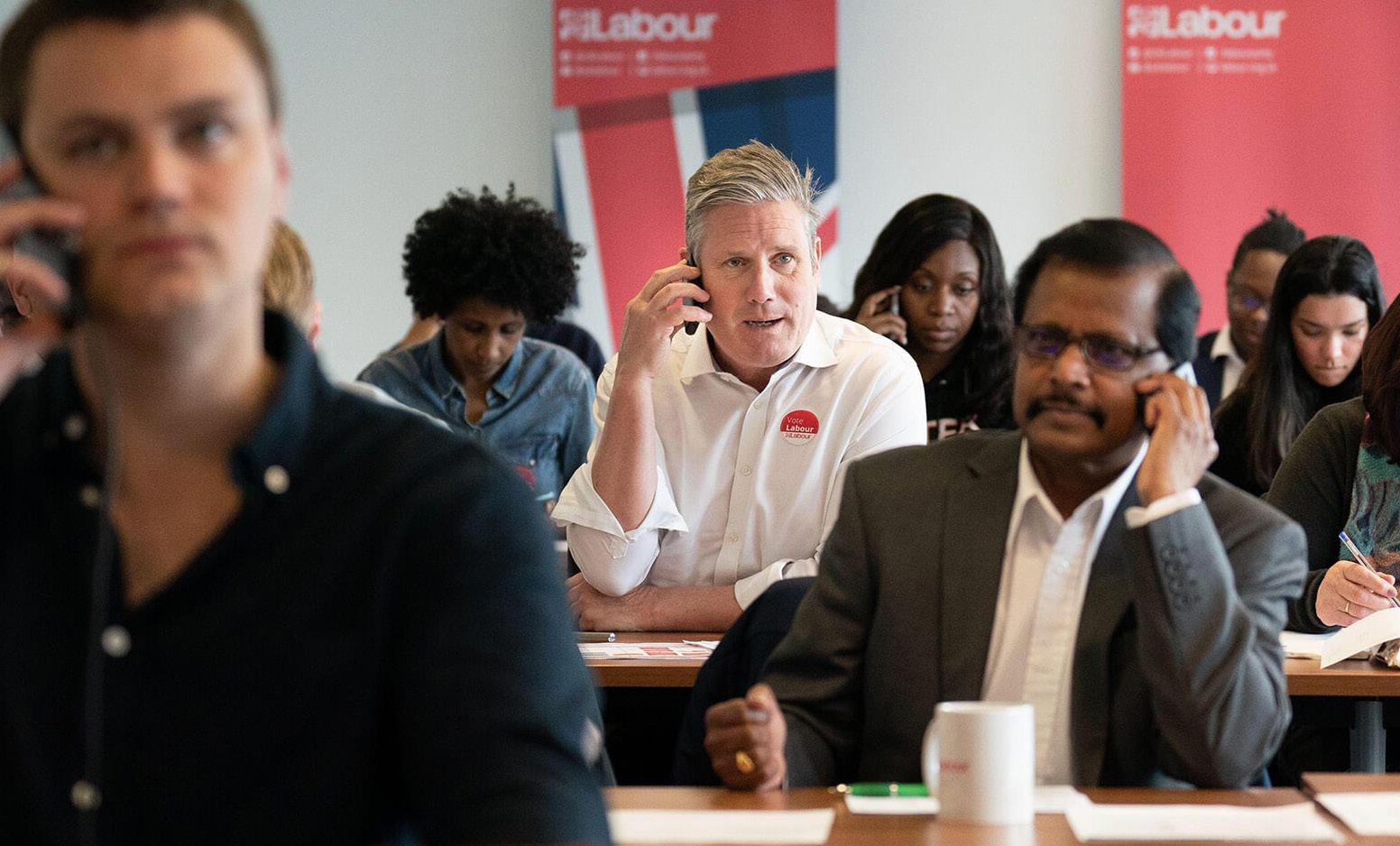
In Medway - home to Parliamentary constituencies crucial to Blair’s 1997 landslide such as Rochester, Gillingham and Chatham - Labour gained 17 seats to win the Council for the first time in 25 years. For decades Stoke on Trent was a bastion of Labour support - a city where it was often argued the Labour vote would be weighed, rather than counted. The post-Brexit years changed all of
that, with the Conservatives returning three MPs in the city in 2019. Last night saw major shifts again, with the party winning 29 of the Council’s 14 seats to take an overall majority.
And in the Home Counties, traditionally Conservative areas such as Windsor and Maidenhead, Brentwood, and Hertsmere, the Liberal Democrats, Labour and Independents made major gains, turfing the Conservatives out of power.
The picture is clear - Labour are making signifiant headway in key constituencies they need to win in order to secure a Labour government at the next general election.
66
LORD WALNEY
How reliable are all these individual battles for local councillors as an indicator of the national political picture? Does this mean we are solidly on track for a Labour government after the next general election? I am not so sure actually. Yes, they were the first electoral test for Prime Minister Rishi Sunak after a year of turmoil, including three Prime Ministers, a dramatic rise in inflation, and a crash in the pound. And they may be the final big electoral test next before the next general election. But for all the importance of local authorities in shaping their communities, and the value of a strong local representative at ward level, in many people’s minds in many areas this will have been a ‘free vote’ – a chance to register discontent with the Conservatives without needing to weigh up whether you would prefer the alternative of Sir Keir Starmer’s Labour party governing the country.

If I were still sat in Labour HQ I might be more worried about our position going into the election run-in, and Sir Keir Starmer’s resilience to what Tory election strategist Isaac Levido and his supersharp crowd will unleash on him over the next 12
months, than they might be worried about us. It is interesting talking to Conservative MPs in the ‘Red Wall’ seats that Labour lost at the last election. Many of them remain upbeat – largely because they pick up very little enthusiasm for Labour on the doorstep, just supreme annoyance with them.
There is a chance of course that the calamities of the last 12 months have created such a strong desire for change that they will want the Tories gone whatever the alternative. But it is clear from this campaign that the Tories have decided on a narrow route to clinging on:
Clear up as much as possible of the economic mess as they can. Focus on immigration, where the current mess and pressure may be a vulnerability but they think their instincts will chime with the public more than Labour – particularly in constituencies like Barrow and Furness that I used to represent Sow as much doubt as they can in the minds of the public on Sir Keir’s capacity as a leader.
Its an ugly strategy, and one which a strong Labour alternative vision can overcome – particularly given the current problems with which many of you are struggling. But the smarter people in the Labour camp have realised that they didn’t necessarily pass their own key test in these local elections . More important than the test of how many seats they could win, was whether they could connect with the public and inspire them with that alternative vision of change.
There are very good people in Labour determined to raise their game on that test and thinking hard about their policy offer. And there are signs that Rishi’s greater rigour on the big issues is having an effect. This is an important period ahead.
67
“ LORD WALNEY
Labour is not only making progress in areas where the party was already represented in strength, but making gains in parts of the country which are especially important.
Shadow Health Secretary Wes Streeting MP launches new Purpose Coalition Health Campaign
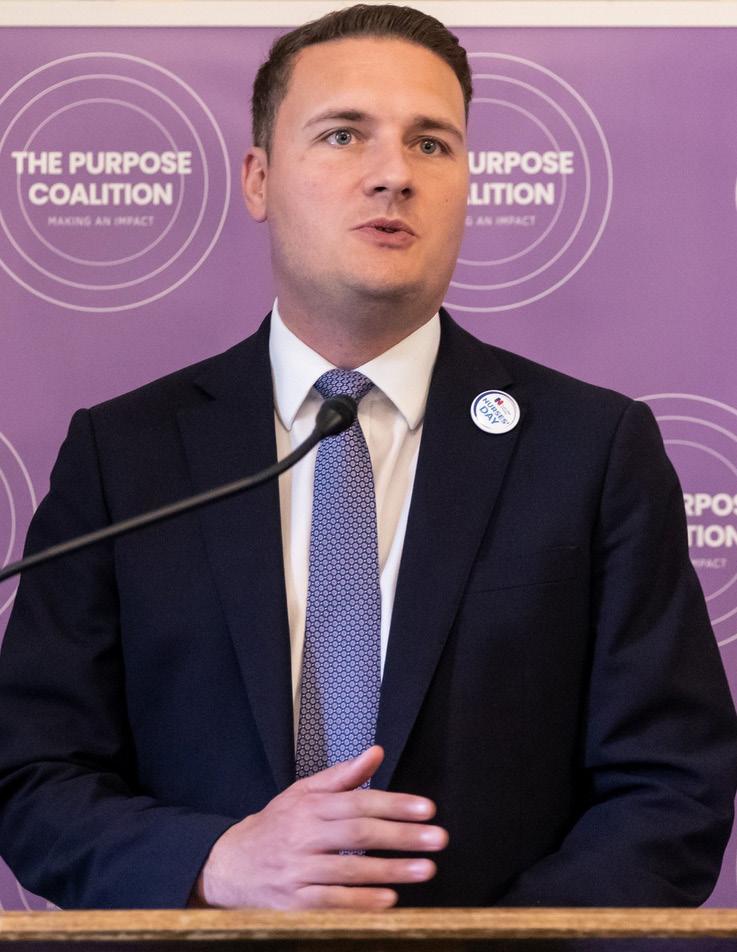
A MAJOR NEW PURPOSE COALITION ADVOCACY CAMPAIGN WAS LAUNCHED BY LABOUR’S SHADOW
SECRETARY OF STATE FOR HEALTH AND SOCIAL CARE WES STREETING MP, ALONGSIDE FORMER HEALTH MINISTERS RT HON DAME CAROLINE DINEAGE MP, RT HON ANNE MILTON, AND FORMER MEMBER OF SIR KEIR STARMER’S SHADOW CABINET NICK FORBES CBE.
The ‘Your local NHS: be at the heart of it’ campaign will bring together leaders from across the wider Purpose Coalition to focus on the opportunities that working for NHS Trusts can offer - as a place to work and a place to learn. The campaign will also aim to highlight the role of the private sector in supporting patients, reducing waiting lists, and boosting capacity in order to tackle health inequalities.
Health and wellbeing inequalities lie at the heart of improving social mobility and equality of opportunity, as the Marmot Report 10 Years On set out very clearly. Good health and wellbeing are often a precursor to a person being in a position to make the most of their talents and in work, feel they can consider taking the next step in their career.
The campaign will showcase the work that Coalition members are already doing across the country and demonstrate how their role is crucial for levelling up - making a positive difference not only for their staff but also having a tangible impact on their patients and the communities they serve. It is part of the wider Purpose Coalition campaign that will champion cross-party political engagement with Ministers
68 PURPOSE HEALTH COALITION
and Shadow Ministers and MPs alongside thought leadership on making opportunity more accessible, especially in the most deprived parts of the United Kingdom.
Speaking at the event, Labour’s Shadow Secretary of State for Health and Social Care, Wes Streeting MP said:
“Whether it’s building a stronger economy, making sure inclusive growth is shared by everyone, making sure that young people growing up in every part of the country from every background have access to the same opportunities, or building an NHS fit for the future, that requires us to work together, have really clear goals, and to make sure we’re making the best of everyone’s potential.”
“The NHS has a big role to play, not just in delivering healthcare but as an anchor institution in local economies, providing great jobs and opportunities to people, being good partners to other parts of the public sector, as well as the business and voluntary sector. It’s great that you’ve pulled people together in this Coalition to think in very broad and strategic terms about how we can build a better future and give everyone light at the end of the tunnel.”
Chair of the Purpose Health Coalition, Anne Milton, said:
“NHS staff are the backbone of our health service, helping to deliver good care and positive outcomes, either in clinical roles on the front line or in nonclinical roles with responsibility for making sure our services work. Recruitment and retention are undoubtedly challenging issues for NHS Trusts at the moment but they have the potential to offer huge opportunities to people looking for rewarding and life-changing careers, as well as to those looking for a career change. This campaign will shine a spotlight on the work that many NHS Trusts are doing across the country, not only to attract and retain staff from their communities but to improve health inequalities more broadly and keep people healthier outside of hospital, helping to drive down waiting times.”
During her address at the event, Dame Caroline Dineage MP, the former Minister for Social Care said:
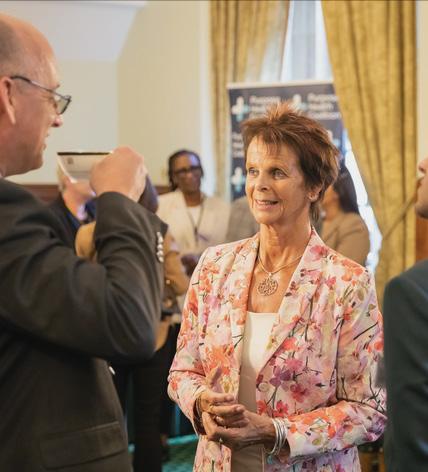
“Today’s launch is a really valuable opportunity to talk about how NHS leaders can come together and discuss some of the key issues that everybody is facing from staff retention and recruitment, to driving down hospital waiting times that are crucial to tackling health inequalities.”
MPs from across the political divide also attended the event to show their support, including Minister for Scotland John Lamont MP, Shadow Health Minister Karin Smyth MP and more.
The campaign will help to inform a report which will feature case studies from a number of NHS Trusts across the country from staff who are at different points in their employment journey as well as recommendations that will seek to address the recruitment crisis. There will also be an awards ceremony later in the year which will recognise and celebrate the achievements of individual staff.
Find out more at www.nhsheartofit.org
69
PURPOSE HEALTH COALITION
Addressing workload and workforce pressures in the NHS remainscritical. It will require innovative thinking and bold strategies, with clear goals to monitor progress.
“
How Labour can translate local success into a national victory
NICK FORBES CBE SERVED IN SIR KEIR STARMER’S SHADOW CABINET UNTIL 2022, AND NOW LEADS THE PURPOSE COALITION’S WORK WITH THE LABOUR PARTY THROUGH PURPOSE WITH LABOUR.
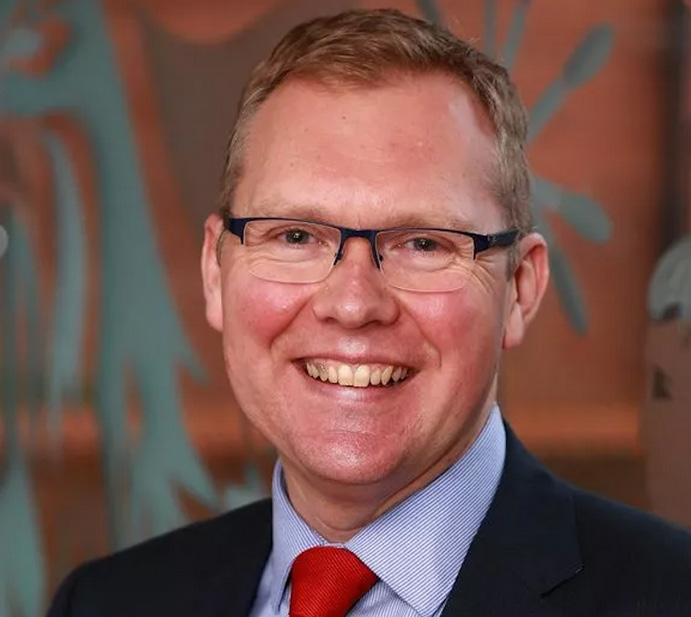
70
NICK FORBES CBE
While political commentary on local election results is always caveated with a warning against extrapolating them to predict general election outcomes, it doesn’t stop numerous column inches being published about what they mean for the prospects of the main political parties. With a general election due next year, there has been intense speculation about how each might fare based on May’s results.
In short, the results show Labour is on course to form a majority government, with Keir Starmer as Prime Minister.
For the first time since 2002, Labour is now the largest party of local government, and the party’s best local election result since 1997, with a nine-point lead over the Conservatives. Labour gained over 500 seats across England and control of another 22 councils. It won control of areas that will be crucial battlegrounds. In Kent, Labour took Medway - home to the parliamentary seats of Gillingham, Rochester and Chatham - crucial to Tony Blair’s three majority Labour victories, alongside key marginal constituencies of Dover, Swindon, Plymouth, Stoke on Trent and Blackpool. It won seats in the former red wall of the north and East Midlands, polling the most votes at local levels in places where the Conservatives had five-figure majorities at the last election. Crucially, it won seats in many areas that had voted Leave in the Brexit referendum - suggesting that the consensus built by Johnson in 2019 is breaking down and Brexit is no longer the main political driver of voting intention.
So the numbers are looking good. These are significant inroads and the Labour Party can be confident that it is heading in the right direction. It ran a campaign that was rightly focused on the cost-of-leaving pressures that households are facing up and down the country as inflation soars. That clearly spoke to voters but the Party can’t afford to be complacent. Creating a message of hope, and building confidence that Labour is the only party that can deliver, will be crucial. Despite all the promises made by the Conservatives, deep rooted challenges still exist. There is still a lack
of opportunity and too many regional inequalities in areas where people have often felt left behind for generations. That translates into under-attainment at school, more ill-health with shorter life expectancies and poorer productivity at a time when an economy, battered by the pandemic and a cost-of-living crisis, desperately needs to ensure that everyone is in a position to contribute to future prosperity.
The success of Labour in the local elections in many of these areas is an indication that voters value the authenticity of the Party’s commitment to levelling up and its success in areas of the country where Labour local authorities are already collaborating with local organisations on the ground to deliver a better quality of life for residents. That means making a positive impact on the issues that matter most to their communities and supporting the most vulnerable where it will make the most difference.
In February Sir Keir Starmer launched five national missions which will form the building blocks of a Labour manifesto. Centered on growth, clean energy, the NHS, crime and education, each mission has measurable goals. The Party’s new approach to governing will be marked by transparency, flexibility, innovation and a willingness to work with partners whose expertise and local knowledge will help to deliver progressive results.
Those are the hallmarks of an ambitious, purposeled approach aimed at maximising a positive social impact - but more work needs to be done to put some meat on the bones of this framework. There is a huge opportunity here for the Purpose Coalition, as our members have demonstrated with passion and commitment the difference that can be made. I was part of Sir Keir’s Shadow Cabinet for some years so I know him and his team well. They’re open to fresh ideas, based on practical experience on the ground - so I look forward to highlighting the leadership shown by Purpose Coalition members in the months ahead. By working together we can help shape a new approach which genuinely creates opportunity for all. And that would be a national victory we can all be proud of.
71
NICK FORBES CBE
By working together we can help shape a new approach which genuinely creates opportunity for all. And that would be a national victory we can all be proud of.
“
Political winds are changing - so how should Purpose-led business respond?
THE LAST FEW YEARS HAVE BEEN TUMULTUOUS IN BRITISH POLITICS TO SAY THE LEAST. A PANDEMIC, FOUR PRIME MINISTERS IN AS MANY YEARS, THE WAR IN UKRAINE AND SEVERE ECONOMIC DIFFICULTIES.
Thinking about the future of politics on the day after Boris Johnson’s triumphant General Election victory in 2019, or his unprecedented win in the 2021 Hartlepool by-election, it would be hard to imagine anything other than another Conservative decade. That’s what the former Prime Minister thought too. In September 2021, the Times reported that Johnson wanted to outlast Thatcher’s 11 year premiership. Little would he know it would all be over nine months later.
Whichever party you support, you can’t ignore the facts. Today’s opinion polling points to nothing
other than a Labour victory in next year’s General Election. The party has led in national polls since the beginning of last year, and the party is remodeled in Keir Starmer’s image. Corbyn has been barred from standing as a Labour candidate, his allies are being de-selected, and left-leaning candidates are - by and large - being blocked from standing in constituency selections.
Most worryingly for Conservatives - Labour now leads amongst key voter groups. In the ‘Blue Wall’, the so-called southern, home counties seats that have been the bedrock of Tory support for decades,

72 MATTHEW MCPHERSON
SPONSORED CONTENT
Labour now leads the Conservatives by seven-points. Labour came third in these seats in 2019, with the Conservatives taking almost fifty per-cent of the vote.
Many organisations - understandably - want to stay out of politics, but political decisions, whether made in Westminster or the West Midlands, impact us all. Understanding the approach of policy makers, and informing them when making their decisions is vital to delivering the change you want to see.
In recent months, the Purpose Coalition has held a whole host of policy roundtables, receptions and briefing events with key Ministers and Shadow Ministers, from the launch of our NHS: be at the heart of it campaign with Shadow Health Secretary Wes Streeting and former Health Minister Dame Caroline Dinenage, to Shadow Business and Industry Minister Bill Esterson launching our joint Entrepreneurial Revolution report with SME for Labour, roundtables with Secretary of State for Science, Innovation and Technology Rt Hon Chloe Smith, Social Mobility Minister Mims Davies, and Shadow Health Minister Liz Kendall.
Naturally, politicians disagree - they all have different approaches to the key policy issues of the day, but when it comes to outcomes, they do generally agree. Through all our events - one theme that has shone throughout is that of boosting opportunity.
It’s a crucial issue for our country - we need to get more people into employment, too many people feel left behind in the economy, getting on the housing ladder is harder than ever for young people,
At the advent of the year, Labour Leader Sir Keir Starmer set out 5 ‘Missions’ for the party, should they form the next government - achieving the highest growth in the G7, building and NHS fit for the future, make Britain a clean energy superpower, make Britain’s streets safe, and - crucially for the work of the Purpose Coalition - break down barriers to opportunity at every stage.
For those familiar with British political history, the missions bear resemblance to Blair’s ‘pledge card’ ahead of the 1997 General Election - when the party went on to score a landslide victory. These ‘Missions’ will be at the heart of the next Labour manifesto, and - should Starmer win - the next Labour government. For organisations looking to engage with the Labour Party and understand their thinking, aligning your work to these ‘Missions’ is essential.
That’s why the Purpose Coalition has set up Purpose with Labour, Chaired by Nick Forbes CBE, who served in Sir Keir Starmer’s Shadow Cabinet until 2022, and now leads the Purpose Coalition’s work with the Labour Party. Through our vast programme of roundtables, events and visits, the most innovative Purpose Coalition organisations are helping to set Labour’s agenda, and inform their key Shadow Ministers ahead of the next election.
If we’ve learnt anything from recent years, it is that politics is unpredictable, but all the evidence points to changing political winds - and now is the time to engage.
Matthew McPherson, Director of Public Affairs, This is Purpose
MATTHEW MCPHERSON 73
Most worryingly for Conservatives - Labour now leads amongst key voter groups
“
SPONSORED CONTENT
The University of Chester launches its Levelling Up Impact Report
THE UNIVERSITY OF CHESTER HAS FORMALLY LAUNCHED ITS LEVELLING UP IMPACT REPORT TO SENIOR ACADEMICS, POLICY MAKERS, PLUS LOCAL GOVERNMENT OFFICIALS AND BUSINESS LEADERS AT THE LAW SCHOOL’S NEW BASE IN THE WHEELER BUILDING.
The report has been produced in partnership with the Purpose Coalition, which was established to bring businesses and universities together to work towards improving equality of opportunity and social mobility in the UK.
It details how the University, through its Citizen Student strategy, involves and encourages young people from all backgrounds to pursue higher education.
Highlighted in the report is the outreach work Chester Law School students undertake to support underrepresented and vulnerable members across the Cheshire region.
These projects include the Chester Legal Advice Centre – where student volunteers work with professional mentors to advise local community clients on legal issues – and the Chester Community Law Project, a volunteering initiative which includes students working in partnerships with local and national organisations to provide guidance and activities related to legal and rights-based projects such as asylum, education, employment, and families.
Vice-Chancellor Professor Eunice Simmons said: “The University is proud of its achievements in promoting diversity and equality for its staff and students, as well as the wider public. Our Levelling Up Impact Report shares our vision of growing and developing a University that is at the heart of its local community and we look forward to continuing working with the Purpose Coalition and a range of partners to move this social justice agenda forward.”
Ruth Sutton, Head of Law, added: “The Chester Law School is very proud to be at the forefront of supporting our local and national communities with legal assistance – while at the same time providing excellent opportunities for students to experience the law in action, and to put in practice what they learn in class.
“We are so happy with our move to the legal heart of Chester, right next to the Crown Court. Our new moot courtroom, named the Elgan Edwards Suite in memory of the former Hon Recorder of Chester, and member of the University Council, is a very special resource.”
Adam Crane, Access and Participation Manager at the University, continued: “Universities play a critical role in driving social mobility and levelling up. Our commitment to giving everyone the opportunity to reach their full potential, regardless of their background is a key part of what keeps us moving forward.”
The report can be viewed at https://www.purposecoalition.org/
74
UNIVERSITY OF CHESTER
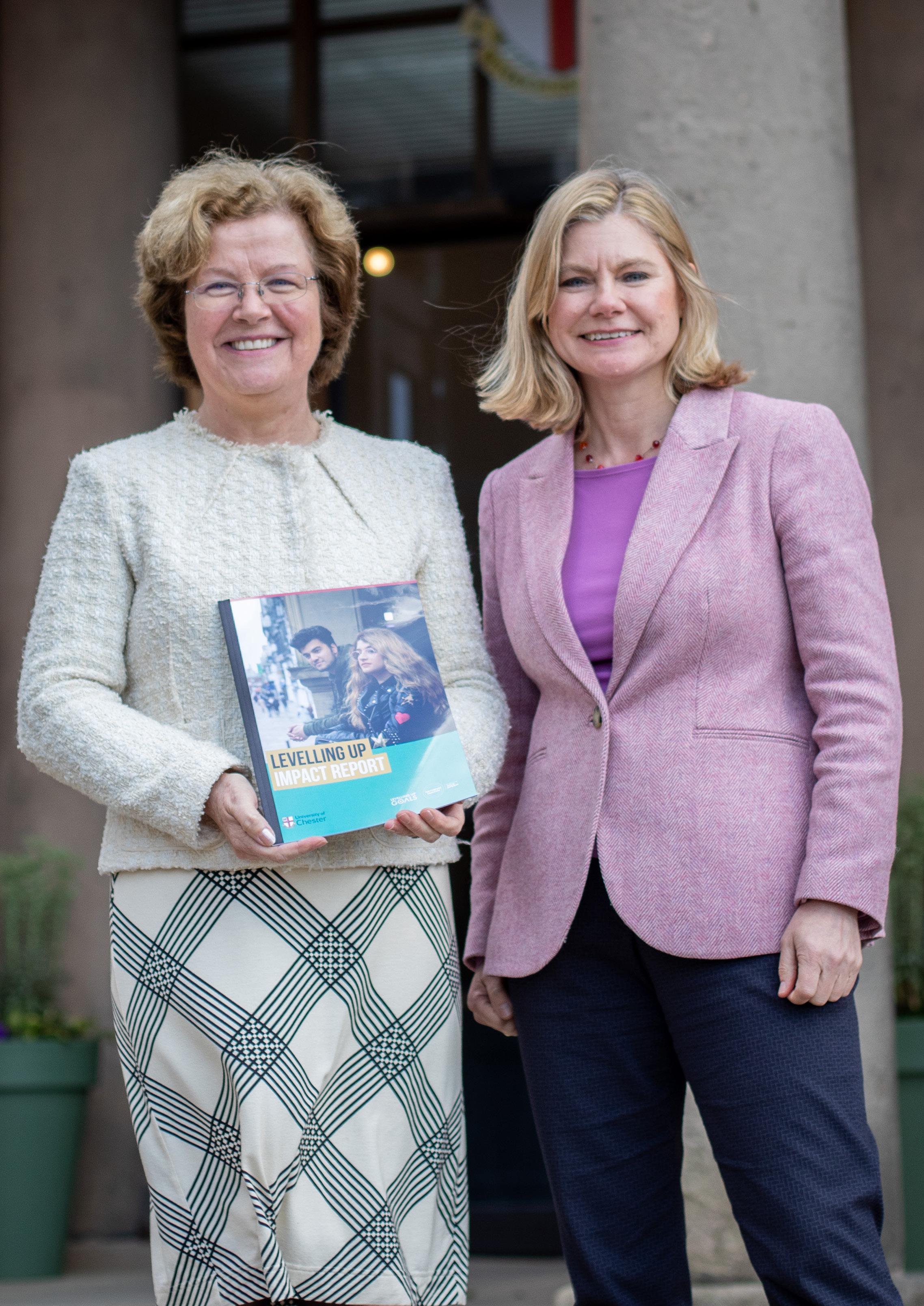
75 UNIVERSITY OF CHESTER
Building the workforce the NHS deserves
AS THE MAIN POLITICAL PARTIES BEGIN TO LOCK HORNS ON WHAT ARE LIKELY TO BE THE BIG MANIFESTO ISSUES OF A GENERAL ELECTION THE NHS REMAINS THE HOT TOPIC, WITH WORKFORCE RECRUITMENT AND RETENTION AT THE TOP OF THE LIST.

76 PURPOSE HEALTH COALITION
The pandemic placed unprecedented demands on our health service and also exacerbated existing health disparities in the population. And for the NHS, this is against a backdrop of having to respond to significant population growth, an ageing population and an increasing proportion of people living with multiple chronic health issues. The complexity and volume of work has grown, alongside increasing public expectation that technological advances can be used to treat previously untreatable conditions. The Chancellors’ Autumn Statement confirming that the Government will produce an independent assessment of workforce needs across the NHS over the next five, ten and 15 years was broadly welcomed but, as yet, there is still no sign of a long-term strategy.
We know that record numbers of staff are leaving the NHS, with workplace stress, sickness and burnout, and pay restraints all commonly cited as the cause. Despite the fact that NHS figures for England show that more people joined the NHS than left it over the past decade, the number of vacancies has increased in recent years. In December 2022, there were 124,000 vacancies across the NHS, with 43,600 of those in nursing. NHS staff banks and external agencies plug the gaps but at a cost - in 2020/21 NHS England spent £2.44 billion on agency staff. The Government says it is on track to meet its target for 50,000 more nurses by the end of March 2024 although other health experts have expressed concerns that the demand for nurses is increasing faster than the supply. The goal of 26,000 more primary care professionals also appears to be on course but the problems raised by a declining number of GPs persist.
As part of its response, the Government recently launched its primary care plan. This included investment in telephone systems and staff training at surgeries alongside an expansion of the role of pharmacists, with less bureaucracy for GPs to allow them more time with patients. But increasing the number of full time equivalent GPs in the short and longer term by training and retaining them will continue to be necessary. The NHS needs to retain the entire range of staff – nurses, trainee doctors, pharmacists, midwives, health visitors, support staff, therapists and scientists - by making sure all staff are properly supported in their workplaces .
It is also likely that an apprenticeship system will be introduced as an alternative to the traditional medical degree route, perhaps as early as this September. NHS Trusts will be given funding to run five-year apprenticeships which will allow doctors and nurses to earn while they learn. Nurse apprenticeships have been running for some years,
albeit not without problems. Financing the staff backfill costs whilst nurse apprentices undertake study has been a challenge for many NHS Trusts but up to one in ten doctors and a third of nurses could be trained through this vocational path in the coming years under the NHS workforce plan. Some health experts have raised concerns about how medical apprenticeships might be run, the impact on those students following the traditional route, and the capacity to scale up. However, the scheme could help to encourage those who may be deterred by the £80k average debt currently incurred by medical students.
Meanwhile, the Labour Party has said it will produce a 10-year plan to change and modernise the NHS if it is elected at the next general election. This would include a long-term workforce plan aimed at doubling the number of medical school places and creating 10,000 more nursing and midwifery clinical placements every year. Labour Shadow Health Minister, Wes Streeting, recently attended the launch of a Purpose Health Coalition campaign, Your local NHS: be at the heart of it, which highlights the jobs and opportunities the NHS can offer. This showcases the work many NHS Trusts are already doing to improve the situation for their staff, patients and communities. The Coalition has been working with Trusts and other health sector organisations to explore the impact of their solutions, including on recruitment and retention. By sharing best practice and ideas and working crossparty, it can help shape policies that will make a difference.
Addressing workload and workforce pressures in the NHS remains critical. It will require innovative thinking and bold strategies, with clear goals to monitor progress. Political parties need to listen and reflect the needs of the NHS’s most precious asset – its staff – if it is going to win the hearts and minds of voters and build an NHS fit for the twenty-first century.
77 PURPOSE HEALTH COALITION
Addressing workload and workforce pressures in the NHS remains critical.
“
Ramsay Health Care UK setting the standard on social impact with new report launch
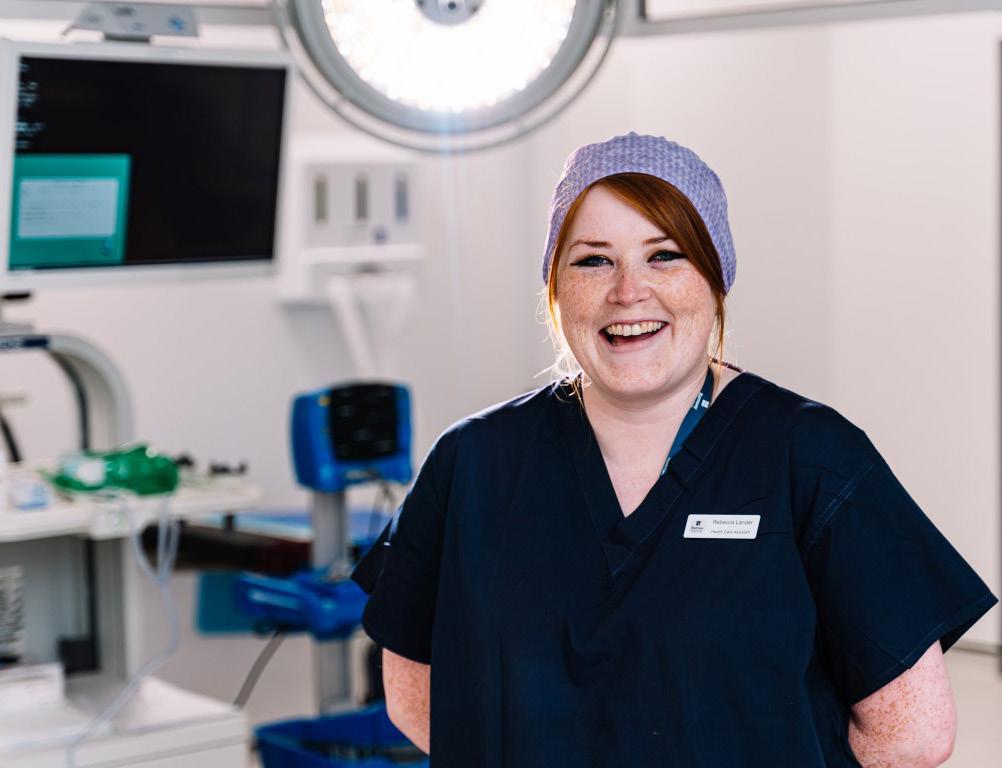
FROM THE EXPERIENCE OF THE PANDEMIC, TO RISING HEALTH INEQUALITIES, HEALTHCARE ORGANISATIONS HAVE AN INCREASINGLY IMPORTANT ROLE TO PLAY IN SOCIETY.
Sadly, the inequalities that faced the country prepandemic have only worsened, with those living in the most disadvantaged communities still being the individuals hardest hit by economic, social and health events. The discrepancies in both life expectancy and healthy life years between wealthier communities and those living in more deprived communities, is stark.
78 RT HON ANNE MILTON
The figures on health inequalities are a wake up call to all. We need to change our approach to how we view, and deliver health improvements. We need to more away from the traditional approaches to improving health outcomes and preventing poor health particularly in a society where the proportion of older people is growing.
During my time as Minister for Public Health I saw first handthe real challenges that our health system is under - and it is going to require those new approaches and methods to respond to these challenges.
Our Purpose Health Coalition is focussed on working with organisations who want to work in different ways, improving efficiency and using technology. I was was particularly proud to launch our Impact Report with Ramsay Health Care UK in South Wales, alongside my colleague and Purpose Coalition Chair Rt Hon Justine Greening. The report sets out how Ramsay is innovating, and going further for its patients, colleagues and communities.
Ramsay Health Care is in a particularly unique position as the largest independent healthcare provider in the country - with over 35 sites across England. It’s comprehensive partnerships with the NHS, large-scale workforce and connection’s with the local community means it has the potential to affect profound change across a range of our Purpose Goals.
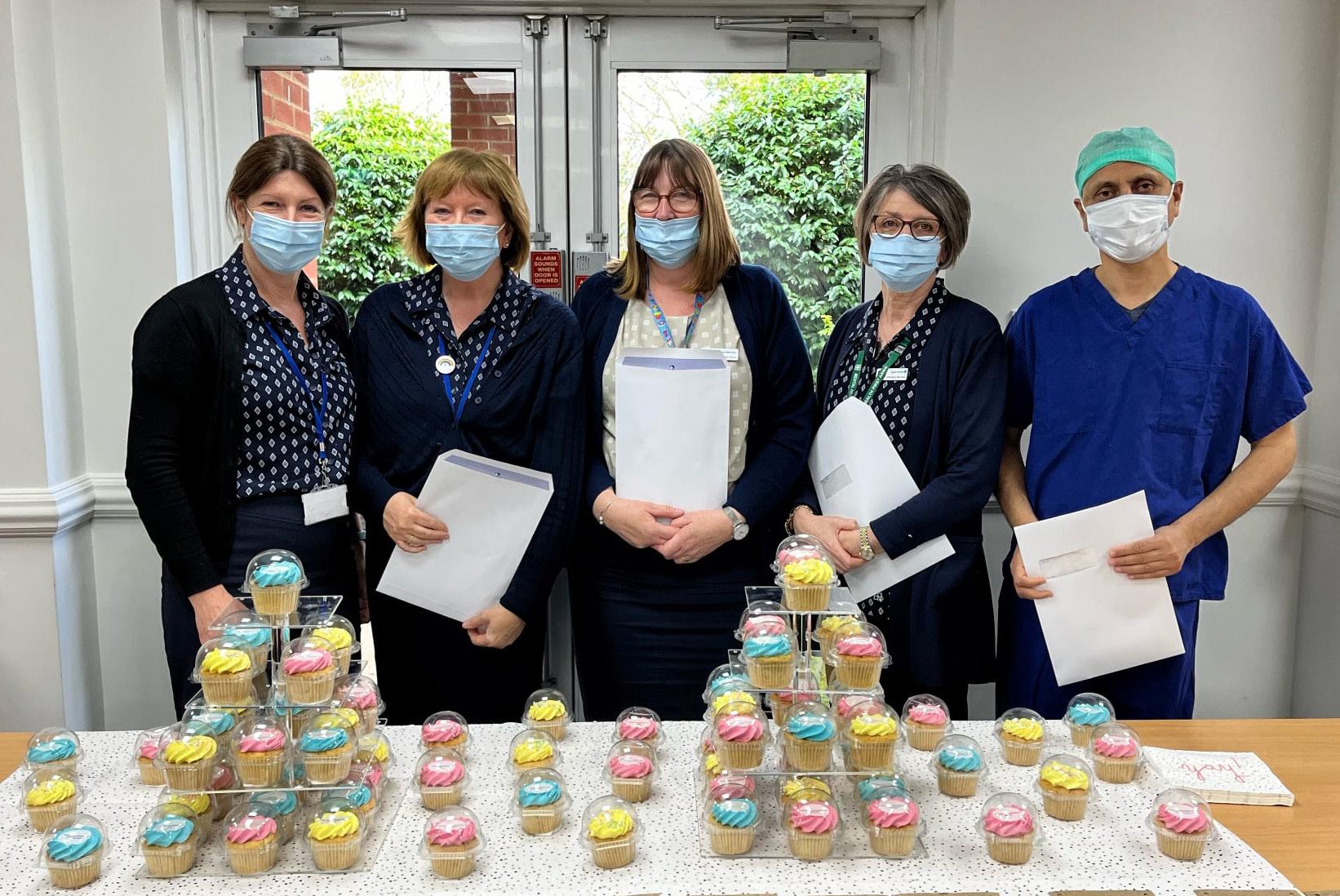
Ramsay Health Care is also delivering best-in-class patient outcomes through large-scale investment in technology. For its colleagues and the communities it serves, Ramsay Health Care is leveraging its work against the comprehensive Ramsay Cares strategy. This ensures that it is continually reviewing and improving its work to improve its social value.
As one of the leading independent healthcare provider Ramsay Health Care in partnership with the NHS, are showing that business can be a force for good. They are leading the way making sure that ending inequalities and improving social justice become a cornerstone of all that they do. Where they lead others must follow to finally make sure we have a fairer more equitable society we all want to see.
79
RT HON ANNE MILTON
Rt Hon Anne Milton, Chair of the Purpose Health Coalition
Small Business and Enterprise Minister joins Purpose Coalition leaders and Young Enterprise for applied learning roundtable.
MINISTER FOR SMALL BUSINESS AND ENTERPRISE, KEVIN HOLLINRAKE MP, JOINED FORMER EDUCATION SECRETARY RT HON JUSTINE GREENING AND A TEAM FROM YOUNG ENTERPRISE, INCLUDING CHIEF EXECUTIVE SHARON DAVIES, ALONGSIDE LEADING PURPOSE COALITION BUSINESSES TO EXPLORE THE IMPORTANCE OF APPLIED LEARNING, AND EQUIPPING YOUNG PEOPLE WITH THE SKILLS THEY NEED TO GET ON IN LIFE.
The roundtable was an opportunity for the Minister to learn more about the work of private sector Purpose Coalition organisations and the benefits of Young Enterprise for teachers and young people across the UK.
The joint roundtable, held in association between the Purpose Coalition and Young Enterprise, also explored ways in which organisations can support and improve enterprise education in schools and colleges to unlock the skills potential of young people. The event brought together senior leaders from Purpose Coalition organisations, including Virgin Money, Sodexo, Centrica and Adecco.
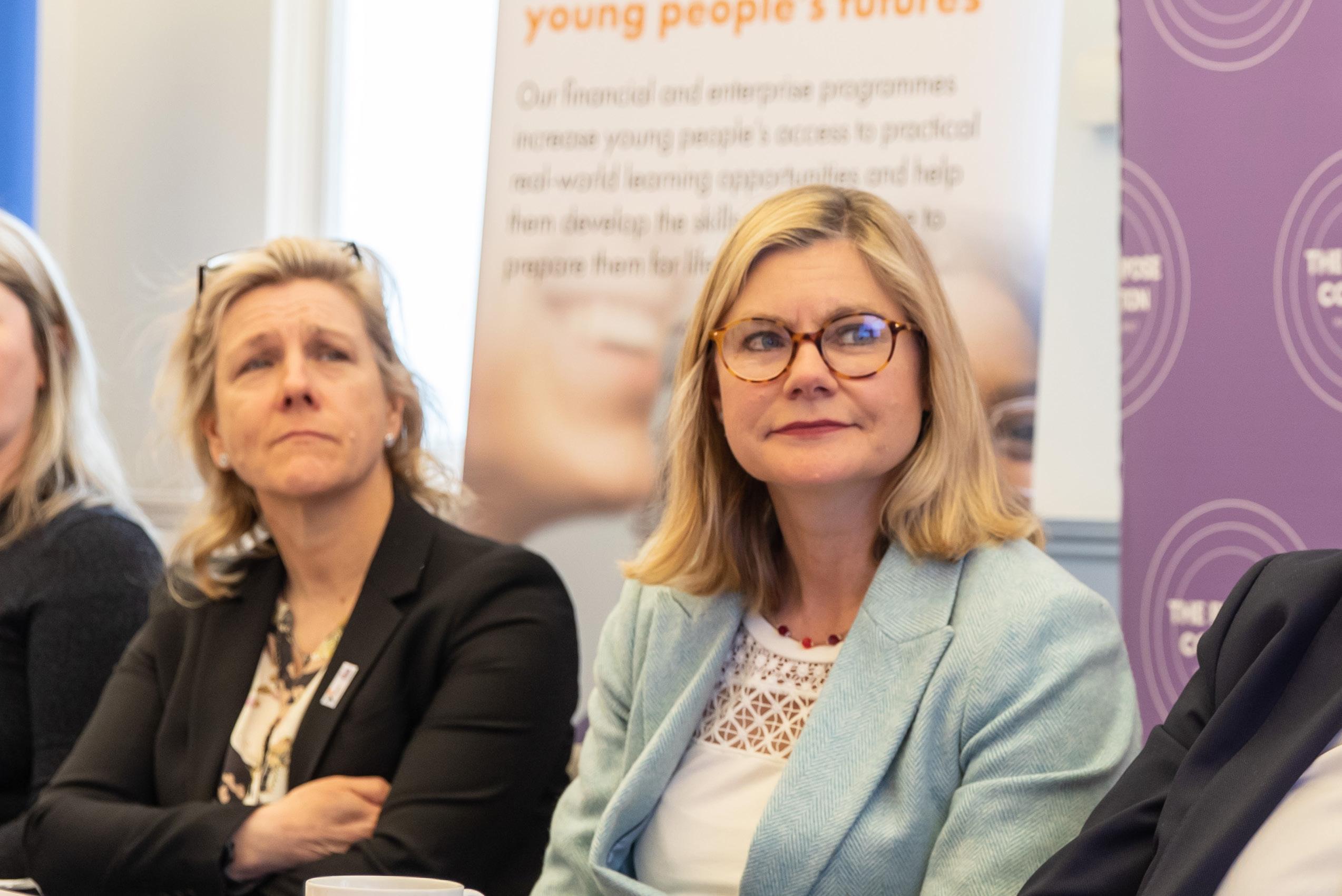
80
YOUNG ENTERPRISE
Applied learning is now particularly important in a post-pandemic landscape, and allows students to apply their knowledge and skills from the traditional classroom setting to real world projects. Earlier this year, Young Enterprise published their new report ‘What Applied Learning Really Looks Like’, highlighting case studies to show teachers and policymakers how applied learning can be integrated into school timetables and across the curriculum.
Mina Karshala, now on the Young Enterprise Board joined the roundtable, and is a 2013 Young Enterprise alumna who took part in the Start Up Programme whilst studying for her Leadership and Management degree.
Through hands-on employability, enterprise and financial education programmes, Young Enterprise works directly with teachers, parents and businesses to help reduce youth unemployment, and help young people realise their potential beyond education, empowering a generation to learn, work and live.
Chief Executive of Young Enterprise, Sharon Davies said:
“Since 1962, over 7.2 million young people have accessed Young Enterprise Financial and Enterprise Programmes and Services. As we enter our 7th decade of supporting young people, access to opportunity has never been more important in helping them to build their futures. Especially, in the current economic climate where real-world learning opportunities are key to developing young peoples’ confidence, attitudes, and employability skills.
Our report released earlier this year on ‘What Applied Learning Really Looks Like’ showed that 96% of teachers believe that being able to apply learning in real-world contexts is important.
Through this roundtable in partnership with Purpose Coalition, we urge policymakers, educators, communities, and the government to recognise the fantastic work already taking place in schools and work together on a renewed push to increase opportunities for young people to apply their learning in real world settings across the country.”
Chair of the Purpose Coalition, Rt Hon Justine Greening, said:
“Entrepreneurship not only generates business and jobs for communities, it also encourages aspiration in individuals. It can help boost levelling up and improve skills training.
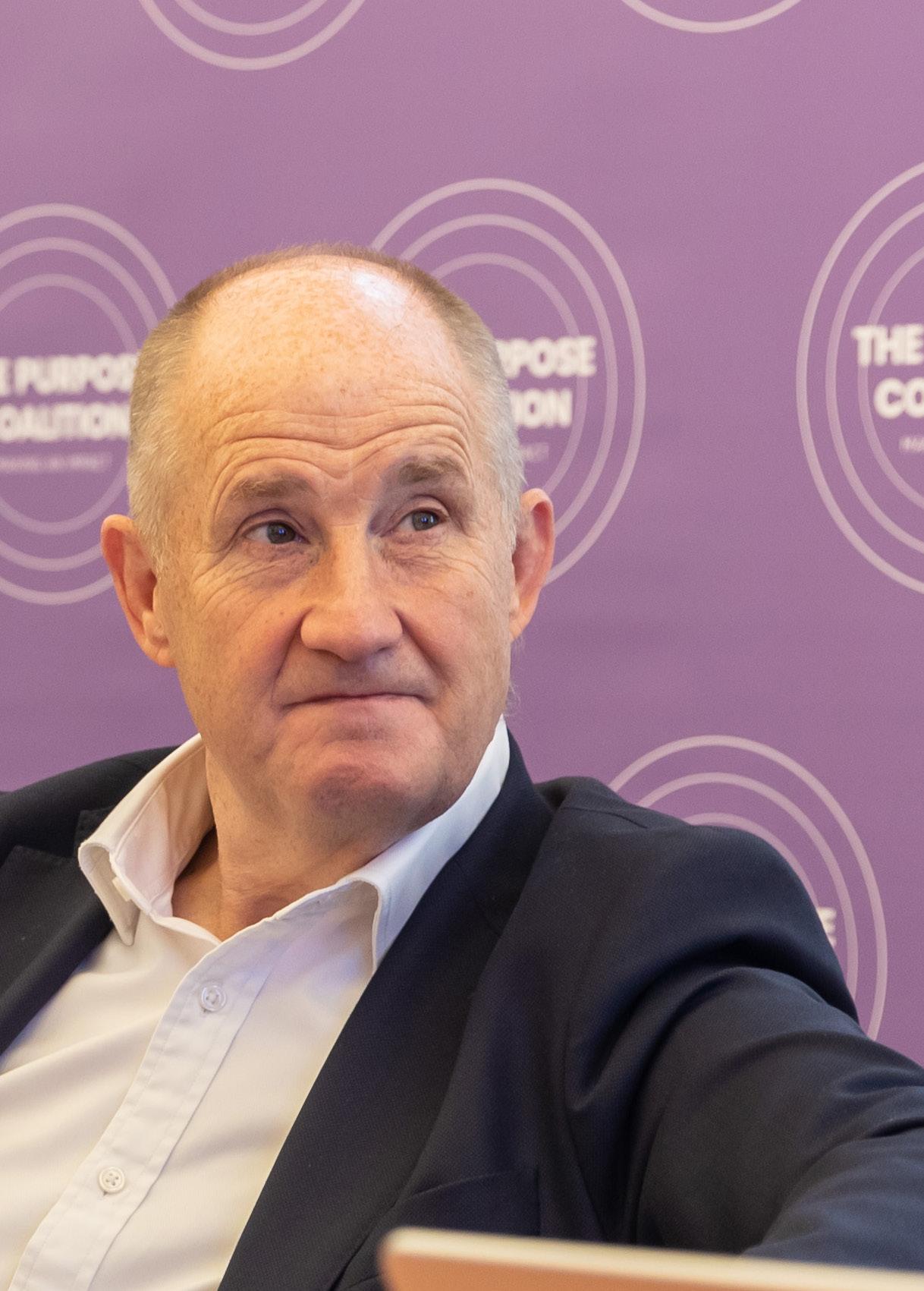
Since 1962, Young Enterprise has empowered generations to learn, work and live, and it’s been brilliant to host today’s event alongside Chief Executive Sharon Davies, and to welcome the Minister for a practical, real-world discussion.
Young people today grow up in a highly connected environment with access to new technology, new markets and new ways of communicating, but all too often feel they lack the skills, experiences and networks to take advantage of them. When government, business and organisations like Young Enterprise work together, we can improve applied learning, boost skills, and deliver a shift in mindset where entrepreneurship becomes the norm.”
YOUNG ENTERPRISE 81
Entrepreneurship not only generates business and jobs for communities, it also encourages aspiration in individuals
“
Launch of groundbreaking employer survey on social mobility to open up ‘black box’ of tracking equality of opportunity in careers
LEADING SOCIAL MOBILITY CAMPAIGNER AND FORMER EDUCATION SECRETARY, RT HON JUSTINE GREENING HAS JOINED FORCES WITH THE CENTRE FOR INEQUALITY AND LEVELLING UP AT THE UNIVERSITY OF WEST LONDON TO LAUNCH A GROUNDBREAKING SURVEY ON SOCIAL MOBILITY TRACKING ATTITUDES OF EMPLOYERS.

The survey aims to find out employer attitudes towards tracking socio-economic background of employees and how many are tracking the impact of their opportunities on social mobility of their employees.
The new survey will ask employers whether they are tracking employee social mobility data, what their plans are to do so and what the barriers and challenges they see to putting in place effective tracking, for example not knowing the right questions, poor understanding of the issues or concerns over staff response rates.
Employers can track the socio-economic diversity of their employees using standard questions developed by the UK Government Cabinet Office in
82
XXX
2017 and updated by the Social Mobility Commission in 2021.
Greening is urging employers through her Equality of Opportunity Coalition campaign to start tracking the social mobility data for their employees. The data could provide crucial insight on the levels of access to opportunity and how open economic opportunities are to people from all backgrounds. Yet to date, tracking social mobility data of employees has not been commonplace across UK employers. The survey wants to find out why not and how to encourage greater adoption.
Greening believes this is crucial for driving improved social mobility in the UK:
“As Education Secretary, I could use data insight on the progress of children and young people from disadvantaged backgrounds and on Free School Meals to target DfE efforts to close educational gaps. However when people leave the education system and enter the workplace, we lose all track of their progress in careers. It means a huge education investment but with no sense of actual outcomes accessing opportunities.
What gets measured gets done, so to drive stronger social mobility means getting employers tracking the key social mobility questions for their staff. Understanding how to do that from this survey will be a gamechanger.”
Professor Graeme Atherton of the Centre for Inequality and Levelling Up says:
“It is vital that organisations understand who their workforce is so they can support them to achieve their potential. This project will unlock new knowledge that will contribute to addressing inequality and promoting economic growth in the UK.”
The short survey is being sent to HR professionals, has 14 questions and is open until mid-September with initial results collated and shared in Autumn 2023.
Greening leads the Purpose Coalition of employers - many of which are already committed to tracking and reporting the socio-economic diversity of their employees in the UK’s first wide scale pilot of its kind.
The Equality of Opportunity Coalition are employers who are committed to monitoring and sharing their socio-economic data. The work will also enable employers to benchmark themselves and share best practice on socio-economic tracking, providing a wider picture of social mobility and career progression across different sectors.
The organisations involved include employers as diverse as the Co-op Group, UK Power Networks, Aldermore Bank, the BBC, the University of Northampton and Essex County Council, amongst a growing number of others.
83 XXX
“
What gets measured gets done, so to drive stronger social mobility means getting employers tracking the key social mobility questions for their staff.
Sodexo showcases positive social impact in new report
SODEXO HAS PUBLISHED ITS 2023 SOCIAL IMPACT REPORT, WHICH HIGHLIGHTS PROGRESS AND OUTCOMES DELIVERED AGAINST THE COMMITMENTS LAID OUT IN ITS SOCIAL IMPACT PLEDGE. EACH OF THESE COMMITMENTS WERE PLEDGED IN 2021, AS PART OF A THREE-YEAR SOCIAL VALUE STRATEGY TO DELIVER REAL CHANGE WHICH IMPROVES QUALITY OF LIFE FOR SODEXO’S PEOPLE AND IN THE COMMUNITIES WHERE THEY LIVE AND WORK.
social value and make a positive difference in the communities where it operates.
The 2023 Social Impact Report highlights several key achievements across each of the four impact pathways, including:
PEOPLE
A comprehensive apprenticeship programme, with circa 900 apprentices currently working across the UK and Ireland. While Sodexo is a Ban the Box organisation, certain roles require disclosure. In 2021 and 2022, 82% of job applicants with positive Disclosure and Barring Service (DBS) applications successfully secured employment.
PLANET
The report, published annually, provides a comprehensive overview of how Sodexo is making a positive difference across the UK and Ireland. It provides compelling data and real-life examples of what social impact the company has delivered and where it’s relevant and proportionate to do so, how much Social Return on Investment (SROI) it has created for communities using the National Themes, Outcomes and Measures (TOMs) framework where applicable.
Sodexo’s Social Impact Pledge serves as an ethical manifesto, encompassing carefully selected commitments that aim to foster a healthier, greener, safer, and more prosperous society. These commitments are strategically mapped across four impact pathways crucial to Sodexo’s business: our People, Planet, Places, and Partners. By focusing on these areas, Sodexo strives to create significant
Sodexo has accelerated its ambition to achieve net zero across its value chain by 2040, five years ahead of the previously set target.
PLACES
Over 4,000 hours of volunteering have been provided in the community through the Sodexo volunteering programme over the last year.
PARTNERS
Sodexo remains committed to supporting small and medium-sized enterprises (SMEs), with 57% of its overall spend in the UK and Ireland being directed towards SME and VCSE suppliers.
In 2022, Sodexo colleagues recorded 800 hours of skills-based volunteering for PILOTLIGHT, a charity that amplifies the impact charities, business and individuals can bring to make a better world.
84
SODEXO
Commenting on the report, Sean Haley, CEO of Sodexo UK & Ireland, said:
“When we launched our most recent Pledge, we vowed to be transparent about how we were performing against the commitments we made.
In this report, we do just that – focused on understanding the difference we are making for individuals and across wider communities. We are, however, not complacent – we recognise there is always more we can do.
But we know that to be truly purpose-led, any organisation is limited on how much they can achieve in isolation. As such, we are extremely proud of the ecosystem we continue to build with our clients, suppliers, government and the many charities and third sector organisations who collectively support us in driving the positive impact that improves quality of life.
We are immensely grateful to our colleagues who through their everyday work delivering excellent services, are also able to deliver social impact and encourage others to do so too. We know all businesses have a direct responsibility to positively contribute to society and improve the communities where they operate, we take this seriously and will continue to ensure this is embedded in all that we do.”
Rt. Hon Justine Greening, Former Secretary of State for Education & Chair of the Purpose Coalition, added:
“As a leading member of the Purpose Coalition, Sodexo doesn’t just talk the social mobility talk, it walks the walk.
The Sodexo Levelling Up Impact Report published last year showcased its ambitious and wide-ranging approach and highlighted some of the ways it could go even further, building on its fantastic Social Impact Pledge. Crucially, it has gone a step further and published an update on that purpose-led work for 2023.
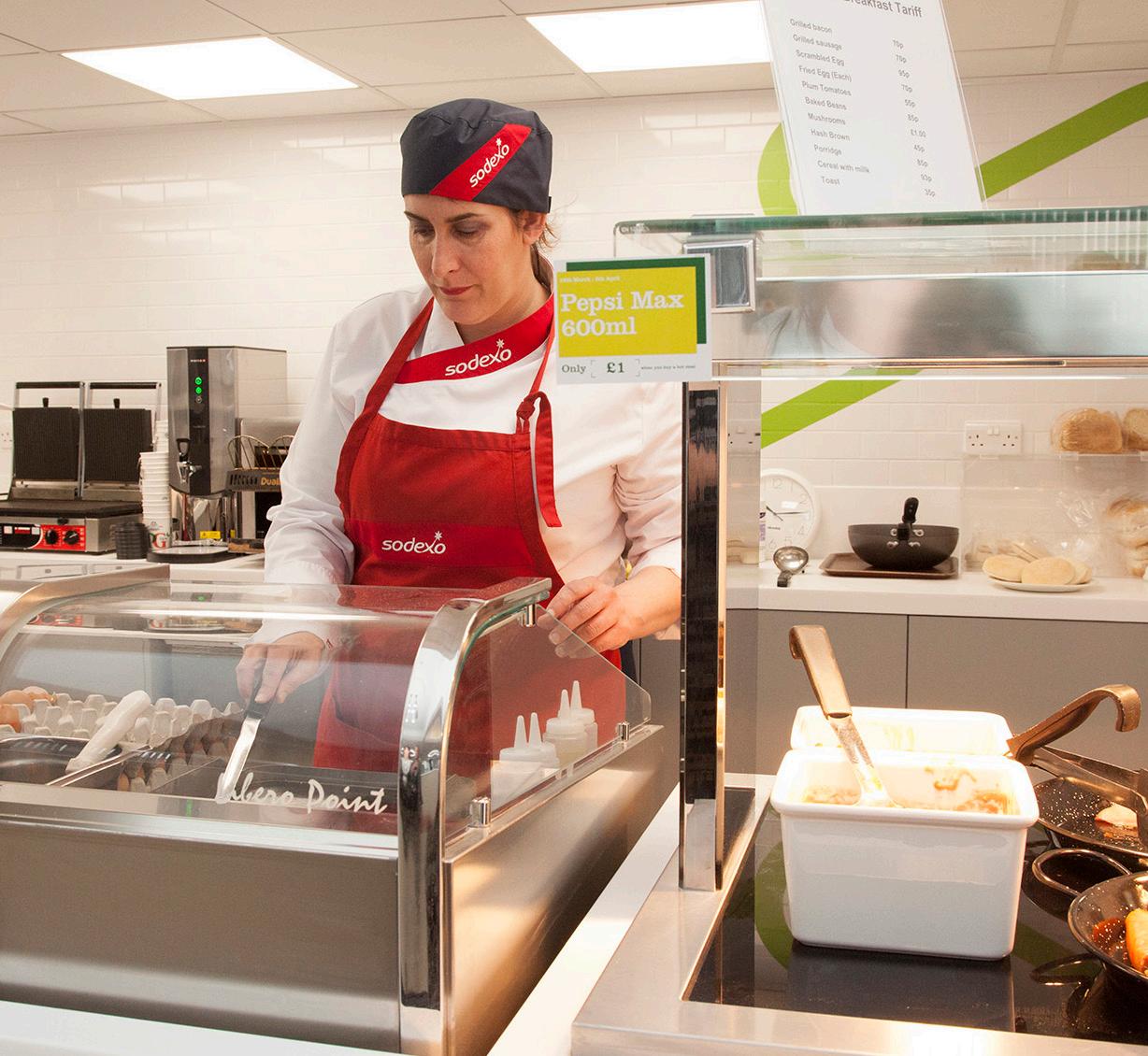
Its willingness to measure its progress means that it can target its work more effectively to where it will make the most difference.The Social Impact Report shows that it is continuing to create opportunities for its colleagues, its customers and its communities.”
Sodexo’s commitment to social impact spans several years, with the 2021 launch of its Social Value Pledge marking its fourth iteration. First published in 2015, the business has faithfully reported on its progress against the pledges each year, demonstrating with evidence and examples the positive impact it is creating.

85 SODEXO
From Southampton to Parliament
university squash team, that her career began. She said: “I am hugely privileged to be receiving an honorary doctorate, especially from the university that opened up so many opportunities for me. “Being at Southampton helped me to develop a way of thinking about, analysing and breaking down problems, and being open to other ideas. Having an open mind is crucial to being able to make the most of yourself and the opportunities that life throws at you.”
SOCIAL MOBILITY AND INCLUSIVITY
Justine praised the university’s work on inclusivity in higher education, in particular its active Social Mobility Network and Ignite Your Success, an alumnifunded programme that support to students from underrepresented backgrounds.
Former minister Justine Greening credits her success in no small part to the University of Southampton, where she returned as one of eight honorary graduates.

Since graduating from Southampton in 1990 with a first class honours degree in Business Economics and Accounting, Justine has become a household name as an MP, tackling some of the biggest projects and challenges facing society.
As Secretary of State for Transport, she oversaw transport arrangements for the 2012 London Olympic Games. As Secretary of State for International Development, she was involved in tackling Ebola in Sierra Leone, and was the UK lead on developing the United Nations’ Sustainable Development Goals. As Secretary of State for Education, she launched the Social Mobility Action Plan, and wrote the Early Career Framework for teachers. And, as Minister for Women and Equalities, she launched the Gender Pay Gap tool.
It was back at the University of Southampton, living in Glen Eyre halls of residence and playing for the
“It shows what a Russell Group university can do when it puts social mobility at the centre of its thinking,” she said. “Ignite is the sort of programme that would have really helped me as a student. It has genuinely inspired me to support initiatives to get employers connected to students.”
She added: “The country is now focused on Levelling Up, but this is something that universities like Southampton have been doing for a long time, and they have a lot of insight to share. Our focus now is on getting employers to put in place the equivalent of access and participation plans for their own opportunities.”
Picking up her honorary doctorate in law, Justine shared a couple of final thoughts for this year’s graduates: “Having the ability to always ask yourself ‘what am I most passionate about?’ or ‘what really drives me?’ can reignite the sense of purpose and ambitions at the end of university life. The big challenge when you leave university is the danger that you lose that sense of curiosity and being open as you are flung into a career. Remember to think back to that excitement and how it felt to have doors open at Southampton – and to have a bigger think about what could lie ahead from time to time.”
86
SPONSORED CONTENT
EMPOWERING SOUTHAMPTON’S VIBRANT YOUTH COMMUNITY
What’s Next Southampton? connected the city’s diverse communities through culture.

Created by young people, the free arts festival was a bold invitation for all children and young people in Southampton to share what they’d like to see next in their city.


The event was part of Connecting Culture, a ground-breaking research project led by the University of Southampton and supported by Arts Council England and Southampton City Council.
Find out more: youtu.be/6oOggLaNEuw
Credit: What’s Next Southampton? c. Dev Place Photos
The Purpose Coalition reminds us all of the vital role SMEs can play in boosting opportunity, says Shadow Minister Bill Esterson as he launches new report.
SHADOW MINISTER FOR BUSINESS AND INDUSTRY, BILL ESTERSON MP, HAS LAUNCHED THE PURPOSE COALITION’S REPORT, ENTREPRENEURIAL REVOLUTION, IN PARTNERSHIP WITH SME FOR LABOUR.

88 SMALL BUSINESS
Esterson joined former Member of Sir Keir Starmer’s Shadow Cabinet, Nick Forbes CBE, and Labour’s Candidate for Derby North, Catherine Atkinson to launch the report, attended by leading Purpose Coalition Members including Virgin Money, Travelodge and many more.
Writing in a foreword for the report, Esterson said “I very much welcome this joint report from the Purpose Coalition and SME for Labour, which reminds us all, not just of the vital role that SMEs play in our economy, but of how they play a crucial role in opening the door to opportunity, and how purposeled enterprise will play a crucial role in our economy for years to come.”
At the start of 2022 there were 5.5 million small businesses in the UK – those with less than 50 employees - 99.2 per cent of the total business and accounting for 99.9 per cent of the business population. They account for three-fifths of the employment and around half of turnover in the UK private sector. Total employment in SMEs was 16.4 million, 61 per cent of the total, whilst turnover was estimated at £2.1 trillion, 51 per cent of the total.
Employment in small businesses was 12.9 million, 48 per cent of the total, with a turnover of £1.6 trillion, 36 per cent of the total. There are also 3.1 million sole proprietorships
The report highlights best practice from leading Coalition Members, including Sodexo, Virgin Money and Solent University, and makes four bold recommendations for how the next Labour government can put SMEs at the heart of the agenda, whilst boosting opportunity. These include:
• Developing a new framework of localised support for SMEs, akin to the JobCentre.
• Rethink the Enterprise Champion to the Business Secretary around SMEs
• Supporting SMEs to grow Putting a greater focus on how SMEs can boost social mobility.
Report author, Nick Forbes CBE said: “Starting and running a business can open the door to opportunity, for individuals and for the country, but there needs to be a sharper focus on purpose-led enterprise and how the government can deliver the best results for the sector. The Purpose Coalition’s cross-party work provides a wealth of experience and best practice which can help offer innovative solutions.
I hope this report – and the recommendations it contains – will encourage constructive debate and positive collaboration between all parties so that SMEs can successfully fulfill their potential.”
Through their business activities, leading Purpose Coalition Members are playing a key role in boosting opportunity. Businesses such as Virgin Money, who prioritise and support start-ups through Virgin Start Up. This involves helping businesses and business owners develop, with access to online resources and events - including podcasts and masterclasses from industry experts. Whilst universities, such as Solent University in Southampton allow students to apply for grant funding of up to £3,000 through the Solent Entrepreneurs Scheme, alongside business advice from the university’s business network - including Dragon’s Den star Theo Phaphitis, who serves as the University’s Chancellor.
Extending Enterprise, Purpose Goal 9, puts SMEs at the heart of the Purpose Coalition. Bringing opportunities to communities and having more opportunities on the doorstep is often discussed in terms of inward investment and getting businesses to be able to invest in places that have been social mobility coldspots. But enabling people and communities to create their own jobs is perhaps the most powerful way of really driving opportunity on the doorstep. If we can embed a social norm of entrepreneurship across our country and in communities where setting up a business is less usual then it can be a powerful lever to help talent and ideas thrive wherever they are.
The event follows a series of small business and enterprise events for the Coalition. Earlier this summer, leading Purpose Coalition Members joined Minister for Small Business and Enterprise, Kevin Hollinrake MP, for a roundtable in association with Young Enterprise, exploring how entrepreneurship can create more jobs, and support the entire economy to grow.
A full copy of the report can be found at www.purposewithlabour.co.uk/report.
89 SMALL BUSINESS
This reminds us of the vital role that SMEs play in our economy,
“
Raising the bar on community engagement
Picture any of those pubs and they will be at the heart of the community they serve. They offer food and drink, a place to stay, companionship and employment. They are host to community initiatives, social groups and teams of darts players, quiz masters and shuffle boarders. Their enforced closure during the pandemic only served to highlight their unique position in British life, fostered over centuries. The hospitality industry faced tough times as a result, and the cost-of-living crisis is continuing to present significant challenges to many businesses.
Nevertheless, it’s clear that the tradition of a British pub remains deeply embedded in the fabric of British life. There are currently 39,000 pubs across the UK, supporting 936,000 jobs and generating £26.2bn of Gross Value Added (GVA), highlighting how vital they are to the national economy as well as to local economies across the country.
PICTURE A TRADITIONAL BRITISH PUB AND AN IMAGE OF A COSY ROOM WITH A WELL-STOCKED BAR AND PERHAPS A FIRE COMES TO MIND, OR BUCOLIC GARDENS TO ENJOY LONG SUMMER AFTERNOONS.
BUSY CITY PUBS CLOSELY ASSOCIATED WITH WHATEVER INDUSTRY SURROUNDS IT, OR RELAXED COUNTRY PUBS WHICH SERVE AS LANDMARKS FOR TRAVELLERS IN SPARSELY POPULATED AREAS.
Britain’s leading pub company and brewer, Greene King, is determined to maintain the positive impact that pubs have in their communities. A survey commissioned by the company earlier this year found that they are still regarded as the economic and social bedrock of UK communities, with 82% saying that they are important for local communities and 64% believing that they support their local economy. 58% live less than a mile from a pub which means they remain accessible to many in Britain today. A third of Britons have worked at a pub at some point in their lives, with nearly half of those currently employed in the sector aged under 25.
A purpose-led approach is helping Greene King to focus its efforts on delivering social impact where it is needed most, for its customers, its teams, its pub partners, its suppliers and its communities. Under an

90 GREENE KING
umbrella ESG campaign of Greene King for Good, it weaves social purpose through everything it does. That extends to being a good neighbour in the communities it serves, creating opportunities for everyone through innovative social mobility initiatives and doing good for the environment by operating in a sustainable way.
The business is a key player in the hospitality sector. With almost 39,000 team members across 1600 managed pubs and about 1000 tenanted pubs in England, Scotland and Wales, many of its team members can build careers where they live.
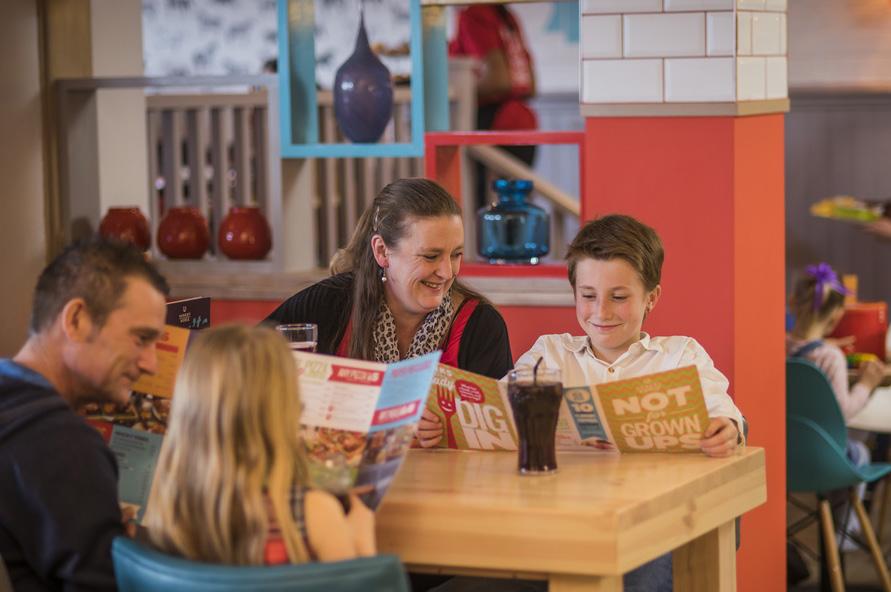
Its Untapping Potential report set out a range of commitments to apprenticeship programmes, a partnership with the Prince’s Trust to provide jobs for young people from disadvantaged backgrounds including targets for those from ethnic minorities, its Releasing Potential initiative for ex-offenders and those experiencing homelessness and supported internships for people with learning disabilities.
It is driving skills and long-term, structured long-term careers for people, wherever they live and whatever their background, often in places where there has traditionally been very limited opportunity.
Greene King offers additional support in two further ways, to people in the community who may feel left behind. It has partnered with Macmillan Cancer Support for the last 12 years as the charity’s number one employee-led fundraising corporate partner. This year alone it has raised £1m for Macmillan Cancer Support’s Emergency Grants Appeal to help people living with cancer manage unexpected or additional costs related to their diagnosis during the cost-ofliving crisis. Reflecting the companionship culture of a local pub, its No One Alone programme aims to combat the loneliness that can still be so prevalent in our digital world, as well as removing the stigma of talking about it.
Working with the Purpose Coalition on a Force for Good Impact Report to assess what it is doing to improve access to opportunity, Greene King is also exploring new ways to deliver social good to its communities and target its work even more effectively. It is also part of the Coalition’s cross-party efforts to help shape the levelling up agenda on issues like the Apprenticeship Levy, to ensure that it works better for businesses and helps the sector thrive. With its wide geographic reach – from city to town to village – it has the potential to make a significant difference across the country.
91 GREENE KING
Former Transport Secretary Rt Hon
Justine Greening joins Southeastern Railway as we celebrate International Women in Engineering Day
KENT-BORN TRAILBLAZER VERENA HOLMES
HONOURED WITH TRAIN NAMING ON INTERNATIONAL WOMEN IN ENGINEERING DAY AS SOUTHEASTERN LOOKS TO BOOST NUMBER OF WOMEN IN ENGINEERING ROLES
On International Women in Engineering Day 2023 Southeastern, the railway company serving Kent Sussex and Southeast London has honoured engineering trailblazer Kent-born Verena Holmes, the first woman to become an elected member of the Institute of Mechanical Engineers (IMechE). In marking International Women in Engineering Day, Southeastern wants to raise awareness of roles for women in engineering, traditionally a male-dominated field.
Verena a native of Ashford, Kent, was born on today’s date in 1889, with 23 June also being the date International Women in Engineering Day is marked each year.
The train being named after Verena Holmes is a Class 375 operating on Mainline routes between London, Kent and East Sussex, which was unveiled at a ceremony at London’s Cannon Street station. Verena Holmes’ family was represented by her great niece Caroline Yardley, and she was welcomed by Southeastern’s Managing Director, Steve White.
Verena was arguably the first female in the UK to have a full-time career as a professional mechanical engineer. She was also a strong advocate for women in engineering and was dedicated to the development of her fellow
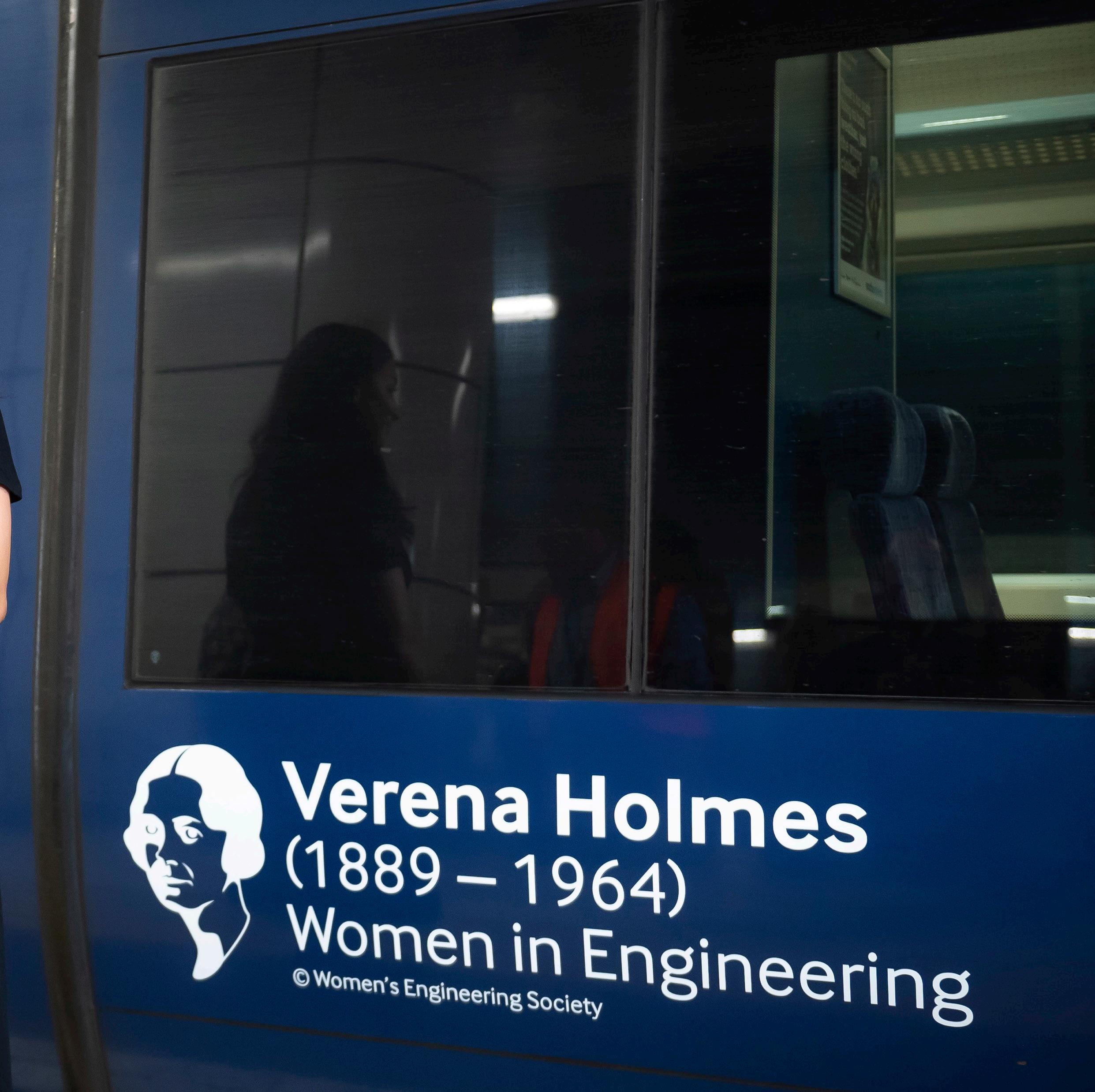
92
SOUTHEASTERN RAILWAY
female engineers. She set up her own all-female engineering firm in 1946 after working on naval weaponry during World War Two.
Steve White, Southeastern’s Managing Director, said:“Verena Holmes was born on our part of the railway, and she blazed a trail through a male-dominated world to deliver innovation, invention and inspiration in equal measure. We at Southeastern want to recognise that legacy and are proud to name a train in her honour.
“We want to build on Verena’s achievements by increasing the number of women we employ. Among our 4,500 or so colleagues, around 900 are women, and we have several programmes, like our apprentice scheme, to increase that number and breaking down misconceptions about careers in engineering. We want women to see rail as an industry where they can thrive on an equal footing. Our ambition is to increase the number of women we employ as engineers every year.”
Rt Hon Justine Greening, Chair of Purpose Coalition and former Secretary of State for Transport, said: “I’m delighted to join Steve White today to unveil this train, named in honour of Verena Winifred Holmes. She blazed a trail for women - in the workplace, in business and in the engineering sector.
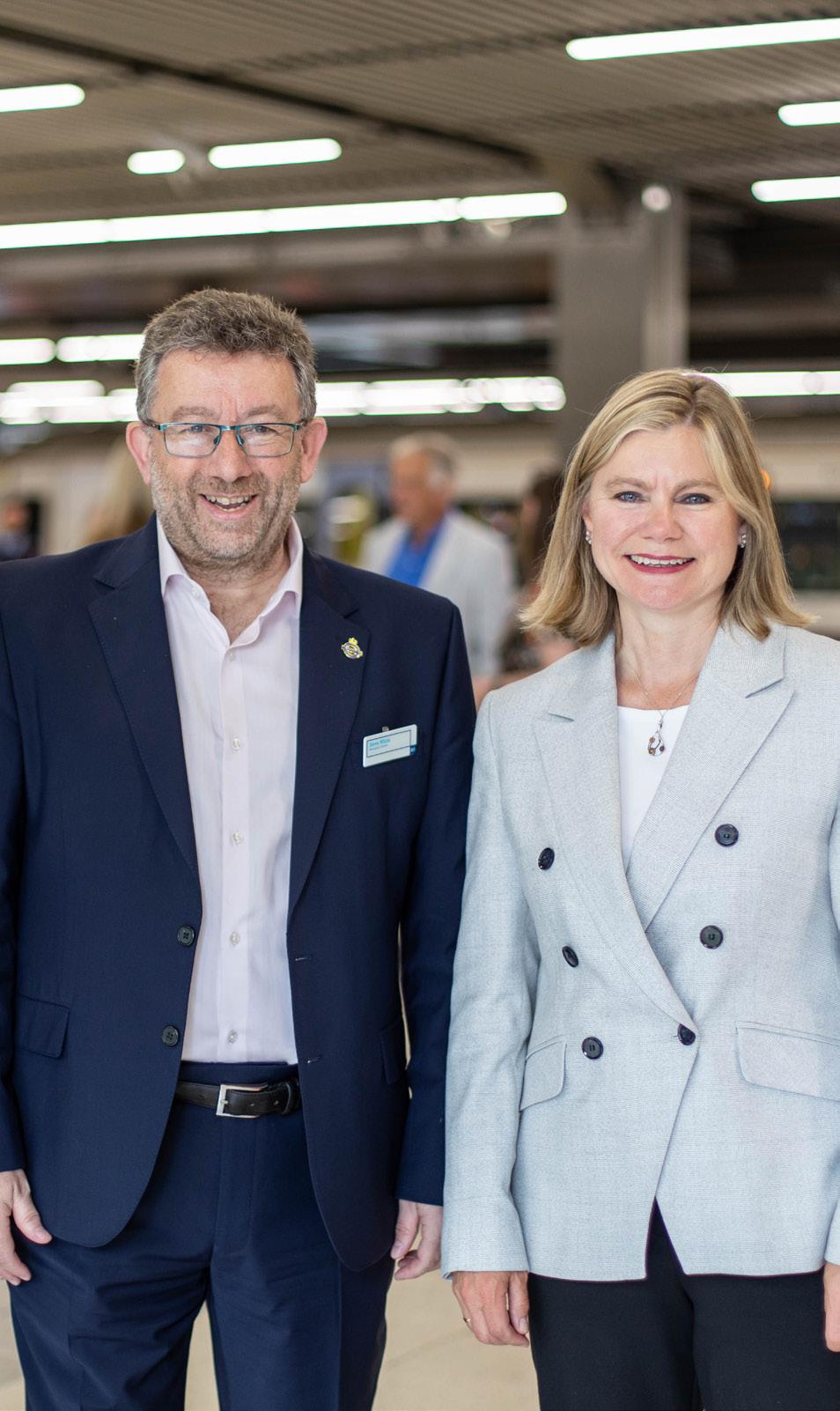
“So it’s very appropriate that Southeastern, a rail company that is delivering opportunity to the communities it serves, is holding this event to mark International Women in Engineering Day. It is committed to opening up a range of careers that were traditionally male-dominated, offering women the chance to acquire and improve green skills, whether they are at the start of their careers or want to retrain.
“The transport sector is vital for economic growth. Southeastern connects communities in Kent and Sussex as well as local businesses, including the tourist industry which is vital to the local economy. Our partnership has shown that, as part of our transport sector, it has the potential to drive longterm and sustainable change in the region.”
Southeastern Technical Services Engineer, Nada Abouelhiga also attended the ceremony, she said:
“Southeastern has supported me in my ambition to be taken seriously as a woman engineer and has valued my skills and the contribution I can make.
“We all follow in the footsteps of inspirational women like Verena Holmes, and she richly deserves this honour.”
93 SOUTHEASTERN RAILWAY
“
She blazed a trail through a male-dominated world to deliver innovation
Minister for Social Mobility Mims Davies MP joins Teleperformance to explore issues around the Menopause
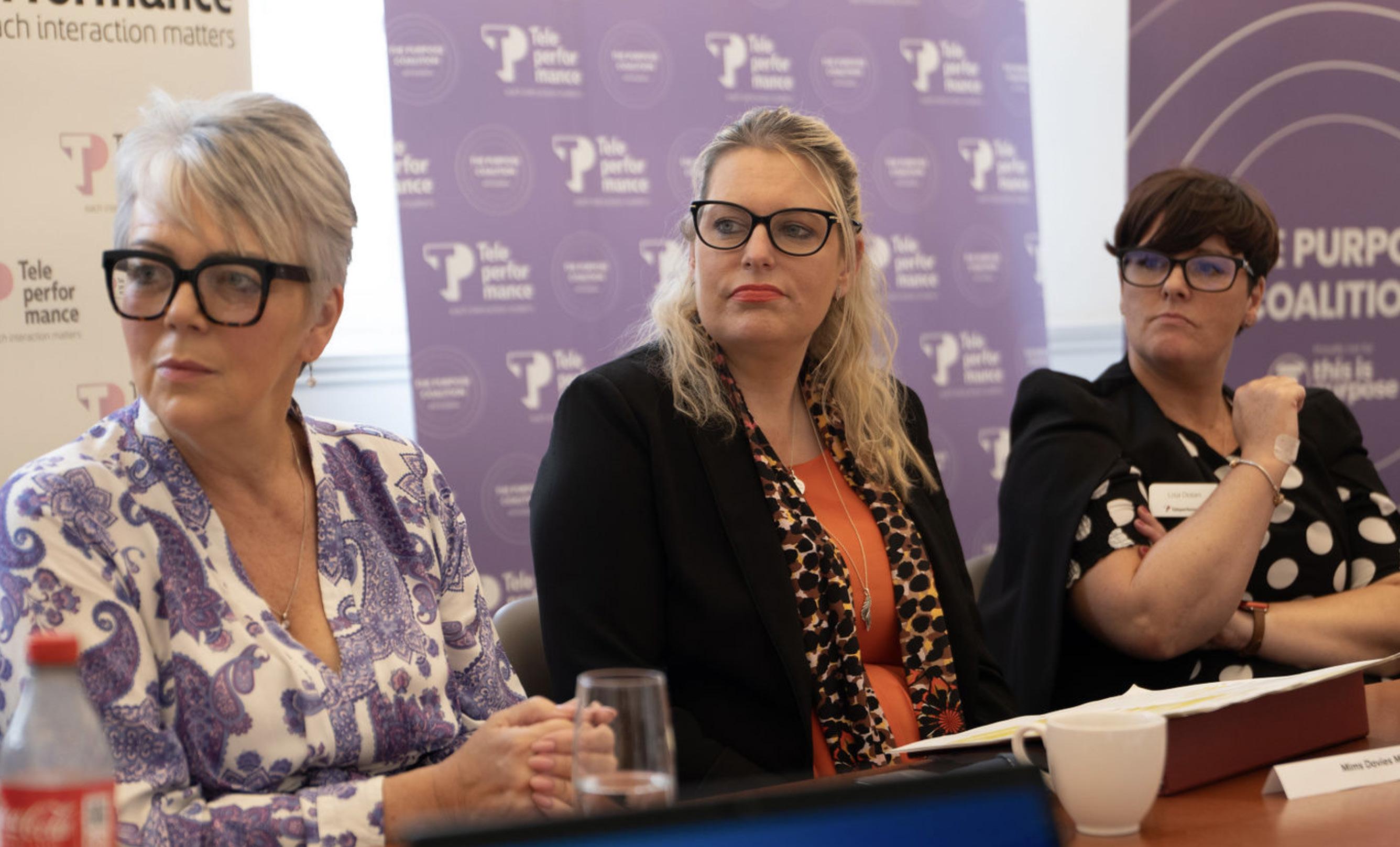
THE MINISTER FOR SOCIAL MOBILITY, YOUTH AND PROGRESSION AT THE DEPARTMENT FOR WORK AND PENSIONS, MIMS DAVIES MP, JOINED LEADING PURPOSE COALITION MEMBERS INCLUDING SODEXO, THE UNIVERSITY OF SOUTHAMPTON, ROLLS ROYCE AND LEONARDO FOR A ROUNDTABLE TO SHARE BEST PRIVATE-SECTOR PRACTICE WITH GOVERNMENT, AND DISCUSS YOUTH HUBS, IMPROVING OPPORTUNITIES FOR THOSE WITH KEY SKILLS, PRISON LEAVERS AND MORE.
The roundtable was led by Purpose Coalition Chair, the former Secretary of State for Education Rt Hon Justine Greening and provided an opportunity for an in-depth formal discussion around social mobility best practice, what works, and how the best ideas can be adopted by government on a national level.
The new position of Minister of Social Mobility, Youth and Progression was established by Prime Minister Rishi Sunak in October 2022, and the Minister carries responsibility for support for disadvantaged groups, childcare, the government’s youth offer and
cost of living support, alongside Women and the Menopause. Earlier this year, the Minister appointed Helen Tomlinson of leading Purpose Coalition Member Adecco as the government’s Menopause Employment Champion. The role aims to drive awareness of issues surrounding menopause and work while promoting the benefits for businesses and the economy when women are supported in the workplace.
The Coalition welcomed Rt Hon Chloe Smith MP, then Secretary of State for Science, Innovation and Technology to explore to explore solutions to get more people back into employment. Leading Coalition Members previously took part in a roundtable to discuss the changing world of work with Shadow Minister for the Future of Work, Justin Madders MP.
You can find out about all the Coalition’s events at fit-for-purpose.org/engage
94
TELEPERFORMANCE
Education without boundaries
Our vision is to be the best modern university in the UK, leading the way in student experience, impact-driven research and knowledge exchange that makes a difference in the modern world.
We proactively support our students to achieve their ambitions because of, rather than despite, their backgrounds.
We take pride in the diversity of our subject expertise and the lived experience of our students, staff and alumni, in London, Kent and via our international partners across the globe. Visit greenwich.ac.uk
Top 5 university in the UK for helping students from less well-off backgrounds into high-paid careers after graduation.
Which university degrees are best for intergenerational mobility? (2021), Institute for Fiscal Studies

95
Targets hit the mark for boardroom representation

AT A TIME WHEN THE UK IS HAVING TO TAKE A LONG HARD LOOK AT HOW TO GET ITS ECONOMY BACK ON TRACK, AND HOW IT DOES BUSINESS, ONE OF THE KEY FACTORS WILL BE ITS WORKFORCE. DOES IT INCLUDE ALL THE TALENT THAT IS AVAILABLE IN EVERY PART OF THE COUNTRY? DOES IT REFLECT THE COMMUNITIES IT IS OPERATING IN?
A workforce which ignores or dismisses talent because of its background, or lack of connections, won’t achieve its potential. That will be bad for the economy which will fail to thrive at just the time it most needs to succeed, with a cost-of-living crisis, the war in Ukraine and global insecurity all continuing to undermine stability and prosperity. It will also be bad for individuals who will miss out on opportunities that can change their lives for the better, alongside the financial, social and health benefits they bring.
So it makes sense to ensure that half the population – women – are properly represented at every level of the workforce. In particular, there is a need to improve their representation at the very top levels. That means that other women can see people like them running organisations, and be inspired by them. In turn, better diversity in business leads to more creative thinking and innovative solutions, and research shows that drives better business outcomes.
96
RT HON JUSTINE GREENING
The FTSE Women Leaders Review was set up in 2022 as an independent, voluntary and business-led initiative, supported by government, to increase female representation on FTSE 350 boards. It includes targets for FTSE 350 Leadership teams to be a minimum of 40% women by the end of 2025 and FTSE companies to have at least one woman as Chair or Senior Independent Director on the Board, and/or one woman in the Chief Executive or Finance Director role in the company, by the end of 2025.

The good news is that we’re three years ahead of target, with the Review reporting in February this year that the 40% target for women on the FTSE 350 boards had already been met in 2022. Business was also on track to meet the 40% Women in Leadership teams target by the end of 2025, with the UK’s 50 largest private companies all on course. The UK is leading the way globally with the latest data showing that 40.2% of FTSE 350 Board positions are now held by women, a really positive step forward.
Pennon, which provides drinking water and wastewater services to 3.5 million customers across the Great South West, was recognised as a leader in female board representation for the second year running with the best performance in the Utilities sector. 55.6% of its board members are women and it is one of the very few FTSE 250 companies which has both a female CEO, Susan Davy, and Chair, Gill Rider. For purpose-led businesses, driving a more effective performance on these indicators is key to levelling up the workforce. Pennon also reports annually on its gender pay, under the guidance of Chief People Officer, Adele Barker. In a week which saw the anniversary of the 1970 Equal Pay Act giving women the right
to equal pay in the workplace, the latest national figures show that the gender pay gap for women in their fifties is not set to close until 2025. There is clearly more work to be done, but reporting is essential to tracking and evaluating progress, and the best companies are leading the way.
It is also important that businesses drive progress from the bottom up. The utilities industry is a predominantly male one, so Pennon’s focus has been on the targeted recruitment of graduates and apprentices which has led to a high female recruitment rate. It engages with schools on STEM-focused initiatives to encourage more girls to take STEM subjects at school and university and to raise awareness of the career opportunities that can open up. It also operates female mentorship programmes for middle and senior managers to help develop a broader pipeline of talent at all levels of the business. It is also important that support and new ways of working are available to those with caring responsibilities.
It is crucial that businesses across the country, especially those in disadvantaged areas, continue to strive to meet these targets for increased representation at senior levels but also to continue to set themselves a range of targets to attract and retain a more representative workforce at every level.
97 RT HON JUSTINE GREENING
The 40% target for women on the FTSE 350 boards had already been met
“
Building solutions for social change: Tarmac launches its Levelling Up Impact Report

TARMAC, THE UK’S LEADING SUSTAINABLE CONSTRUCTION MATERIALS AND SOLUTIONS BUSINESS, LAUNCHED ITS LEVELLING UP IMPACT REPORT, IN PARTNERSHIP WITH THE PURPOSE COALITION. THE REPORT WAS LAUNCHED AT NEXT GEN 2030+, AN EVENT HOSTED BY TARMAC TO DISCUSS BUSINESS SOLUTIONS TO CLIMATE CHANGE IN THE CONSTRUCTION INDUSTRY. TARMAC IS THE FIRST ORGANISATION IN THE MATERIALS OR CONSTRUCTION SECTOR TO PUBLISH A LEVELLING UP IMPACT REPORT.
As part of CRH, the leading provider of building materials solutions that build, connect and improve our world, Tarmac employs around 6,000 people across over 350 sites in the UK, providing vital infrastructure, services and products. Its work ranges playing a key role in some of the most high-profile construction and infrastructure projects in the UK including HS2, Wembley Stadium, Heathrow Terminal 5, The Shard, Silverstone Resurfacing and the London 2012 Olympics, to consumer building products and solutions.
The Impact Report highlights the areas where Tarmac is delivering significant social impact, using the architecture of the Purpose Goals. Created by the Purpose Coalition, the 14 goals cover key life stages as well as the barriers that can prevent people from accessing opportunity. They also help to identify the gaps where organisations can extend their work to provide support where it is most needed.
The Impact Report recommends ways that Tarmac can further build on the work it is already doing to promote opportunity. They include sharing its best practice more widely with others in the sector and in its supply chain, the development of a strategic employment pipeline delivering social value, making further progress on gender equality including in its top pay bands, introducing socio-economic measurement and tracking and evolving employee support to address cost-of-living challenges and the development of digital skills.
Tarmac’s Act sustainability strategy is incorporated into all aspects of its work. The Act strategy focuses on three pillars – people, planet and solutions –which support levelling up and harnessing the energy
98 TARMAC
transition in its journey to net zero. As a result of the strength and breadth of its operations, Tarmac is already successfully meeting many of the Purpose Goals, particularly in its efforts to attract and retain talent from every part of the communities it serves.
Highlights include:
Outreach work with schools and local stakeholders focuses on those without contact networks, using an anonymised and inclusive recruitment process with staff trained in unconscious bias;
Early Years Support Plan recruits early career entrants, often from low socio-economic backgrounds, and continues to support them with mentors and learning programmes;
An apprenticeship scheme which currently employs nearly 300 apprentices, supporting those who lack specific qualifications or necessary soft skills;
Comprehensive employee journey and development plan, offering targeted schemes and courses through its Leadership Academy and the chance to work on small projects to identify and progress ideas to help the business and its customers through its Employee Development Programme;.
Research and development to ensure that the materials and processes it uses are sustainable, also supporting its supply chain partners to net zero, with an Innovation Challenge to find better ways of doing things.
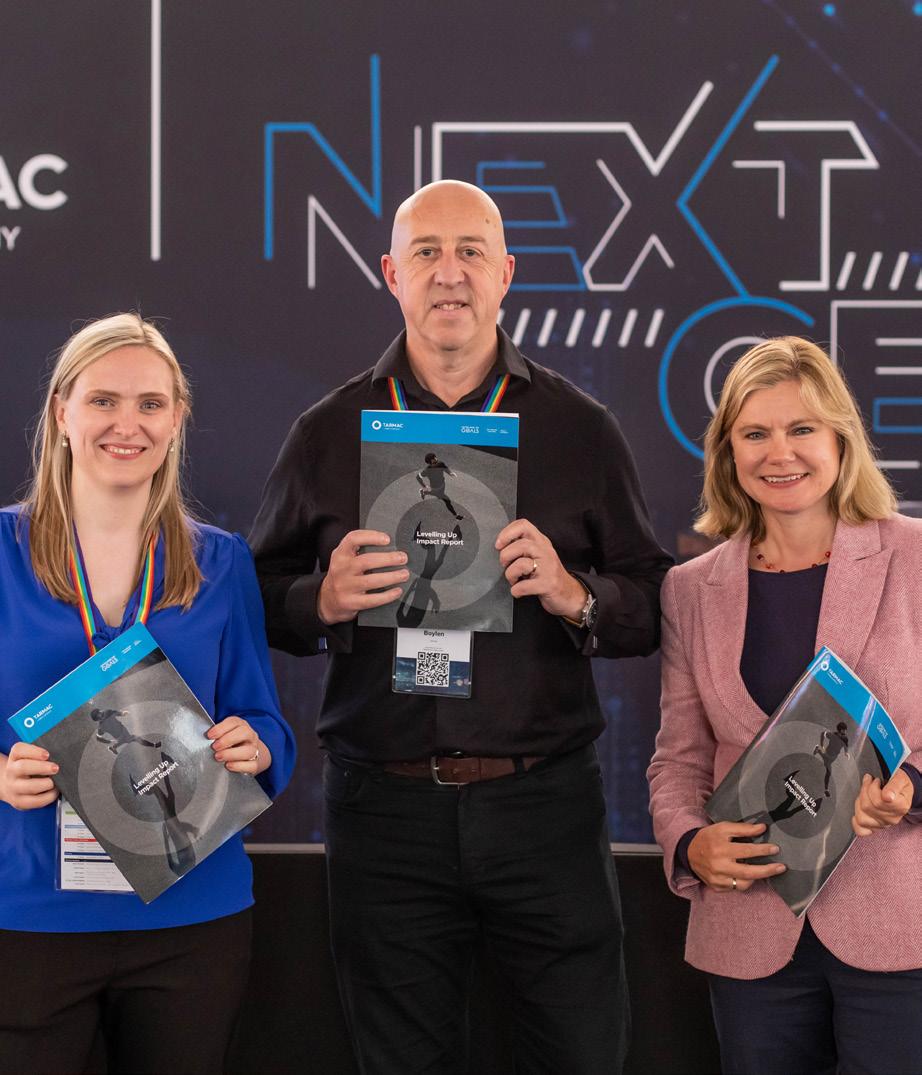
Chair of the Purpose Coalition and former Education and Transport Secretary, Rt Hon Justine Greening, said:
“Tarmac has a huge reach across the country. That means it also has huge potential to deliver purposeful impact on the communities where it operates, not just in terms of the company itself but extending that to its supply chain and to the local projects it supports. As a people-focused anchor institution, it has the capacity to create a pipeline of talent that starts with its outreach in schools and continues with its nurturing of employees, demonstrating that a large business can produce social value through employee engagement and development programmes. Its willingness to ensure that it recruits from every part of the community and to measure and evaluate its progress means that opportunity is spread much more widely.
“I am delighted to take part in today’s event which is another example of Tarmac’s willingness to develop collaborative and workable solutions to the challenges the construction sector is facing. Its people-centric approach is balanced with its planet-focused strategy, using the very best of its research to ensure sustainability and the achievement of net zero within its own organisation and that of its supply chain. I’m looking forward to continuing to work in partnership with them to promote meaningful social impact.”
Graeme Boylen, HR director - Europe West at Tarmac’s parent company, CRH,said:
“We’re incredibly proud of the work we’ve done so far on delivering tangible social impact, and that it’s been recognised today by the Purpose Coalition. In particular, we welcomed the findings about the work Tarmac is doing in schools, through our apprenticeships and our engagement with both our staff and the communities we operate in.
“We’ve found this a really valuable process and, as the first in the sector to publish its Levelling Up Impact Report, we hope that we can encourage other parts of the construction industry to take part. However, we recognise that we can go even further, and plan to take action on the recommendations in today’s report to create even more opportunities, build communities and continue our journey to net zero.”
99 TARMAC



100 0800 590 830 staffs.ac.uk/clearing SECURE YOUR PLACE FOR SEPTEMBER EDUCATION # StaffsUni Clearing
Deep dive into the labour market to fix skills shortage
NEW RESEARCH HAS THROWN THE IMPACT OF THE SKILLS SHORTAGE IN THE UK INTO SHARP RELIEF.
The report by the Open University and the British Chambers of Commerce, based on a survey of over 1300 organisations of all sizes from the public, private and third sectors, looks at skill shortages, recruitment challenges and the effect of flexible working on skills availability. It also examines how employers are responding through business planning and employee training.
The research reveals that almost 86 per cent of large organisations currently face skills shortages, with nine in ten implementing a formal plan to address them. In contrast, 68 per cent of SMEs face similar shortages but are struggling to introduce a response to tackle the problem. Seventy-eight per cent of all organisations are seeing reduced output, profitability or growth as a result. Seventy-two per cent say the impact of skills shortages is causing increased workloads for other staff, with 28 per cent of businesses reporting that they have had to turn down work or are not able to bid for it due to staff shortages. Despite three out of four companies being affected by a shortage of skilled workers, over half the organisations surveyed said they do not have any specific initiatives, skills programmes or workplace adjustments in place to attract underrepresented groups such as people with disabilities or workers from diverse ethnicities.

It’s a bleak picture, and a situation which has its roots in the twin seismic shocks of the twenty-first centuryBrexit and Covid. The 2016 referendum ended freedom of movement of labour within the EU with little prospect of a reversal in policy anytime soon. The spectre of Covid continues to haunt the UK labour market, with a huge rise in the number of economically inactive people since the pandemic - those not in work or not seeking it - with retirement and long-term ill-health both cited as drivers. A survey by employment group, Manpower, earlier this year reported that the number of employers reporting skills shortages has increased six-fold over the last decade, and more than doubled since pre-Brexit and the pandemic.
That increase underlines why the private sector, alongside the third sector and government, needs to take a new approach to addressing skill shortages and explore how it can find talent in economically active groups which have previously been hard to reach. From our partnerships in the Purpose Business Coalition, it’s clear that many companies already understand the problem and are getting to grips with it, mining talent from as wide a pool as possible, with a particular focus on underrepresented groups. They’re following the old adage that you should never let a crisis go to waste and are creating opportunities out of this particular labour market emergency, mining every potential source of talent to find innovative ways to work with individuals who may have fallen out of the labour market because of Covid, or whose potential has never been tapped. The current employment rate of disabled people, for example, is 53.7% compared to 82.7% for people who are not disabled, a gap which has singularly failed to close significantly over the last decade.
Business Coalition members work upstream in their communities, engaging in outreach with local schools and colleges in their communities to inspire and inform those who don’t have a contact network, or family experience of work to draw on. There is a concerted focus on recruiting those who may not have conventional academic backgrounds or who come from groups facing particular challenges such as care leavers, those leaving prison or former members of the armed forces. Apprenticeship programmes are an important route into work and many businesses are actively encouraging more women to apply for traditionally male-dominated roles, as well as older workers whose personal circumstances may have prevented them from considering that option earlier in life.
It’s clear from the study that SMEs face particular challenges in terms of operational ability and financial resilience. The Purpose Business Coalition has been working with SME4Labour to look at the vital role that they play in our national and local economies and the opportunities they can deliver. Its report, recently launched by Bill Esterson MP, Shadow Minister for Business and Industry, featured examples of best practice from Business Coalition partners together with independent recommendations to put SMEs at the heart of the business agenda and to ensure they are more effectively supported.
The period ahead is key. On all sides, we need a more proactive response to finding solutions to the skills shortage. The best businesses and third sector organisations are determined to rise to that challenge. The big question is whether the state has the appetite for innovation and the willingness to invest up front to reap the rewards of a more productive economy.
101
LORD WALNEY 101
Diversity celebrations and wellbeing activities across Calderdale and Huddersfield NHS Foundation Trust
LIAM WHITEHEAD, HEAD OF APPRENTICESHIPS & WIDENING PARTICIPATIO AT CALDERDALE AND HUDDERSFIELD TALKS TO US ABOUT THE TRUSTS DIVERSITY AND INCLUSION INITIATIVES
WINDRUSH
On 22nd June, we raised the Windrush flag at HRI and CRH. We had over 40 colleagues in attendance to show their support, say a few words and be a part of the ceremony.
At HRI, we had Brendan Brown and Denise Sterling to open the event and say a few words to commemorate the flag raising. Rev Orlando Brown said a touching prayer and a gospel singer (Isaac) sang a number of moving gospel songs.
The Windrush group, attended CRH after, to raise the flag and Denise saying a few words. In preparation for the Windrush event, both canteens at CRH and HRI prepared a Windrush inspired menu and the canteen area was decorated. Vouchers were given out to colleagues who attended and supported the event to try the delicious Windrush menu. All together we had 90 colleagues who either supported or attended the event across CHFT.
ARMED FORCES DAY
RAFA (The Royal Air Forces Association) attended HRI for two days, to hold an information and fundraising stall. This was in conjunction with the Kirklees Mayor announcing our very own CHFT Charity and RAFA as part of their two chosen charity teams.
We raised the Armed Forces flag on Friday 23nd alongside RAFA, community and supporting colleagues. Rob Birkett – Managing Director Digital Health and also an Armed Forces reservist said a few words before the flag raising, to capture the moment. There were lots of colleagues and volunteers in attendance
VOLUNTEERS WEEK:
2023 marks the 39th year of Volunteers’ Week (1-7 June), when CHFT joined thousands of charities and voluntary organisations recognising the contribution volunteers make across the UK.
With this year’s theme of ‘Celebrate and Inspire’ the aim is to encourage people to be the change that we want to see and get involved in volunteering in whatever way works for them, this includes internal staff signing up to CHFT’s internal Care Club volunteering offer which supports colleagues personal development as well as colleagues at particularly busier times throughout the year.
The contribution of volunteers is often unseen and unrecognised by many, visible only through the incredible impact of their volunteering, so the team took some time during Volunteers’ Week to celebrate their efforts and all they contribute to CHFT.
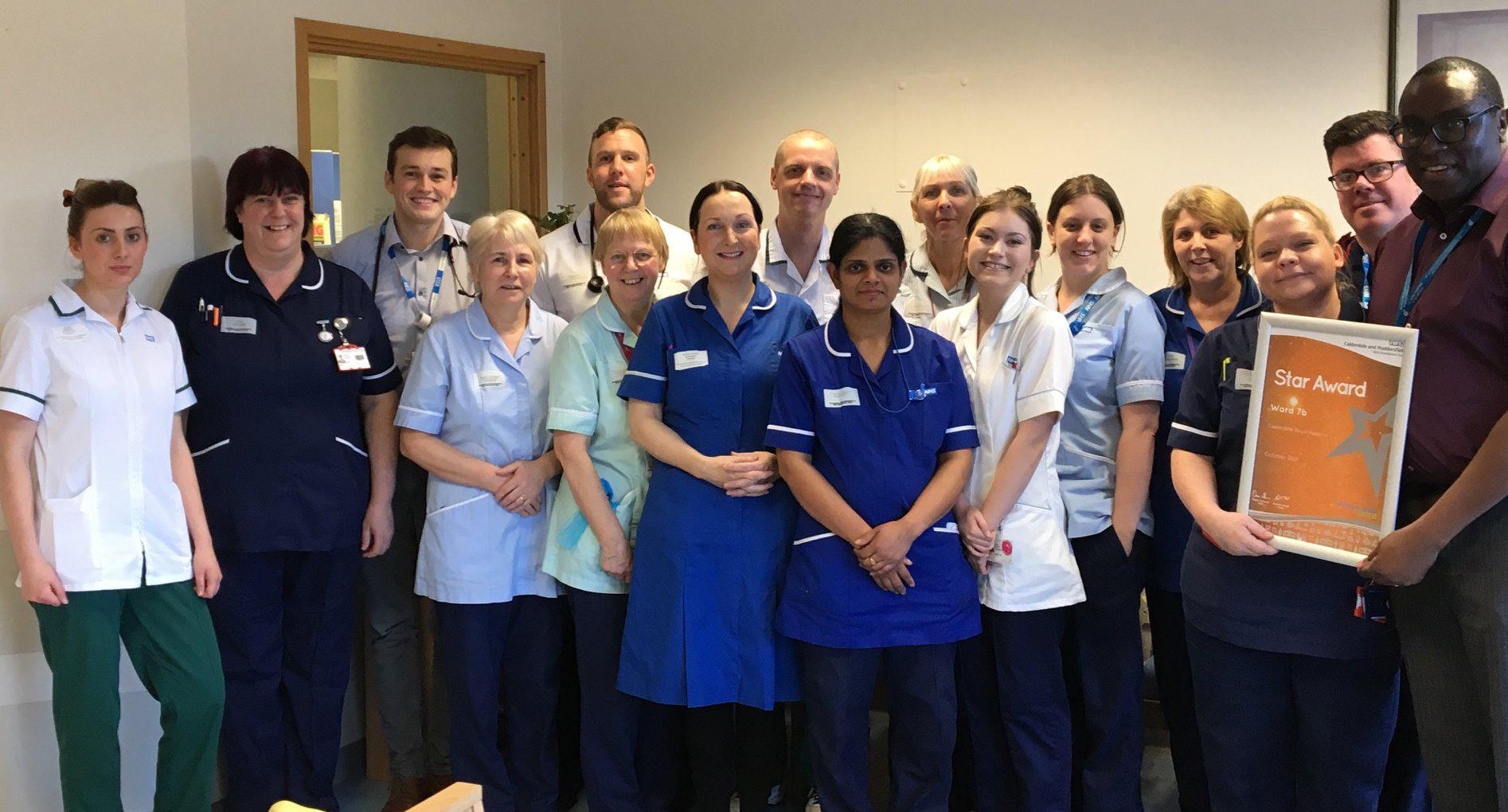
102
CALDERDALE AND HUDDERSFIELD NHS FOUNDATION TRUST
With a backdrop of a challenging winter ahead, and already difficult recruitment and retention conditions, it's time to remind people, from those looking for a career to those considering a change, that their local NHS is not all doom and gloom. Yes there are immense challenges and we face those head on and honestly; but working for your local NHS Trust, in both clinical and non clinical roles is genuinely one of the best and most exciting places to work and learn as you build your career.
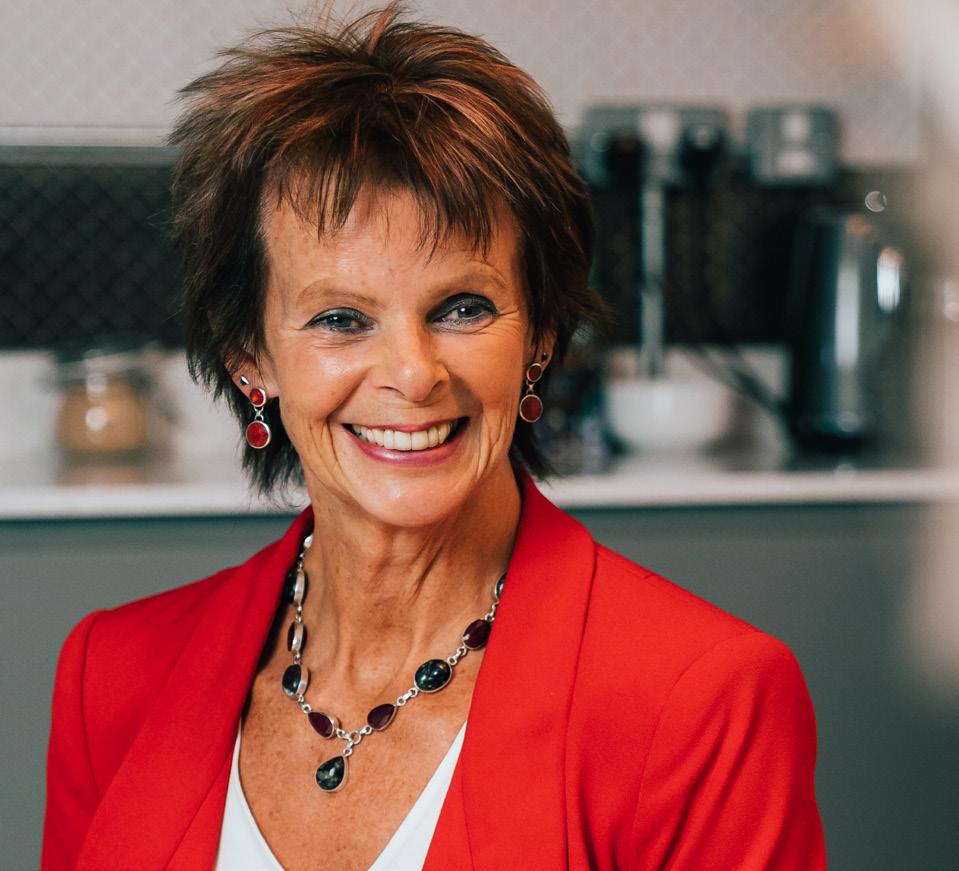 Rt Hon Anne Milton, Former Nurse
Rt Hon Anne Milton, Former Nurse
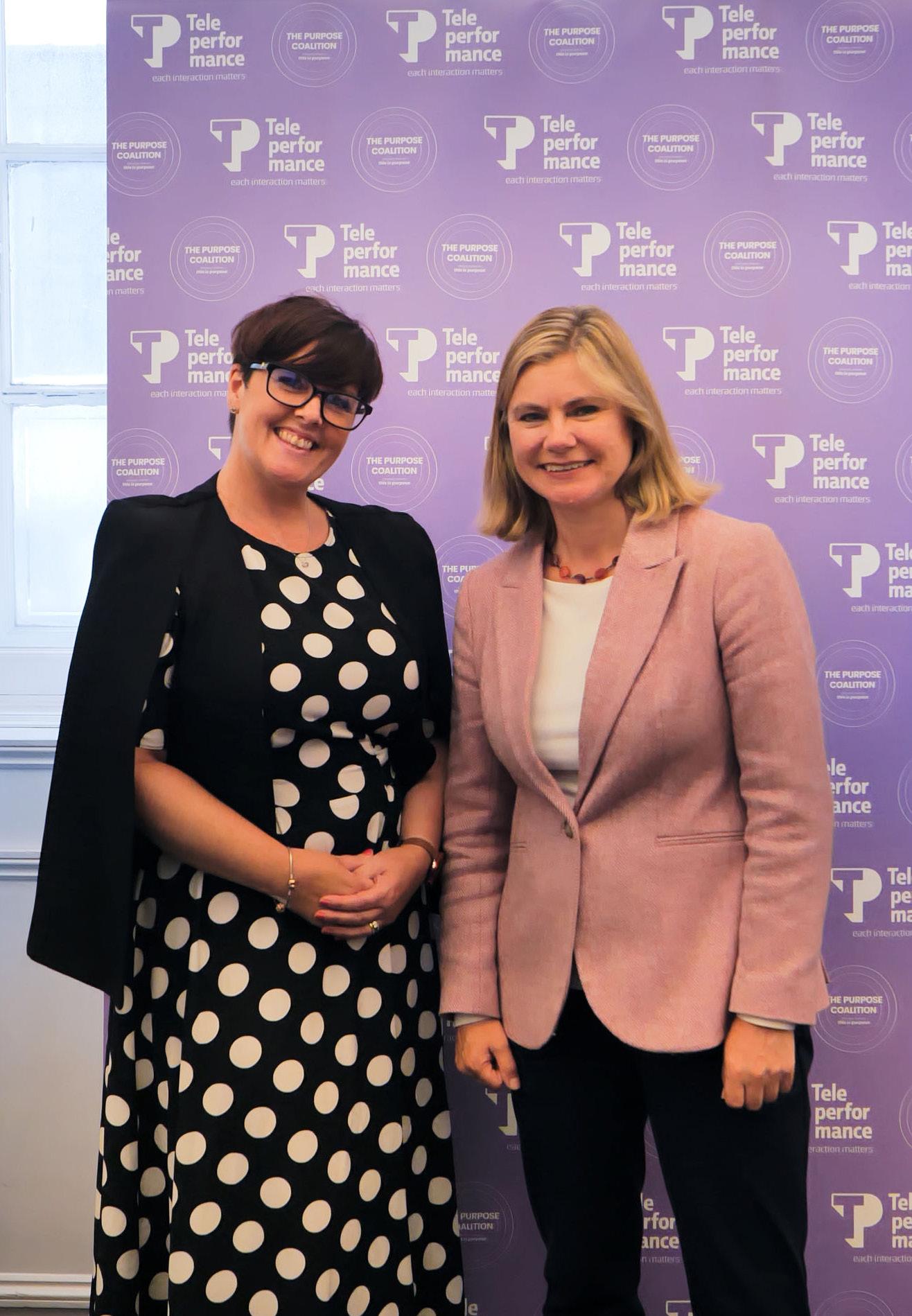

FIT FOR LEVELLING UP
to partner on the Purpose Goals
Proud
PICTURED: LISA DOLAN, VP OF PEOPLE OPERATIONS AT TELEPERFORMANCE AND RT HON JUSTINE GREENING, CHAIR OF THE PURPOSE COALITION


































































































































 Rt Hon Anne Milton, Former Nurse
Rt Hon Anne Milton, Former Nurse

